
How to Write a Book Review: The Complete Guide
by Sue Weems | 23 comments
If you've ever loved (or hated) a book, you may have been tempted to review it. Here's a complete guide to how to write a book review, so you can share your literary adventures with other readers more often!
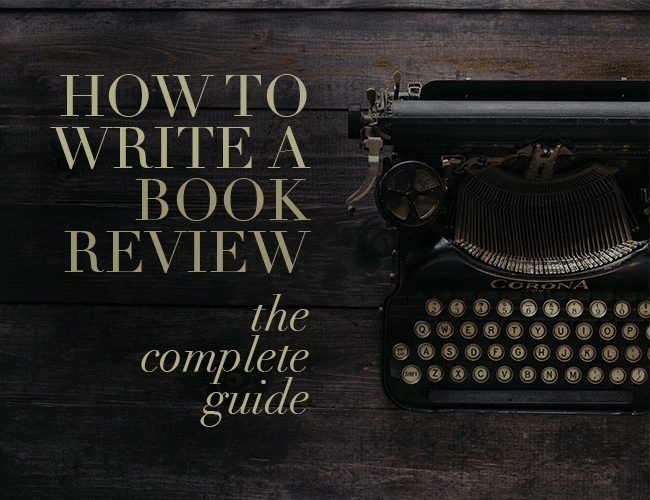
You finally reach the last page of a book that kept you up all night and close it with the afterglow of satisfaction and a tinge of regret that it’s over. If you enjoyed the book enough to stay up reading it way past your bedtime, consider writing a review. It is one of the best gifts you can give an author.
Regardless of how much you know about how to write a book review, the author will appreciate hearing how their words touched you.
But as you face the five shaded stars and empty box, a blank mind strikes. What do I say? I mean, is this a book really deserving of five stars? How did it compare to Dostoevsky or Angelou or Dickens?
Maybe there’s an easier way to write a book review.
Want to learn how to write a book from start to finish? Check out How to Write a Book: The Complete Guide .
The Fallacy of Book Reviews
Once you’ve decided to give a review, you are faced with the task of deciding how many stars to give a book.
When I first started writing book reviews, I made the mistake of trying to compare a book to ALL BOOKS OF ALL TIME. (Sorry for the all caps, but that’s how it felt, like a James Earl Jones voice was asking me where to put this book in the queue of all books.)
Other readers find themselves comparing new titles to their favorite books. It's a natural comparison. But is it fair?
This is honestly why I didn’t give reviews of books for a long time. How can I compare a modern romance or historical fiction war novel with Dostoevsky? I can’t, and I shouldn’t.
I realized my mistake one day as I was watching (of all things) a dog show. In the final round, they trotted out dogs of all shapes, colors, and sizes. I thought, “How can a Yorkshire Terrier compete with a Basset Hound?” As if he'd read my mind, the announcer explained that each is judged by the standards for its breed.
This was my “Aha!” moment. I have to take a book on its own terms. The question is not, “How does this book compare to all books I’ve read?” but “How well did this book deliver what it promised for the intended audience?”
A review is going to reflect my personal experience with the book, but I can help potential readers by taking a minute to consider what the author intended. Let me explain what I mean.
How to Write a Book Review: Consider a Book’s Promise
A book makes a promise with its cover, blurb, and first pages. It begins to set expectations the minute a reader views the thumbnail or cover. Those things indicate the genre, tone, and likely the major themes.
If a book cover includes a lip-locked couple in flowing linen on a beach, and I open to the first page to read about a pimpled vampire in a trench coat speaking like Mr. Knightly about his plan for revenge on the entire human race, there’s been a breach of contract before I even get to page two. These are the books we put down immediately (unless a mixed-message beachy cover combined with an Austen vampire story is your thing).
But what if the cover, blurb, and first pages are cohesive and perk our interest enough to keep reading? Then we have to think about what the book has promised us, which revolves around one key idea: What is the core story question and how well is it resolved?
Sometimes genre expectations help us answer this question: a romance will end with a couple who finds their way, a murder mystery ends with a solved case, a thriller’s protagonist beats the clock and saves the country or planet.
The stories we love most do those expected things in a fresh or surprising way with characters we root for from the first page. Even (and especially!) when a book doesn’t fit neatly in a genre category, we need to consider what the book promises on those first pages and decide how well it succeeds on the terms it sets for itself.
When I Don’t Know What to Write
About a month ago, I realized I was overthinking how to write a book review. Here at the Write Practice we have a longstanding tradition of giving critiques using the Oreo method : point out something that was a strength, then something we wondered about or that confused us, followed by another positive.
We can use this same structure to write a simple review when we finish books. Consider this book review format:
[Book Title] by [book author] is about ___[plot summary in a sentence—no spoilers!]___. I chose this book based on ________. I really enjoyed ________. I wondered how ___________. Anyone who likes ____ will love this book.
Following this basic template can help you write an honest review about most any book, and it will give the author or publisher good information about what worked (and possibly what didn’t). You might write about the characters, the conflict, the setting, or anything else that captured you and kept you reading.
As an added bonus, you will be a stronger reader when you are able to express why you enjoyed parts of a book (just like when you critique!). After you complete a few, you’ll find it gets easier, and you won’t need the template anymore.
What if I Didn’t Like It?
Like professional book reviewers, you will have to make the call about when to leave a negative review. If I can’t give a book at least three stars, I usually don’t review it. Why? If I don’t like a book after a couple chapters, I put it down. I don’t review anything that I haven’t read the entire book.
Also, it may be that I’m not the target audience. The book might be well-written and well-reviewed with a great cover, and it just doesn’t capture me. Or maybe it's a book that just isn't hitting me right now for reasons that have nothing to do with the book and everything to do with my own reading life and needs. Every book is not meant for every reader.
If a book kept me reading all the way to the end and I didn’t like the ending? I would probably still review it, since there had to be enough good things going on to keep me reading to the end. I might mention in my review that the ending was less satisfying than I hoped, but I would still end with a positive.
How to Write a Book Review: Your Turn
As writers, we know how difficult it is to put down the words day after day. We are typically voracious readers. Let’s send some love back out to our fellow writers this week and review the most recent title we enjoyed.
What was the last book you read or reviewed? Do you ever find it hard to review a book? Share in the comments .
Now it's your turn. Think of the last book you read. Then, take fifteen minutes to write a review of it based on the template above. When you're done, share your review in the Pro Practice Workshop . For bonus points, post it on the book's page on Amazon and Goodreads, too!
Don't forget to leave feedback for your fellow writers! What new reads will you discover in the comments?
Sue Weems is a writer, teacher, and traveler with an advanced degree in (mostly fictional) revenge. When she’s not rationalizing her love for parentheses (and dramatic asides), she follows a sailor around the globe with their four children, two dogs, and an impossibly tall stack of books to read. You can read more of her writing tips on her website .
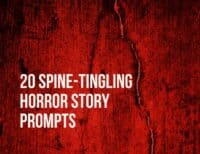
23 Comments
The Ice Dragon by George R.R. Martin is about a girl that shows no emotion befriending a ice dragon.
I chose this book based on the cover that had a little girl riding a ice dragon, and wondered what is about.
I really enjoyed the interaction the little girl had with the dragon.
I wondered how how the girl’s bond with the dragon.
Anyone who likes a coming of age story set in a fantasy will love this book.
Thanks for sharing your practice, Azure!
You’re welcome.
A interesting, at times perplexing, subject! And one on my mind lately,as I’ve agreed to do a few. I do enjoy giving reviews and am delighted when I can say, “This was a great book!” Or even, “I enjoyed this book.” It gets perplexing when I agree to review a book — and simply don’t like it. Then what to say? I hate to disappoint the writer but I’ve promised to give my honest opinion.
I’ve found some books mediocre and yet I see a dozen other reviewers saying “A great story!” Tastes do vary. But when there are obvious flaws I tend to skip all the best-friend-and-cousin reviewers and find the first person who says, “This writer has a problem with…” Usually there’ll be a number of reviewers who spot the same problems I do.
I like upbeat main characters, but not aggressive, belligerent, and/or self-centered ones. I like to meet in a story the kind of people I’d like to meet in real life— not people I’d avoid if possible. I recently read a book where the main character came across as insipid and the story only mildly interesting. Other reviewers said it was great and I know for this specific audience — readers who want a certain slant to a story — it was quite suitable. So I tried to cut the book some slack. Everyone has their limit as to how much blood and gore, smooching and snuggling, they are willing to read about.
Once I agreed to review a book and would have tossed it after the first chapter — for several reasons. A lot of “writer inserting facts for reader’s benefit”; teach/preach paragraphs; excess of description; attitudes of MCs. Once it’s live on seller’s sites like Amazon, what can you say? The one thing good it had going for it was the story line or theme. With a pro editor’s help it could have been a great story.
As for a review, one book I read lately was “A Clue for the Puzzle Lady” by Parnell Hall. It’s one of those “Stayed up half the night to finish it” books; I think anyone who likes a compelling cozy mystery would probably like it. Downside: I didn’t care for the “Puzzle Lady.” She’s a lush, hangs out at the bar getting sloshed. The upside: her sensible niece has a starring role —trying to keep her aunt on the straight-and-narrow and the mystery keeps you guessing until the end.
Christine, Thanks for sharing your insight! It sounds like you are approached often to review new books. It does make it tricky if it’s a request, especially outside your own preferences. Thanks for chiming in about your process, as I’m sure others will appreciate the perspective too. I’ll have to take a look at the Puzzle Lady– I do enjoy cozy mysteries. Sue
Here’s another cozy mystery book review in case you’re interested. I’m not approached by writers that often, but there are the Story Cartel, Book Bub and Goodreads, all sites where authors ask for review volunteers.
Reel Estate Ripoff by Renee Pawlish
The detective Reed Ferguson is a fan of Humphry Bogart, movie memorabilia of that era, and fancies himself a bit of a Sam Slade. Though not your super-sleuth, rather inept at times, he’s a likeable character. Told in first person, the story has a Philip Marlowe tone to it, but much tamer. Dialogue and story line are well done, the story well plotted and believable. I’d gladly read more stories about this particular gumshoe.
If you like cozy mystery books, I’ll send you a list later, Sue. Love them too and I’ve met many authors who write in this genre. Back on topic– you inspire me again to add some reviews to my Blog. I have been reading and writing many middle grade mysteries for a project! My latest favorite: “The World’s Greatest Detective” by Caroline Carson (who I hope to meet tomorrow in Arlington, VA!) My 12 year old grandson borrowed it and finished it before I could. “It’s the best mystery I ever read, Grandma! You’ ll never guess the ending with unpredictable twists!” What better review could we read. The target audience and I both highly recommend this 2017 mystery.
Adding it to my stack, Beth. Thanks!
Not wanting to sound life an idiot, but willing to risk it here among friends: What exactly is a cozy mystery?
Glad you asked! It’s a subgenre of mystery. The best examples of cozy mysteries are those by Agatha Christie. They usually avoid profanity, excessive gore/ violence, and sex. They focus more on the puzzle, sleuth, and their smaller world. Hope that helps!
Thanks, Sue.
Wonderful article. The first I have read by you. It especially gets those of us who don’t feel we have the formula down for review writing to be introduced to a form we can build upon with experience. You’ve kept it simple but you have given us the main ingredients needed for a good review. I printed this one off to look at the next few times I write reviews. Thank you.
Glad you found it helpful. Thanks for reading and commenting!
I haven’t gone into all this. It’s a matter of time, Joe. I gad about all over the place, not knowing where I am or where I’m going. Within weeks, I’ll be 87. I’ve books of my own that I’d like to see reviewed. Even sorting them out, however, even finding where any of them are, would be a time burden. You see the fix?
Hi Dave, You aren’t alone in feeling the press of time for getting your stories out into the world. May I gently offer this: start with finding and sorting one. If you can’t find it, write it anew. You’ve probably grown in time and perspective since you wrote the first draft, which will make for a stronger story. Good luck. I’m cheering you on!
This is an article for me, because I am happy to receive a rating. I haven’t sold many books. But, at least some thinks that it was worth the time to read. That was refreshing. And, I think I wrote two reviews, so far. It was on Amazon.com. Thank you.
You’re welcome!
Hi, Sue. Thanks for the helpful advice. I did a review on Amazon for the first of a 7-part thriller titled ‘Mosh Pit (The Rose Garden Incident)’ by Michael Hiebert. [Here it is.]
“5.0 out of 5 stars Advance copy review. By A fellow author on September 18, 2016 Format: Kindle Edition I Recommend This Book Strongly
I enjoyed reading this first part of the thriller. The author’s opening chapter/prologue was fast paced, and set me in the middle of the inciting incident along with two of the main characters. After that thrilling opening, I felt the ensuing chapters moved at a more leisurely pace, and was about to grade them as less praiseworthy when I watched a lecture by Brandon Sanderson on YouTube about building three dimensional characters and realised Michael Hiebert had done exactly that by introducing the reader to the minutiae of other characters who had parts to play in the development of the story. So, instead of cardboard cutouts of bland stock characters, the author shows us real people with real concerns that the reader can relate to.and actually care about. I look forward to reading the rest of this intriguing thriller, and highly recommend it to all lovers of well-written, and well-crafted thrillers.”
I also reviewed Part 2 of the series, but that review is too long to post here.
Footnote: The author, Michael Hiebert, was so pleased with my reviews, he recently asked me to beta-read a short story collection he plans to publish in November.
Great review, John! I like how you shared a bit of your process as a reader too, in recognizing what the writer was doing with their characterization. Thanks!
Thank you, Sue.
Five out of five stars When I picked up a copy of “The Girl with All the Gifts,” by M R Carey, at the used book store, I somehow had it in my head that it was a YA dystopian novel along the lines of “Divergent” or “The Hunger Games.” While I would definitely say that I was not right about that, I wouldn’t say that I was completely wrong. I was, however, completely unprepared for a zombie novel–which is a good thing, cause I wouldn’t have read it, and I’m glad I did. Think “The Walking Dead” meets (why do I want to say ‘The Curious Incident of the Dog in the Night”?) “Peter Pan.” I really enjoyed seeing things from, the main character, Melanie’s point of view. Her limited knowledge of her own situation was intriguing, to say the least (and probably why I thought of “The Curious Incident”). I was a bit disappointed when the POV changed to another character’s, but, as the novel progressed, I found myself sympathizing with nearly all the characters–with one exception, and I’ll leave that for you to ponder when you read it. I wondered how much of the science was real, but not enough for me to research it myself. Although, based on other reviews, I guess most of the science about the fungus is real. I also wondered about the fate of the remaining ‘lost boys’ of the cities. If you liked…. well, I don’t know. I’m not typically a fan of things zombie, so I don’t have a comparison, but the book was somewhat similar to “Divergent” and “The Hunger Games” in that the main character goes through a hellluva time and comes out the other side with a plan for her future.
“Tuesdays with Morrie” by Mitch Albom is a true story about how one man found meaning in life when his doctors gave him a death sentence. Morrie was a college professor who passed on his new found wisdom in the last year of his life to a favorite student, the author, who chronicled his professor’s perspectives on death and dying.
I chose this book because of its philosophical topic, and because it is so well written that the words just jump off the page.
Knowing we are all mortal beings, I especially liked the insights, the tidbits of wisdom imparted by the dying man. Death is a subject that few, if any of us, ever talk about seriously with friends and family. The subject of death is verboten. We deny its existence. And, if we are religious, we pretend we will not really die, but we deceive ourselves and think we will live on in some afterlife existence for all eternity. But the professor, Morrie, learns some valuable life lessons from his impending death, and Mitch Albom was gracious enough to capture them in this short but eminently readable book.
I really liked the book because it is timeless. This true story will impart serious life lessons for all future generations, and will help us gain perspectives on our lives and the relationships with those we love the most.
R. Allan Worrell
Sue, I’ve been meaning to come back since this was first posted to tell you thanks for a great article. I seldom review books for alllllll the reasons you listed. This is a perfect tool and I’ll surely use it. Cathy
Trackbacks/Pingbacks
- Professional Development -> accessiblity – Live love and learn - […] https://thewritepractice.com/how-to-write-a-book-review/?hvid=2AUcFm […]
Submit a Comment Cancel reply
Your email address will not be published. Required fields are marked *
Submit Comment
Join over 450,000 readers who are saying YES to practice. You’ll also get a free copy of our eBook 14 Prompts :
Popular Resources
Book Writing Tips & Guides Creativity & Inspiration Tips Writing Prompts Grammar & Vocab Resources Best Book Writing Software ProWritingAid Review Writing Teacher Resources Publisher Rocket Review Scrivener Review Gifts for Writers
Books By Our Writers

You've got it! Just us where to send your guide.
Enter your email to get our free 10-step guide to becoming a writer.
You've got it! Just us where to send your book.
Enter your first name and email to get our free book, 14 Prompts.
Want to Get Published?
Enter your email to get our free interactive checklist to writing and publishing a book.

How to Write a Book Review: The Ultimate Guide
WHAT IS A BOOK REVIEW?

Traditionally, book reviews are evaluations of a recently published book in any genre. Usually, around the 500 to 700-word mark, they briefly describe a text’s main elements while appraising the work’s strengths and weaknesses. Published book reviews can appear in newspapers, magazines, and academic journals. They provide the reader with an overview of the book itself and indicate whether or not the reviewer would recommend the book to the reader.
WHAT IS THE PURPOSE OF A BOOK REVIEW?
There was a time when book reviews were a regular appearance in every quality newspaper and many periodicals. They were essential elements in whether or not a book would sell well. A review from a heavyweight critic could often be the deciding factor in whether a book became a bestseller or a damp squib. In the last few decades, however, the book review’s influence has waned considerably, with many potential book buyers preferring to consult customer reviews on Amazon, or sites like Goodreads, before buying. As a result, book review’s appearance in newspapers, journals, and digital media has become less frequent.
WHY BOTHER TEACHING STUDENTS TO WRITE BOOK REVIEWS AT ALL?
Even in the heyday of the book review’s influence, few students who learned the craft of writing a book review became literary critics! The real value of crafting a well-written book review for a student does not lie in their ability to impact book sales. Understanding how to produce a well-written book review helps students to:
● Engage critically with a text
● Critically evaluate a text
● Respond personally to a range of different writing genres
● Improve their own reading, writing, and thinking skills.
Not to Be Confused with a Book Report!
WHAT’S THE DIFFERENCE BETWEEN A BOOK REVIEW AND A BOOK REPORT?
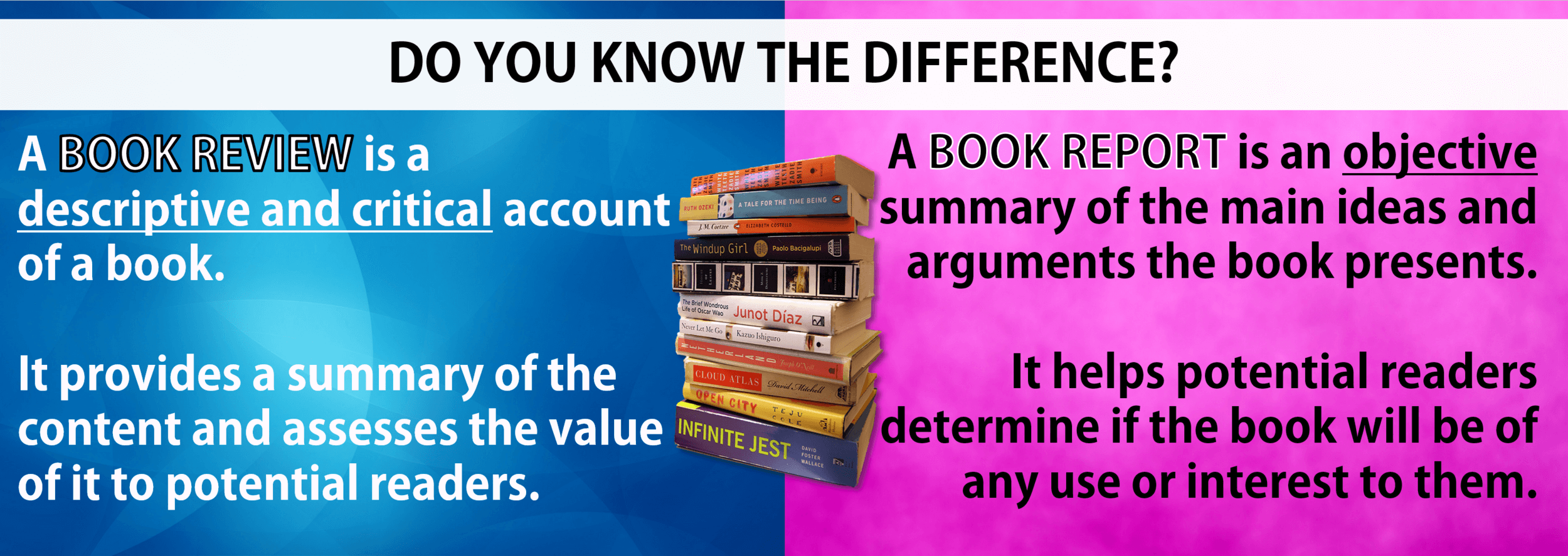
While the terms are often used interchangeably, there are clear differences in both the purpose and the format of the two genres. Generally speaking, book reports aim to give a more detailed outline of what occurs in a book. A book report on a work of fiction will tend to give a comprehensive account of the characters, major plot lines, and themes in the book. Book reports are usually written around the K-12 age range, while book reviews tend not to be undertaken by those at the younger end of this age range due to the need for the higher-level critical skills required in writing them. At their highest expression, book reviews are written at the college level and by professional critics.
Learn how to write a book review step by step with our complete guide for students and teachers by familiarizing yourself with the structure and features.
BOOK REVIEW STRUCTURE
ANALYZE Evaluate the book with a critical mind.
THOROUGHNESS The whole is greater than the sum of all its parts. Review the book as a WHOLE.
COMPARE Where appropriate compare to similar texts and genres.
THUMBS UP OR DOWN? You are going to have to inevitably recommend or reject this book to potential readers.
BE CONSISTENT Take a stance and stick with it throughout your review.
FEATURES OF A BOOK REVIEW
PAST TENSE You are writing about a book you have already read.
EMOTIVE LANGUAGE Whatever your stance or opinion be passionate about it. Your audience will thank you for it.
VOICE Both active and passive voice are used in recounts.
A COMPLETE UNIT ON REVIEW AND ANALYSIS OF TEXTS
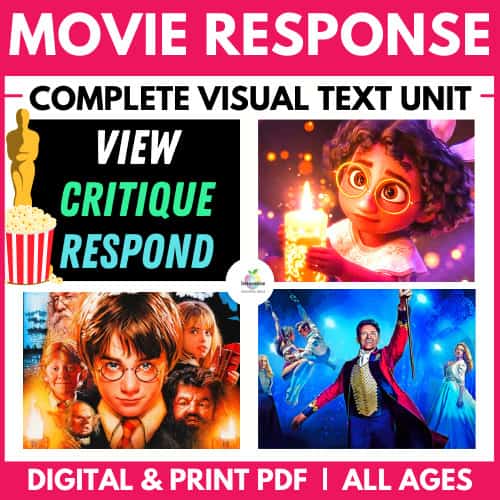
⭐ Make MOVIES A MEANINGFUL PART OF YOUR CURRICULUM with this engaging collection of tasks and tools your students will love. ⭐ All the hard work is done for you with NO PREPARATION REQUIRED.
This collection of 21 INDEPENDENT TASKS and GRAPHIC ORGANIZERS takes students beyond the hype, special effects and trailers to look at visual literacy from several perspectives offering DEEP LEARNING OPPORTUNITIES by watching a SERIES, DOCUMENTARY, FILM, and even VIDEO GAMES.
ELEMENTS OF A BOOK REVIEW
As with any of the writing genres we teach our students, a book review can be helpfully explained in terms of criteria. While there is much to the ‘art’ of writing, there is also, thankfully, a lot of the nuts and bolts that can be listed too. Have students consider the following elements before writing:
● Title: Often, the title of the book review will correspond to the title of the text itself, but there may also be some examination of the title’s relevance. How does it fit into the purpose of the work as a whole? Does it convey a message or reveal larger themes explored within the work?
● Author: Within the book review, there may be some discussion of who the author is and what they have written before, especially if it relates to the current work being reviewed. There may be some mention of the author’s style and what they are best known for. If the author has received any awards or prizes, this may also be mentioned within the body of the review.
● Genre: A book review will identify the genre that the book belongs to, whether fiction or nonfiction, poetry, romance, science-fiction, history etc. The genre will likely tie in, too with who the intended audience for the book is and what the overall purpose of the work is.
● Book Jacket / Cover: Often, a book’s cover will contain artwork that is worthy of comment. It may contain interesting details related to the text that contribute to, or detract from, the work as a whole.
● Structure: The book’s structure will often be heavily informed by its genre. Have students examine how the book is organized before writing their review. Does it contain a preface from a guest editor, for example? Is it written in sections or chapters? Does it have a table of contents, index, glossary etc.? While all these details may not make it into the review itself, looking at how the book is structured may reveal some interesting aspects.
● Publisher and Price: A book review will usually contain details of who publishes the book and its cost. A review will often provide details of where the book is available too.

BOOK REVIEW KEY ELEMENTS
As students read and engage with the work they will review, they will develop a sense of the shape their review will take. This will begin with the summary. Encourage students to take notes during the reading of the work that will help them in writing the summary that will form an essential part of their review. Aspects of the book they may wish to take notes on in a work of fiction may include:
● Characters: Who are the main characters? What are their motivations? Are they convincingly drawn? Or are they empathetic characters?
● Themes: What are the main themes of the work? Are there recurring motifs in the work? Is the exploration of the themes deep or surface only?
● Style: What are the key aspects of the writer’s style? How does it fit into the wider literary world?
● Plot: What is the story’s main catalyst? What happens in the rising action? What are the story’s subplots?
A book review will generally begin with a short summary of the work itself. However, it is important not to give too much away, remind students – no spoilers, please! For nonfiction works, this may be a summary of the main arguments of the work, again, without giving too much detail away. In a work of fiction, a book review will often summarise up to the rising action of the piece without going beyond to reveal too much!
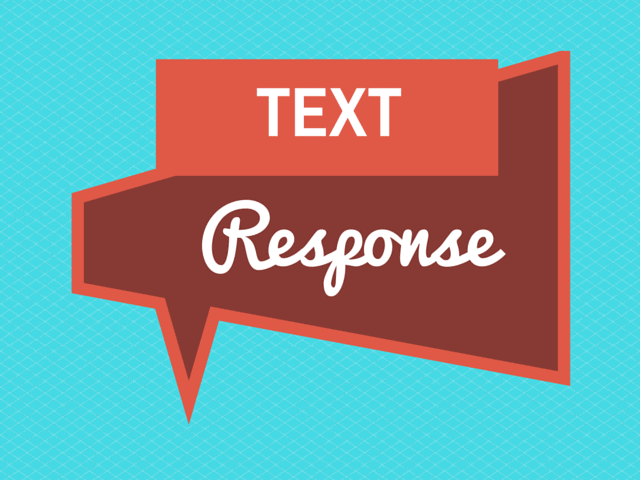
The summary should also provide some orientation for the reader. Given the nature of the purpose of a review, it is important that students’ consider their intended audience in the writing of their review. Readers will most likely not have read the book in question and will require some orientation. This is often achieved through introductions to the main characters, themes, primary arguments etc. This will help the reader to gauge whether or not the book is of interest to them.
Once your student has summarized the work, it is time to ‘review’ in earnest. At this point, the student should begin to detail their own opinion of the book. To do this well they should:
i. Make It Personal
Often when teaching essay writing we will talk to our students about the importance of climbing up and down the ladder of abstraction. Just as it is helpful to explore large, more abstract concepts in an essay by bringing it down to Earth, in a book review, it is important that students can relate the characters, themes, ideas etc to their own lives.
Book reviews are meant to be subjective. They are opinion pieces, and opinions grow out of our experiences of life. Encourage students to link the work they are writing about to their own personal life within the body of the review. By making this personal connection to the work, students contextualize their opinions for the readers and help them to understand whether the book will be of interest to them or not in the process.
ii. Make It Universal
Just as it is important to climb down the ladder of abstraction to show how the work relates to individual life, it is important to climb upwards on the ladder too. Students should endeavor to show how the ideas explored in the book relate to the wider world. The may be in the form of the universality of the underlying themes in a work of fiction or, for example, the international implications for arguments expressed in a work of nonfiction.
iii. Support Opinions with Evidence
A book review is a subjective piece of writing by its very nature. However, just because it is subjective does not mean that opinions do not need to be justified. Make sure students understand how to back up their opinions with various forms of evidence, for example, quotations, statistics, and the use of primary and secondary sources.
EDIT AND REVISE YOUR BOOK REVIEW
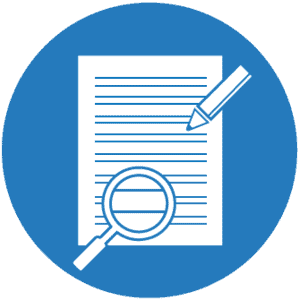
As with any writing genre, encourage students to polish things up with review and revision at the end. Encourage them to proofread and check for accurate spelling throughout, with particular attention to the author’s name, character names, publisher etc.
It is good practice too for students to double-check their use of evidence. Are statements supported? Are the statistics used correctly? Are the quotations from the text accurate? Mistakes such as these uncorrected can do great damage to the value of a book review as they can undermine the reader’s confidence in the writer’s judgement.
The discipline of writing book reviews offers students opportunities to develop their writing skills and exercise their critical faculties. Book reviews can be valuable standalone activities or serve as a part of a series of activities engaging with a central text. They can also serve as an effective springboard into later discussion work based on the ideas and issues explored in a particular book. Though the book review does not hold the sway it once did in the mind’s of the reading public, it still serves as an effective teaching tool in our classrooms today.

Teaching Resources
Use our resources and tools to improve your student’s writing skills through proven teaching strategies.
BOOK REVIEW GRAPHIC ORGANIZER (TEMPLATE)

101 DIGITAL & PRINT GRAPHIC ORGANIZERS FOR ALL CURRICULUM AREAS
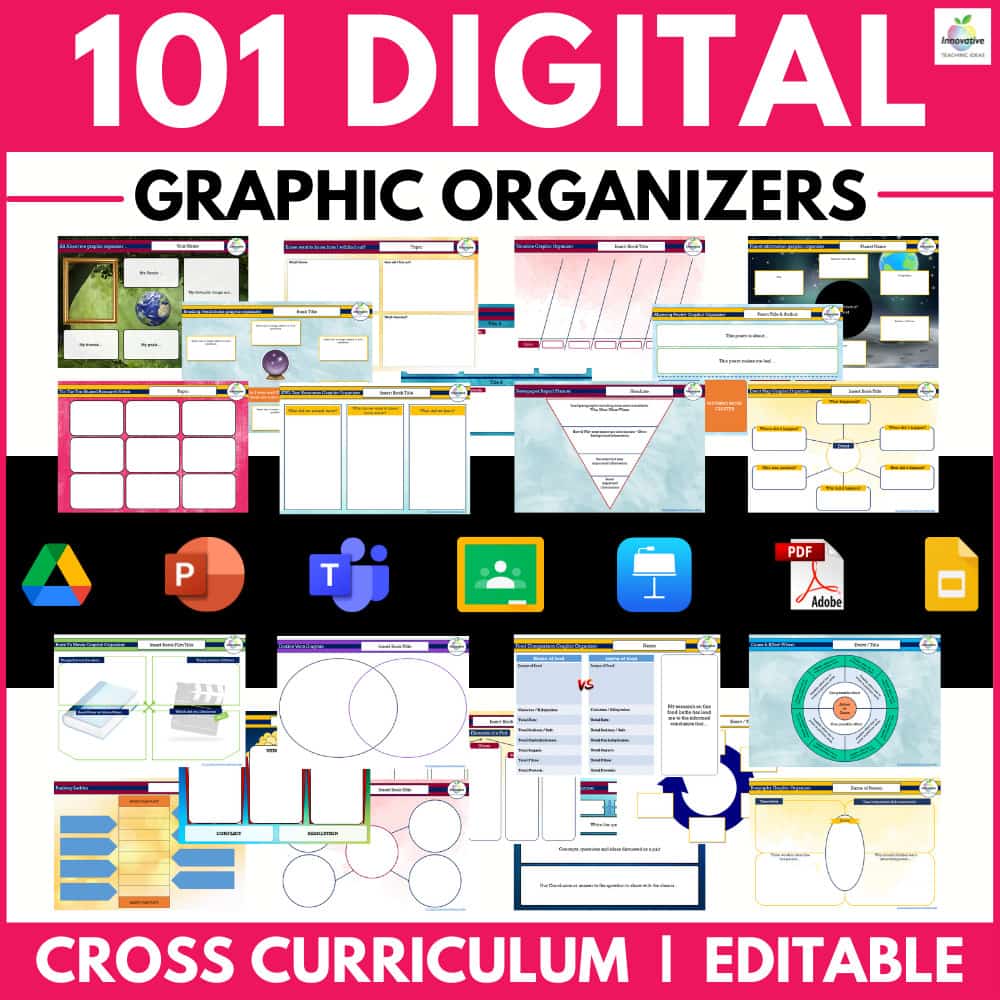
Introduce your students to 21st-century learning with this GROWING BUNDLE OF 101 EDITABLE & PRINTABLE GRAPHIC ORGANIZERS. ✌ NO PREP REQUIRED!!! ✌ Go paperless, and let your students express their knowledge and creativity through the power of technology and collaboration inside and outside the classroom with ease.
Whilst you don’t have to have a 1:1 or BYOD classroom to benefit from this bundle, it has been purpose-built to deliver through platforms such as ✔ GOOGLE CLASSROOM, ✔ OFFICE 365, ✔ or any CLOUD-BASED LEARNING PLATFORM.
Book and Movie review writing examples (Student Writing Samples)
Below are a collection of student writing samples of book reviews. Click on the image to enlarge and explore them in greater detail. Please take a moment to both read the movie or book review in detail but also the teacher and student guides which highlight some of the key elements of writing a text review
Please understand these student writing samples are not intended to be perfect examples for each age or grade level but a piece of writing for students and teachers to explore together to critically analyze to improve student writing skills and deepen their understanding of book review writing.
We would recommend reading the example either a year above and below, as well as the grade you are currently working with to gain a broader appreciation of this text type .

BOOK REVIEW VIDEO TUTORIALS
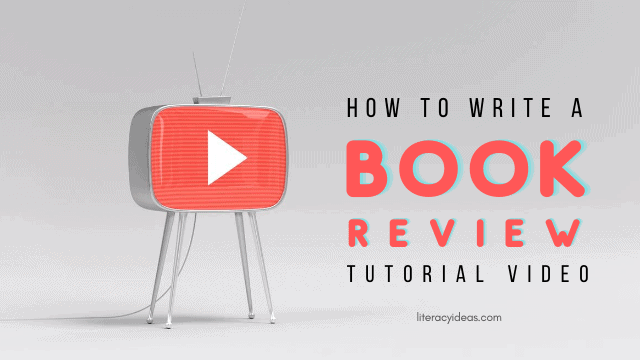
OTHER GREAT ARTICLES RELATED TO BOOK REVIEWS
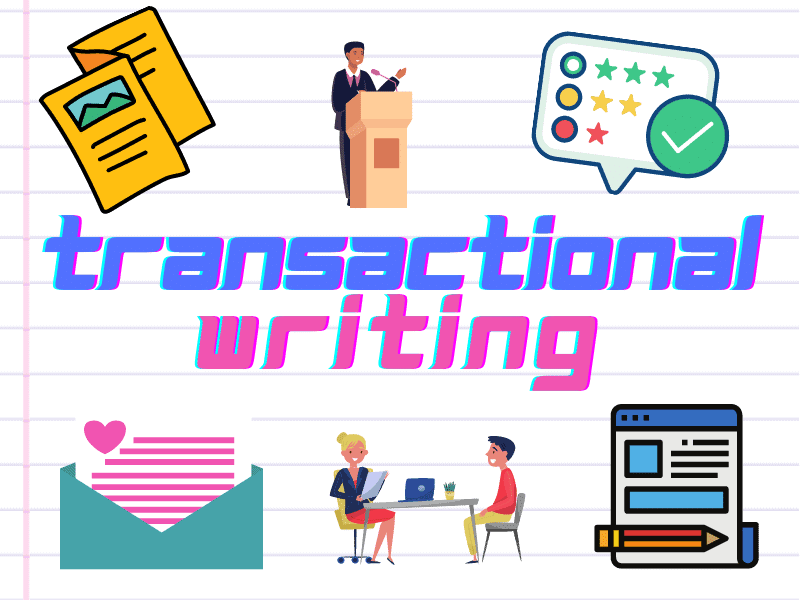
Transactional Writing
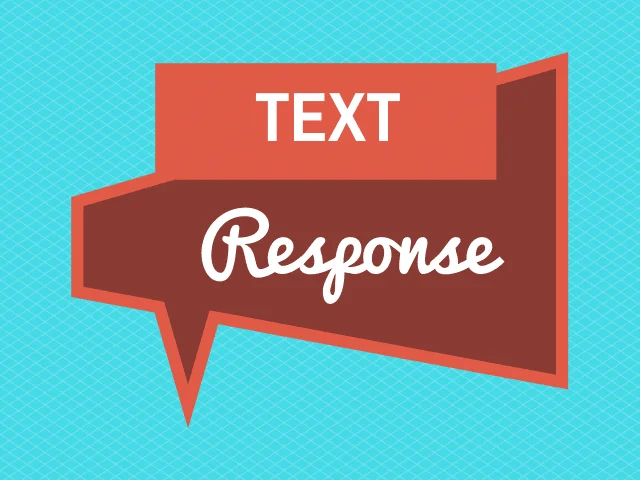
How to write a text response
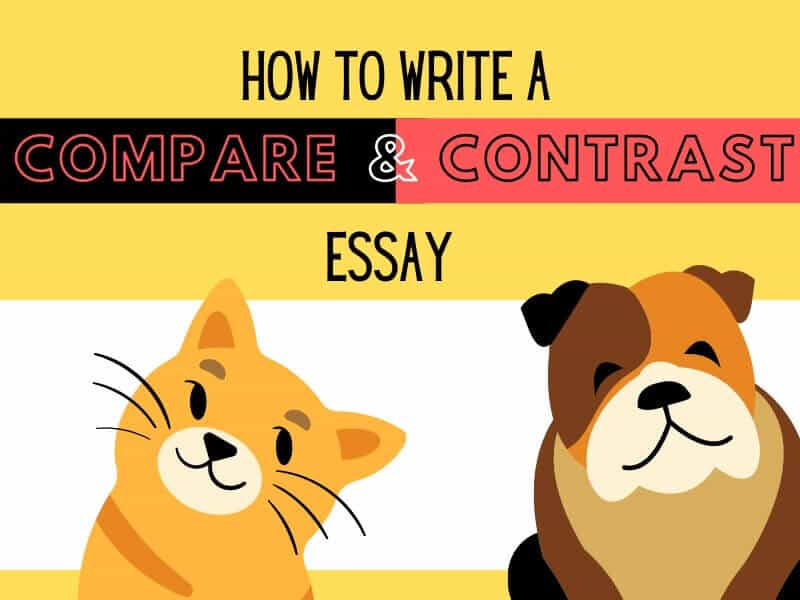
How to Write a Compare and Contrast Essay
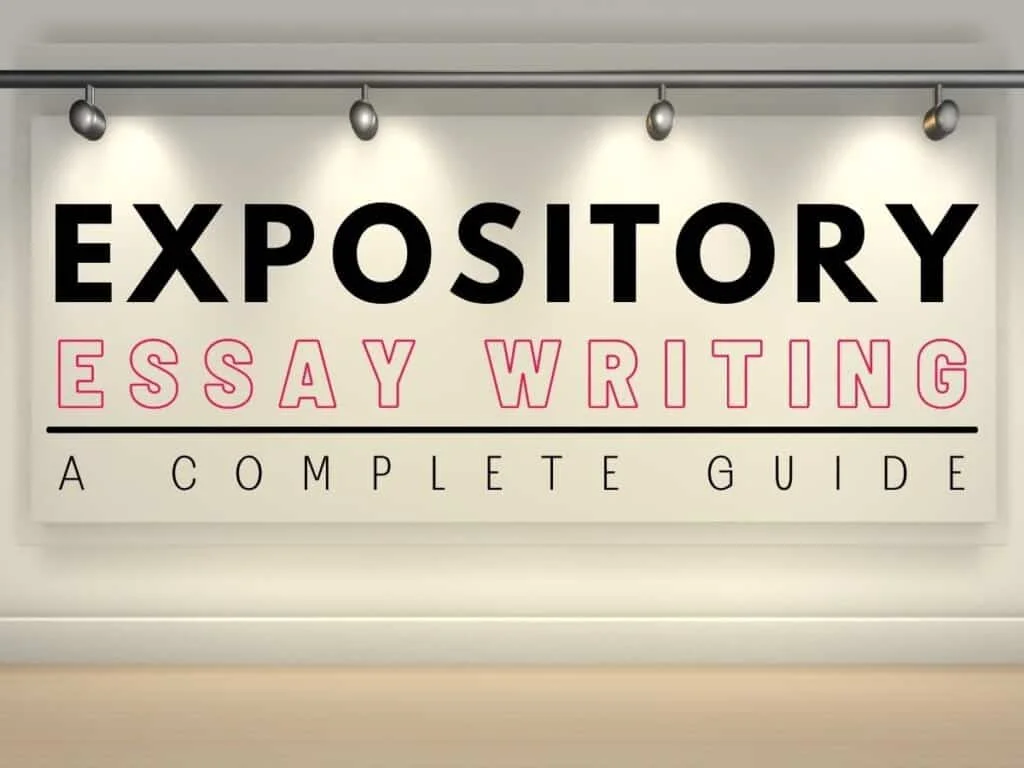
How to Write Excellent Expository Essays
How to Write a Book Review: A Comprehensive Tutorial With Examples

You don’t need to be a literary expert to craft captivating book reviews. With one in every three readers selecting books based on insightful reviews, your opinions can guide fellow bibliophiles toward their next literary adventure.
Learning how to write a book review will not only help you excel at your assigned tasks, but you’ll also contribute valuable insights to the book-loving community and turn your passion into a professional pursuit.
In this comprehensive guide, PaperPerk will walk you through a few simple steps to master the art of writing book reviews so you can confidently embark on this rewarding journey.
What is a Book Review?
A book review is a critical evaluation of a book, offering insights into its content, quality, and impact. It helps readers make informed decisions about whether to read the book.
Writing a book review as an assignment benefits students in multiple ways. Firstly, it teaches them how to write a book review by developing their analytical skills as they evaluate the content, themes, and writing style .
Secondly, it enhances their ability to express opinions and provide constructive criticism. Additionally, book review assignments expose students to various publications and genres, broadening their knowledge.
Furthermore, these tasks foster essential skills for academic success, like critical thinking and the ability to synthesize information. By now, we’re sure you want to learn how to write a book review, so let’s look at the book review template first.
Table of Contents
Book Review Template
How to write a book review- a step by step guide.
Check out these 5 straightforward steps for composing the best book review.
Step 1: Planning Your Book Review – The Art of Getting Started
You’ve decided to take the plunge and share your thoughts on a book that has captivated (or perhaps disappointed) you. Before you start book reviewing, let’s take a step back and plan your approach. Since knowing how to write a book review that’s both informative and engaging is an art in itself.
Choosing Your Literature
First things first, pick the book you want to review. This might seem like a no-brainer, but selecting a book that genuinely interests you will make the review process more enjoyable and your insights more authentic.
Crafting the Master Plan
Next, create an outline that covers all the essential points you want to discuss in your review. This will serve as the roadmap for your writing journey.
The Devil is in the Details
As you read, note any information that stands out, whether it overwhelms, underwhelms, or simply intrigues you. Pay attention to:
- The characters and their development
- The plot and its intricacies
- Any themes, symbols, or motifs you find noteworthy
Remember to reserve a body paragraph for each point you want to discuss.
The Key Questions to Ponder
When planning your book review, consider the following questions:
- What’s the plot (if any)? Understanding the driving force behind the book will help you craft a more effective review.
- Is the plot interesting? Did the book hold your attention and keep you turning the pages?
- Are the writing techniques effective? Does the author’s style captivate you, making you want to read (or reread) the text?
- Are the characters or the information believable? Do the characters/plot/information feel real, and can you relate to them?
- Would you recommend the book to anyone? Consider if the book is worthy of being recommended, whether to impress someone or to support a point in a literature class.
- What could improve? Always keep an eye out for areas that could be improved. Providing constructive criticism can enhance the quality of literature.
Step 2 – Crafting the Perfect Introduction to Write a Book Review
In this second step of “how to write a book review,” we’re focusing on the art of creating a powerful opening that will hook your audience and set the stage for your analysis.
Identify Your Book and Author
Begin by mentioning the book you’ve chosen, including its title and the author’s name. This informs your readers and establishes the subject of your review.
Ponder the Title
Next, discuss the mental images or emotions the book’s title evokes in your mind . This helps your readers understand your initial feelings and expectations before diving into the book.
Judge the Book by Its Cover (Just a Little)
Take a moment to talk about the book’s cover. Did it intrigue you? Did it hint at what to expect from the story or the author’s writing style? Sharing your thoughts on the cover can offer a unique perspective on how the book presents itself to potential readers.
Present Your Thesis
Now it’s time to introduce your thesis. This statement should be a concise and insightful summary of your opinion of the book. For example:
“Normal People” by Sally Rooney is a captivating portrayal of the complexities of human relationships, exploring themes of love, class, and self-discovery with exceptional depth and authenticity.
Ensure that your thesis is relevant to the points or quotes you plan to discuss throughout your review.
Incorporating these elements into your introduction will create a strong foundation for your book review. Your readers will be eager to learn more about your thoughts and insights on the book, setting the stage for a compelling and thought-provoking analysis.
How to Write a Book Review: Step 3 – Building Brilliant Body Paragraphs
You’ve planned your review and written an attention-grabbing introduction. Now it’s time for the main event: crafting the body paragraphs of your book review. In this step of “how to write a book review,” we’ll explore the art of constructing engaging and insightful body paragraphs that will keep your readers hooked.
Summarize Without Spoilers
Begin by summarizing a specific section of the book, not revealing any major plot twists or spoilers. Your goal is to give your readers a taste of the story without ruining surprises.
Support Your Viewpoint with Quotes
Next, choose three quotes from the book that support your viewpoint or opinion. These quotes should be relevant to the section you’re summarizing and help illustrate your thoughts on the book.
Analyze the Quotes
Write a summary of each quote in your own words, explaining how it made you feel or what it led you to think about the book or the author’s writing. This analysis should provide insight into your perspective and demonstrate your understanding of the text.
Structure Your Body Paragraphs
Dedicate one body paragraph to each quote, ensuring your writing is well-connected, coherent, and easy to understand.
For example:
- In Jane Eyre , Charlotte Brontë writes, “I am no bird; and no net ensnares me.” This powerful statement highlights Jane’s fierce independence and refusal to be trapped by societal expectations.
- In Normal People , Sally Rooney explores the complexities of love and friendship when she writes, “It was culture as class performance, literature fetishized for its ability to take educated people on false emotional journeys.” This quote reveals the author’s astute observations on the role of culture and class in shaping personal relationships.
- In Wuthering Heights , Emily Brontë captures the tumultuous nature of love with the quote, “He’s more myself than I am. Whatever our souls are made of, his and mine are the same.” This poignant line emphasizes the deep, unbreakable bond between the story’s central characters.
By following these guidelines, you’ll create body paragraphs that are both captivating and insightful, enhancing your book review and providing your readers with a deeper understanding of the literary work.
How to Write a Book Review: Step 4 – Crafting a Captivating Conclusion
You’ve navigated through planning, introductions, and body paragraphs with finesse. Now it’s time to wrap up your book review with a conclusion that leaves a lasting impression . In this final step of “how to write a book review,” we’ll explore the art of writing a memorable and persuasive conclusion.
Summarize Your Analysis
Begin by summarizing the key points you’ve presented in the body paragraphs. This helps to remind your readers of the insights and arguments you’ve shared throughout your review.
Offer Your Final Conclusion
Next, provide a conclusion that reflects your overall feelings about the book. This is your chance to leave a lasting impression and persuade your readers to consider your perspective.
Address the Book’s Appeal
Now, answer the question: Is this book worth reading? Be clear about who would enjoy the book and who might not. Discuss the taste preferences and circumstances that make the book more appealing to some readers than others.
For example: The Alchemist is a book that can enchant a young teen, but those who are already well-versed in classic literature might find it less engaging.
Be Subtle and Balanced
Avoid simply stating whether you “liked” or “disliked” the book. Instead, use nuanced language to convey your message. Highlight the pros and cons of reading the type of literature you’ve reviewed, offering a balanced perspective.
Bringing It All Together
By following these guidelines, you’ll craft a conclusion that leaves your readers with a clear understanding of your thoughts and opinions on the book. Your review will be a valuable resource for those considering whether to pick up the book, and your witty and insightful analysis will make your review a pleasure to read. So conquer the world of book reviews, one captivating conclusion at a time!
How to Write a Book Review: Step 5 – Rating the Book (Optional)
You’ve masterfully crafted your book review, from the introduction to the conclusion. But wait, there’s one more step you might consider before calling it a day: rating the book. In this optional step of “how to write a book review,” we’ll explore the benefits and methods of assigning a rating to the book you’ve reviewed.
Why Rate the Book?
Sometimes, when writing a professional book review, it may not be appropriate to state whether you liked or disliked the book. In such cases, assigning a rating can be an effective way to get your message across without explicitly sharing your personal opinion.
How to Rate the Book
There are various rating systems you can use to evaluate the book, such as:
- A star rating (e.g., 1 to 5 stars)
- A numerical score (e.g., 1 to 10)
- A letter grade (e.g., A+ to F)
Choose a rating system that best suits your style and the format of your review. Be consistent in your rating criteria, considering writing quality, character development, plot, and overall enjoyment.
Tips for Rating the Book
Here are some tips for rating the book effectively:
- Be honest: Your rating should reflect your true feelings about the book. Don’t inflate or deflate your rating based on external factors, such as the book’s popularity or the author’s reputation.
- Be fair:Consider the book’s merits and shortcomings when rating. Even if you didn’t enjoy the book, recognize its strengths and acknowledge them in your rating.
- Be clear: Explain the rationale behind your rating so your readers understand the factors that influenced your evaluation.
Wrapping Up
By including a rating in your book review, you provide your readers with an additional insight into your thoughts on the book. While this step is optional, it can be a valuable tool for conveying your message subtly yet effectively. So, rate those books confidently, adding a touch of wit and wisdom to your book reviews.
Additional Tips on How to Write a Book Review: A Guide
In this segment, we’ll explore additional tips on how to write a book review. Get ready to captivate your readers and make your review a memorable one!
Hook ’em with an Intriguing Introduction
Keep your introduction precise and to the point. Readers have the attention span of a goldfish these days, so don’t let them swim away in boredom. Start with a bang and keep them hooked!
Embrace the World of Fiction
When learning how to write a book review, remember that reviewing fiction is often more engaging and effective. If your professor hasn’t assigned you a specific book, dive into the realm of fiction and select a novel that piques your interest.
Opinionated with Gusto
Don’t shy away from adding your own opinion to your review. A good book review always features the writer’s viewpoint and constructive criticism. After all, your readers want to know what you think!
Express Your Love (or Lack Thereof)
If you adored the book, let your readers know! Use phrases like “I’ll definitely return to this book again” to convey your enthusiasm. Conversely, be honest but respectful even if the book wasn’t your cup of tea.
Templates and Examples and Expert Help: Your Trusty Sidekicks
Feeling lost? You can always get help from formats, book review examples or online college paper writing service platforms. These trusty sidekicks will help you navigate the world of book reviews with ease.
Be a Champion for New Writers and Literature
Remember to uplift new writers and pieces of literature. If you want to suggest improvements, do so kindly and constructively. There’s no need to be mean about anyone’s books – we’re all in this literary adventure together!
Criticize with Clarity, Not Cruelty
When adding criticism to your review, be clear but not mean. Remember, there’s a fine line between constructive criticism and cruelty. Tread lightly and keep your reader’s feelings in mind.
Avoid the Comparison Trap
Resist the urge to compare one writer’s book with another. Every book holds its worth, and comparing them will only confuse your reader. Stick to discussing the book at hand, and let it shine in its own light.
Top 7 Mistakes and How to Avoid Them
Writing a book review can be a delightful and rewarding experience, especially when you balance analysis, wit, and personal insights. However, some common mistakes can kill the brilliance of your review.
In this section of “how to write a book review,” we’ll explore the top 7 blunders writers commit and how to steer clear of them, with a dash of modernist literature examples and tips for students writing book reviews as assignments.
Succumbing to the Lure of Plot Summaries
Mistake: Diving headfirst into a plot summary instead of dissecting the book’s themes, characters, and writing style.
Example: “The Bell Jar chronicles the life of a young woman who experiences a mental breakdown.”
How to Avoid: Delve into the book’s deeper aspects, such as its portrayal of mental health, societal expectations, and the author’s distinctive narrative voice. Offer thoughtful insights and reflections, making your review a treasure trove of analysis.
Unleashing the Spoiler Kraken
Mistake: Spilling major plot twists or the ending without providing a spoiler warning, effectively ruining the reading experience for potential readers.
Example: “In Metamorphosis, the protagonist’s transformation into a monstrous insect leads to…”
How to Avoid: Tread carefully when discussing significant plot developments, and consider using spoiler warnings. Focus on the impact of these plot points on the overall narrative, character growth, or thematic resonance.
Riding the Personal Bias Express
Mistake: Allowing personal bias to hijack the review without providing sufficient evidence or reasoning to support opinions.
Example: “I detest books about existential crises, so The Sun Also Rises was a snoozefest.”
How to Avoid: While personal opinions are valid, it’s crucial to back them up with specific examples from the book. Discuss aspects like writing style, character development, or pacing to support your evaluation and provide a more balanced perspective.
Wielding the Vague Language Saber
Mistake: Resorting to generic, vague language that fails to capture the nuances of the book and can come across as clichéd.
Example: “This book was mind-blowing. It’s a must-read for everyone.”
How to Avoid: Use precise and descriptive language to express your thoughts. Employ specific examples and quotations to highlight memorable scenes, the author’s unique writing style, or the impact of the book’s themes on readers.
Ignoring the Contextualization Compass
Mistake: Neglecting to provide context about the author, genre, or cultural relevance of the book, leaving readers without a proper frame of reference.
Example: “This book is dull and unoriginal.”
How to Avoid: Offer readers a broader understanding by discussing the author’s background, the genre conventions the book adheres to or subverts, and any societal or historical contexts that inform the narrative. This helps readers appreciate the book’s uniqueness and relevance.
Overindulging in Personal Preferences
Mistake: Letting personal preferences overshadow an objective assessment of the book’s merits.
Example: “I don’t like stream-of-consciousness writing, so this book is automatically bad.”
How to Avoid: Acknowledge personal preferences but strive to evaluate the book objectively. Focus on the book’s strengths and weaknesses, considering how well it achieves its goals within its genre or intended audience.
Forgetting the Target Audience Telescope
Mistake: Failing to mention the book’s target audience or who might enjoy it, leading to confusion for potential readers.
Example: “This book is great for everyone.”
How to Avoid: Contemplate the book’s intended audience, genre, and themes. Mention who might particularly enjoy the book based on these factors, whether it’s fans of a specific genre, readers interested in character-driven stories, or those seeking thought-provoking narratives.
By dodging these common pitfalls, writers can craft insightful, balanced, and engaging book reviews that help readers make informed decisions about their reading choices.
These tips are particularly beneficial for students writing book reviews as assignments, as they ensure a well-rounded and thoughtful analysis.!
Many students requested us to cover how to write a book review. This thorough guide is sure to help you. At Paperperk, professionals are dedicated to helping students find their balance. We understand the importance of good grades, so we offer the finest writing service , ensuring students stay ahead of the curve. So seek expert help because only Paperperk is your perfect solution!
Order Original Papers & Essays
Your First Custom Paper Sample is on Us!
Timely Deliveries
No Plagiarism & AI
100% Refund
Try Our Free Paper Writing Service
Related blogs.

Connections with Writers and support
Privacy and Confidentiality Guarantee
Average Quality Score
How to Write a Book Review: Awesome Guide

A book review allows students to illustrate the author's intentions of writing the piece, as well as create a criticism of the book — as a whole. In other words, form an opinion of the author's presented ideas. Check out this guide from EssayPro — book review writing service to learn how to write a book review successfully.
What Is a Book Review?
You may prosper, “what is a book review?”. Book reviews are commonly assigned students to allow them to show a clear understanding of the novel. And to check if the students have actually read the book. The essay format is highly important for your consideration, take a look at the book review format below.
Book reviews are assigned to allow students to present their own opinion regarding the author’s ideas included in the book or passage. They are a form of literary criticism that analyzes the author’s ideas, writing techniques, and quality. A book analysis is entirely opinion-based, in relevance to the book. They are good practice for those who wish to become editors, due to the fact, editing requires a lot of criticism.
Book Review Template
The book review format includes an introduction, body, and conclusion.
- Introduction
- Describe the book cover and title.
- Include any subtitles at this stage.
- Include the Author’s Name.
- Write a brief description of the novel.
- Briefly introduce the main points of the body in your book review.
- Avoid mentioning any opinions at this time.
- Use about 3 quotations from the author’s novel.
- Summarize the quotations in your own words.
- Mention your own point-of-view of the quotation.
- Remember to keep every point included in its own paragraph.
- In brief, summarize the quotations.
- In brief, summarize the explanations.
- Finish with a concluding sentence.
- This can include your final opinion of the book.
- Star-Rating (Optional).
Get Your BOOK REVIEW WRITTEN!
Simply send us your paper requirements, choose a writer and we’ll get it done.
How to Write a Book Review: Step-By-Step
Writing a book review is something that can be done with every novel. Book reviews can apply to all novels, no matter the genre. Some genres may be harder than others. On the other hand, the book review format remains the same. Take a look at these step-by-step instructions from our professional writers to learn how to write a book review in-depth.

Step 1: Planning
Create an essay outline which includes all of the main points you wish to summarise in your book analysis. Include information about the characters, details of the plot, and some other important parts of your chosen novel. Reserve a body paragraph for each point you wish to talk about.
Consider these points before writing:
- What is the plot of the book? Understanding the plot enables you to write an effective review.
- Is the plot gripping? Does the plot make you want to continue reading the novel? Did you enjoy the plot? Does it manage to grab a reader’s attention?
- Are the writing techniques used by the author effective? Does the writer imply factors in-between the lines? What are they?
- Are the characters believable? Are the characters logical? Does the book make the characters are real while reading?
- Would you recommend the book to anyone? The most important thing: would you tell others to read this book? Is it good enough? Is it bad?
- What could be better? Keep in mind the quotes that could have been presented better. Criticize the writer.
Step 2: Introduction
Presumably, you have chosen your book. To begin, mention the book title and author’s name. Talk about the cover of the book. Write a thesis statement regarding the fictitious story or non-fictional novel. Which briefly describes the quoted material in the book review.
Step 3: Body
Choose a specific chapter or scenario to summarise. Include about 3 quotes in the body. Create summaries of each quote in your own words. It is also encouraged to include your own point-of-view and the way you interpret the quote. It is highly important to have one quote per paragraph.
Step 4: Conclusion
Write a summary of the summarised quotations and explanations, included in the body paragraphs. After doing so, finish book analysis with a concluding sentence to show the bigger picture of the book. Think to yourself, “Is it worth reading?”, and answer the question in black and white. However, write in-between the lines. Avoid stating “I like/dislike this book.”
Step 5: Rate the Book (Optional)
After writing a book review, you may want to include a rating. Including a star-rating provides further insight into the quality of the book, to your readers. Book reviews with star-ratings can be more effective, compared to those which don’t. Though, this is entirely optional.
Count on the support of our cheap essay writing service . We process all your requests fast.
Dive into literary analysis with EssayPro . Our experts can help you craft insightful book reviews that delve deep into the themes, characters, and narratives of your chosen books. Enhance your understanding and appreciation of literature with us.

Writing Tips
Here is the list of tips for the book review:

- A long introduction can certainly lower one’s grade: keep the beginning short. Readers don’t like to read the long introduction for any essay style.
- It is advisable to write book reviews about fiction: it is not a must. Though, reviewing fiction can be far more effective than writing about a piece of nonfiction
- Avoid Comparing: avoid comparing your chosen novel with other books you have previously read. Doing so can be confusing for the reader.
- Opinion Matters: including your own point-of-view is something that is often encouraged when writing book reviews.
- Refer to Templates: a book review template can help a student get a clearer understanding of the required writing style.
- Don’t be Afraid to Criticize: usually, your own opinion isn’t required for academic papers below Ph.D. level. On the other hand, for book reviews, there’s an exception.
- Use Positivity: include a fair amount of positive comments and criticism.
- Review The Chosen Novel: avoid making things up. Review only what is presented in the chosen book.
- Enjoyed the book? If you loved reading the book, state it. Doing so makes your book analysis more personalized.
Writing a book review is something worth thinking about. Professors commonly assign this form of an assignment to students to enable them to express a grasp of a novel. Following the book review format is highly useful for beginners, as well as reading step-by-step instructions. Writing tips is also useful for people who are new to this essay type. If you need a book review or essay, ask our book report writing services ' write paper for me ' and we'll give you a hand asap!
We also recommend that everyone read the article about essay topics . It will help broaden your horizons in writing a book review as well as other papers.
Book Review Examples
Referring to a book review example is highly useful to those who wish to get a clearer understanding of how to review a book. Take a look at our examples written by our professional writers. Click on the button to open the book review examples and feel free to use them as a reference.
Book review
Kenneth Grahame’s ‘The Wind in the Willows’
Kenneth Grahame’s ‘The Wind in the Willows’ is a novel aimed at youngsters. The plot, itself, is not American humor, but that of Great Britain. In terms of sarcasm, and British-related jokes. The novel illustrates a fair mix of the relationships between the human-like animals, and wildlife. The narrative acts as an important milestone in post-Victorian children’s literature.
Book Review
Dr. John’s ‘Pollution’
Dr. John’s ‘Pollution’ consists of 3 major parts. The first part is all about the polluted ocean. The second being about the pollution of the sky. The third part is an in-depth study of how humans can resolve these issues. The book is a piece of non-fiction that focuses on modern-day pollution ordeals faced by both animals and humans on Planet Earth. It also focuses on climate change, being the result of the global pollution ordeal.
We can do your coursework writing for you if you still find it difficult to write it yourself. Send to our custom term paper writing service your requirements, choose a writer and enjoy your time.
Need To Write a Book Review But DON’T HAVE THE TIME
We’re here to do it for you. Our professionals are ready to help 24/7
How To Write A Book Review?
What to include in a book review, what is a book review, related articles.
.webp)

Want to create or adapt books like this? Learn more about how Pressbooks supports open publishing practices.
61 How to Write a Book Review

The following is an outline to help you prepare for and write your review. The review will include five paragraphs.
¶1 Introduction
The introduction paragraph provides basic information about the book and gives a sense of what your report will be about. Along with a standard essay introduction, include:
- Title and Author
- Publication information: publisher, year, number of pages
- Brief description of characters
- Brief plot summary (1-3 sentences)
Body Paragraphs
There are two main sections for this part. The first is an explanation of what the book is about (summary). The second contains your opinions about the book and how successful it is (evaluation).
For fiction or other creative writing:
- Provide brief descriptions of the setting, the point of view (who tells the story), the main character(s) and other major characters. If there is a distinct mood or tone, mention that as well, for example gloom and doom, joyful, calm, tense, mysterious, etc.
- Give a short, objective plot summary. Provide the major events and the book’s climax and resolution.
In this section you explore and question the book in two paragraphs. Write your own opinions, but be sure to explain and support them with examples from the book.
¶3—Illustration/Expository paragraph
Define or explain the main literary element/s in the book. Some questions you might want to consider: Were you most struck by character, such as development or use of character types? Was the use of setting most memorable to you? Do you feel that conflict drove the plot? Which of the elements of Literature you have studied was most pivotal in this book?
¶4—Persuasive paragraph
Express whether a reader should or shouldn’t read this book. Some questions you might want to consider:
- Did the author achieve his or her purpose? For example, if this is a mystery story, did you feel the mystery and tension?
- Is the writing effective, powerful, difficult, beautiful?
- What are the strengths and weaknesses of the book?
- What is your overall response to the book? Did you find it interesting, moving, dull?
- Would you recommend it to others? Why or why not?
¶5—Conclusion
Conclude by pulling your thoughts together into a standard conclusion paragraph. You may also want to say what impression the book left you with or highlight what you want your reader to know about it.
Media Attributions
- “ Who, What, Where ” by mohamed hassan is licensed under a CC-0 Public Domain Licence .
Advanced English Copyright © 2021 by Allison Kilgannon is licensed under a Creative Commons Attribution-NonCommercial 4.0 International License , except where otherwise noted.
Share This Book
Book Review
Book Review Examples
Last updated on: Nov 20, 2023
Good Book Review Examples to Help you Write a Great Review
By: Nova A.
Reviewed By: Chris H.
Published on: Mar 30, 2021

A book review is a common assignment that allows the students to demonstrate the author’s intentions in the book. It also provides them with the chance not only to criticize but also to give constructive criticism on how they can make improvements.
The purpose of writing a book review is to come up with your opinion about the author’s ideas presented in the book. On the other hand, a book analysis is completely based on opinions that are relevant to the book.
Writing a review is something that can be done with any book that you read. However, some genres are harder to write. But with a proper plan, you can easily write a great review on any book.
Read some short book review examples in this guide. They will help you understand the key elements of writing a great review in no time.

On this Page
Academic Book Review Examples
If you are assigned to write a book review, referring to some examples will be of great help. In addition, reading examples before starting the writing process will help you understand what elements are needed for a great book review. There are also many review sites online you can get help from.
Academic book reviews follow a fairly simple structure. It usually includes an introduction, middle paragraphs, and a conclusion that sums up all the ideas.
For a great book review, here are the things you need to focus on during the writing process.
- The main argument presented by the author
- Author’s methodologyAppropriateness for the audience
- Relationship to the real world
Have a look at the following book review examples for kids before beginning the writing process.
Book Review Examples for Middle School Students
Book Review Example For Kids
Book Review Examples for High School Students

Paper Due? Why Suffer? That's our Job!
Book Review Examples for College Students
Book Review Examples for University Students
How to Write a Book Review - Examples
If you don’t know how to write a book review, look at the following steps.
The first step is to plan and create an outline that includes all the points that you will have to cover in the review. Don’t forget to include all the information about the characters, plot information, and some other parts of the chosen book.
The three parts of a book review are:
1. Provide a Summary
What is the book about? Write about the main characters and what is the conflict that is discussed in the book.
2. Provide Your Evaluation
Share your thoughts about the book and what elements work best.
3. Rate the Book
Rate and recommend the book to others who will enjoy reading this book.
If you need to submit a book review soon, we suggest you start reading some book reviews online. Here you can also find some good book review writing examples to understand how to craft each section of a book review.
Book Review Introduction Examples
Thesis Statement Book Review Examples
Tough Essay Due? Hire Tough Writers!
Book Review Conclusion Examples
Critical Book Review Examples
A book review is a critical evaluation of the book, movie, or any other literary work. It has two goals: the first is to inform the readers about the content of the book, and the second is to evaluate your judgment about the book.
A book review is more than a book report. A review is basically a critical essay that evaluates the merits of a literary work. The purpose of writing a book review is not to prove that you have read a book but to show that you think critically about the chosen book.
When you are asked to write a critical book review, you need to identify, summarize and evaluate the ideas of the author. In simpler words, you will be examining and evaluating another person’s work from your point of view.
Science Book Review Examples
A scientific book review will contain the same elements as writing a review for a fiction book; some elements might vary. When you are reviewing a scientific text, you need to pay attention to the writing style and the validity of the content.
Most students turn to non-fictional sources of information. It is important to make sure the information you provide in your review is factual and scientific.
Book review writing can be difficult if you don’t know how to follow the standard protocols. That’s where our reliable book review writing service aims to provide the necessary help.
No matter what your academic level is, we can provide you with the best book review writing help. This type of writing assignment can be tricky and time-consuming. So, if you don’t know how to crack this task, better get professional help.
We at 5StarEssays.com provide exceptional book review writing help. Not only book reviews, but we also provide the best ‘ write an essay for me ’ help to students. Moreover, we also have an AI essay writer to help you with tight deadlines, give it a try now!
Frequently Asked Questions
How do you write a book review example.
Here are some steps that will help you to write a book review example.
- Start writing with few sentences and describe what the book is all about
- Focus on your thoughts
- Mention things that you dont like about the book.
- Summarize your thoughts.
- Give rating to the book.

Thesis, Law
As a Digital Content Strategist, Nova Allison has eight years of experience in writing both technical and scientific content. With a focus on developing online content plans that engage audiences, Nova strives to write pieces that are not only informative but captivating as well.
Was This Blog Helpful?
Keep reading.
- Book Review - An Easy Guide To Write A Review

People Also Read
- how to avoid plagiarism
- definition essay topics
- writing narrative essay
- creative essay writers
- annotated bibliography example
Burdened With Assignments?

Advertisement
- Homework Services: Essay Topics Generator
© 2024 - All rights reserved
- Craft and Criticism
- Fiction and Poetry
- News and Culture
- Lit Hub Radio
- Reading Lists

- Literary Criticism
- Craft and Advice
- In Conversation
- On Translation
- Short Story
- From the Novel
- Bookstores and Libraries
- Film and TV
- Art and Photography
- Freeman’s
- The Virtual Book Channel
- Behind the Mic
- Beyond the Page
- The Cosmic Library
- The Critic and Her Publics
- Emergence Magazine
- Fiction/Non/Fiction
- First Draft: A Dialogue on Writing
- Future Fables
- The History of Literature
- I’m a Writer But
- Just the Right Book
- Lit Century
- The Literary Life with Mitchell Kaplan
- New Books Network
- Tor Presents: Voyage Into Genre
- Windham-Campbell Prizes Podcast
- Write-minded
- The Best of the Decade
- Best Reviewed Books
- BookMarks Daily Giveaway
- The Daily Thrill
- CrimeReads Daily Giveaway
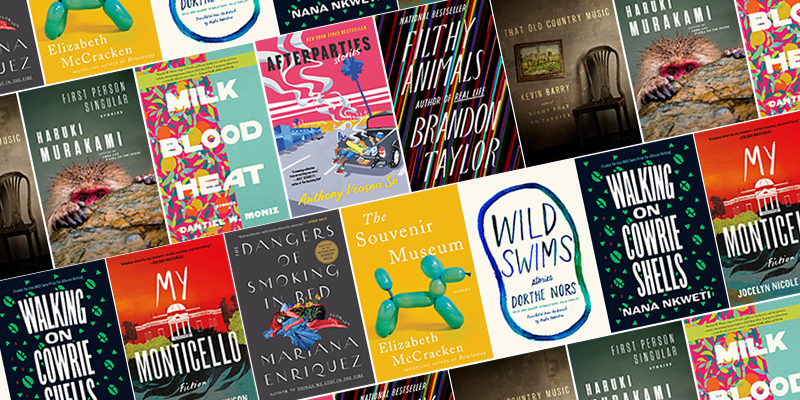
The Best Reviewed Short Story Collections of 2021
Featuring haruki murakami, brandon taylor, elizabeth mccracken, kevin barry, lily king, and more.

Well, friends, another grim and grueling plague year is drawing to a close, and that can mean only one thing: it’s time to put on our Book Marks stats hats and tabulate the best reviewed books of the past twelve months.
Yes, using reviews drawn from more than 150 publications, over the next two weeks we’ll be revealing the most critically-acclaimed books of 2021, in the categories of (deep breath): Memoir and Biography ; Sci-Fi, Fantasy, and Horror ; Short Story Collections; Essay Collections; Poetry; Mystery and Crime; Graphic Literature; Literature in Translation; General Fiction; and General Nonfiction.
Today’s installment: Short Story Collections .
Brought to you by Book Marks , Lit Hub’s “Rotten Tomatoes for books.”
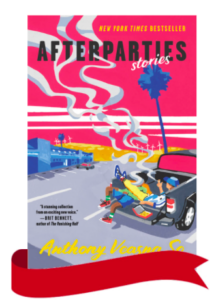
1. Afterparties by Anthony Veasna So (Ecco)
22 Rave • 5 Positive • 1 Mixed
“The presence of the author is so vivid in Afterparties , Anthony Veasna So’s collection of stories, he seems to be at your elbow as you read … The personality that animates Afterparties is unmistakably youthful, and the stories themselves are mainly built around conditions of youth—vexed and tender relationships with parents, awkward romances, nebulous worries about the future. But from his vantage on the evanescent bridge to maturity, So is puzzling out some big questions, ones that might be exigent from different vantages at any age. The stories are great fun to read—brimming over with life and energy and comic insight and deep feeling.”
–Deborah Eisenberg ( New York Review of Books )
2. Filthy Animals by Brandon Taylor (Riverhead)
19 Rave • 7 Positive • 2 Mixed Read an interview with Brandon Taylor here
“Taylor plays the Lionel-Charles-Sophie storyline for all its awkwardness and resentment, but it can feel like a note held too long to suspend commitment, which is the resolution we’re trained to expect … The violence is neither glamorous nor gratuitous; it is senseless without being pointless. In contrast, Taylor presents such earnest moments of vulnerability in Anne of Cleves that my breath hitched … Some writers have the gift of perfect pitch when writing dialogue; Taylor’s gift is perfect tempo. In a band of writers, he’d be the drummer who sticks to a steady moderato. He neither rushes a story to its high notes nor drags the pace so that we can admire his voice. And as a plotter, he doesn’t rely on gasp-inducing reveals … Taylor’s superpower is compressing a lifetime of backstory into a paragraph – sometimes just a sentence … I’ve come to expect, in fiction, the story of the Sad Gay Youth who is rejected by his often religious family and thereafter becomes self-destructive or reckless. And while Taylor refracts versions of this story throughout the collection, he does so without overly romanticising it … He is a writer of enormous subtlety and of composure beyond his years.”
–Ian Williams ( The Guardian )
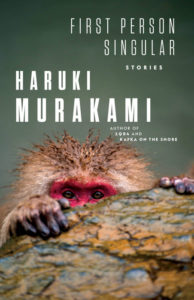
3. First Person Singular by Haruki Murakami (Knopf)
13 Rave • 17 Positive • 7 Mixed • 5 Pan
“… a blazing and brilliant return to form … a taut and tight, suspenseful and spellbinding, witty and wonderful group of eight stories … there isn’t a weak one in the bunch. The stories echo with Murakami’s preoccupations. Nostalgia and longing for the charged, evocative moments of young adulthood. Memory’s power and fragility; how identity forms from random decisions, ‘minor incidents,’ and chance encounters; the at once intransigent and fragile nature of the ‘self.’ Guilt, shame, and regret for mistakes made and people damaged by foolish or heartless choices. The power and potency of young love and the residual weight of fleeting erotic entanglements. Music’s power to make indelible impressions, elicit buried memories, connect otherwise very different people, and capture what words cannot. The themes become a kind of meter against which all the stories make their particular, chiming rhythms … The reading experience is unsettled by a pervasive blurring of the lines between fantasy and reality, dream and waking … Most of the narrators foreground the act of telling and ruminate on the intention behind and effects of disclosing secrets, putting inchoate impulses, fears, or yearnings into clear, logical prose … This mesmerizing collection would make a superb introduction to Murakami for anyone who hasn’t yet fallen under his spell; his legion of devoted fans will gobble it up and beg for more.”
–Pricilla Gilman ( The Boston Globe )
4. That Old Country Music by Kevin Barry (Doubleday)
13 Rave • 10 Positive •1 Mixed
“There’s not a bad story in the bunch, and it’s as accomplished a book as Barry has ever written … Barry does an excellent job probing the psyche of his diffident protagonist, and ends the story with an unexpected moment of sweetness that’s anything but cloying—realism doesn’t need to be miserablism, he seems to hint; sometimes things actually do work out … Barry has a rare gift for crafting characters the reader cares about despite their flaws; in just 13 pages, he manages to make Hannah and Setanta come to life through sharp dialogue and keen observations … Barry proves to be a master of writing about both love and cruelty … Barry brilliantly evokes both the good and bad sides of love, and does so with stunningly gorgeous writing … There’s not an aspect of writing that Barry doesn’t excel at. His dialogue rings true, and he’s amazingly gifted at scene-setting—he evokes both the landscape of western Ireland and the landscape of the human heart beautifully. His greatest accomplishment, perhaps, is his understanding of the ways our collective psyche works; he seems to have an innate sense of why people behave the way we do, and exactly what we’re capable of, both good and bad.”
–Michael Schaub ( NPR )
5. Milk Blood Heat by Dantiel W. Moniz (Grove)
17 Rave • 1 Positive Listen to an interview with Dantiel W. Moniz here
“Mortality is the undercurrent in Dantiel W. Moniz’s electrifying debut story collection, Milk Blood Heat , but where there’s death there is the whir of life, too. A lot of collections consist of some duds, yet every single page in this book is a shimmering seashell that contains the sound of multiple oceans. Reading one of Moniz’s stories is like holding your breath underwater while letting the salt sting your fresh wounds. It’s exhilarating and shocking and even healing. The power in these stories rests in their veracity, vitality and vulnerability.”
–Michelle Filgate ( The Washington Post )
6. The Dangers of Smoking in Bed by Mariana Enriquez (Hogarth)
15 Rave 2 Positive Read a story from The Dangers of Smoking in Bed here
“There’s something thrilling about other people’s suffering—at least within this collection’s 12 stories of death, sex and the occult. Horrors are relayed in a stylish deadpan … Enriquez’s plots deteriorate with satisfying celerity … Largely it’s insatiable women, raggedy slum dwellers and dead children—those who are ordinarily powerless—who wield unholy power in this collection, and they seem uninterested in being reasonable. And Enriquez is particularly adept at capturing the single-minded intensity of teenage girls … If some of these stories end vaguely, the best ones close on the verge of some transgressive climax … To Enriquez, there’s pleasure in the perverse.”
–Chelsea Leu ( The New York Times Book Review )
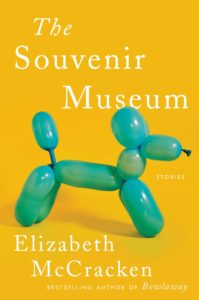
7. The Souvenir Museum by Elizabeth McCracken (Ecco)
13 Rave • 2 Positive • 1 Mixed Read Elizabeth McCracken on savoring the mystery of stories here
“Elizabeth McCracken’s The Souvenir Museum begins with one of the funniest short stories I’ve read in a long time … I had to stop reading ‘The Irish Wedding’ several times to explain to my husband why I was laughing so hard. I kept thinking: I wish I were reading a whole book about these people … they’re all beguiling … This tale, like much of McCracken’s work, captures the mixed bag that characterizes most people’s lives … McCracken’s writing is never dull. She ends this fantastic collection with a second English wedding and its aftermath, nearly 20 years after the first, delivering happiness tempered by sobering circumstances—and a satisfying symmetry.”
–Heller McAlpin ( NPR )
8. Wild Swims by Dorthe Nors (Graywolf)
13 Rave • 1 Positive Read an excerpt from Wild Swims here
“How slippery the work of the Danish writer Dorthe Nors is, how it sideswipes and gleams … The stories are vivid the way a flash of immobilizing pain is vivid … Perhaps because they’re so very short and because they mostly sketch slight interior shifts in her characters, Nors’s stories all feel a little bashful, a little tender. Surely this is intentional … Most of her stories are too short to linger deeply in time or consciousness; the characters spin back into their silence almost as soon as they emerge on the page. Nors is a master at portraying female rage, but here there is also no violent explosion outward, instead a sort of inner collapse; her characters assiduously resist confronting their fury until it rises up against them and attacks their bodies … The sense of simultaneous, furious upwelling into text and retraction into shame or reticence gives the stories a powerful undercurrent, as if they were constantly wrestling with themselves. Inherently self-contradicting, they wobble interestingly on their axes, pulled between outraged individualism and the restrictive Janteloven.”
–Lauren Groff ( The New York Review of Books )
9. Walking on Cowrie Shells by Nana Nkweti (Graywolf)
12 Rave • 1 Mixed Read an interview with Nana Nkweti here
“The pure energy of the words strikes first, the thrumming, soaring, frenetic pace of Nana Nkweti’s expression … None of these stories end with a miraculous healing. Even where revelations occur, they never erase scars. Nkweti uses genre tropes to subvert our expectations. She employs the zombie story, the fairy tale, and the confessional in order to invert conventions … The levity of Nkweti’s writing can make even passing descriptions a delight … Occasionally the writing veers into the overwrought … But the sheer speed of Nkweti’s expression allows for correction in midair, and her keen descriptive eye provides more pleasures than missteps … Her inventiveness dazzles.”
–Lee Thomas ( Los Angeles Review of Books )
10. My Monticello by Jocelyn Nicole Johnson (Henry Holt)
9 Rave • 4 Positive 1 Mixed Read Jocelyn Nicole Johnson on how writing “vengeful fiction” can make you a better person, here
“Jocelyn Nicole Johnson uses history to spectacular effect in her debut fiction collection … What makes My Monticello particularly resonant is that it does not stray far from life as we know it today. In the near future conjured by Johnson, there are the heat waves and wildfires that bring climate change into view. There is fallout from a fraught election. There is the vile replacement theory rhetoric of the right wing. But the lives of Johnson’s richly drawn characters—their personal stories—are always in focus. And, because of it, the storytelling is propulsive, as we follow these refugees along a harrowing journey, with danger ever at their heels. My Monticello is, quite simply, an extraordinary debut from a gifted writer with an unflinching view of history and what may come of it.”
–Anissa Gray ( The Washington Post )
Our System:
RAVE = 5 points • POSITIVE = 3 points • MIXED = 1 point • PAN = -5 points
- Share on Facebook (Opens in new window)
- Click to share on Twitter (Opens in new window)
- Click to share on Google+ (Opens in new window)
- Click to share on LinkedIn (Opens in new window)
- Click to share on Reddit (Opens in new window)
- Click to share on Tumblr (Opens in new window)
- Click to share on Pinterest (Opens in new window)
- Click to share on Pocket (Opens in new window)


Previous Article
Next article, support lit hub..

Join our community of readers.
to the Lithub Daily
Popular posts.

Follow us on Twitter
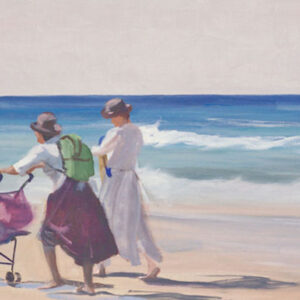
On the Fleeting Wonder of Youth and the Surreal Permanence of Motherhood
- RSS - Posts
Literary Hub
Created by Grove Atlantic and Electric Literature
Sign Up For Our Newsletters
How to Pitch Lit Hub
Advertisers: Contact Us
Privacy Policy
Support Lit Hub - Become A Member
Become a Lit Hub Supporting Member : Because Books Matter
For the past decade, Literary Hub has brought you the best of the book world for free—no paywall. But our future relies on you. In return for a donation, you’ll get an ad-free reading experience , exclusive editors’ picks, book giveaways, and our coveted Joan Didion Lit Hub tote bag . Most importantly, you’ll keep independent book coverage alive and thriving on the internet.

Become a member for as low as $5/month
Book Review Writing
Book Review Examples
Book Review Examples to Help You Get Started
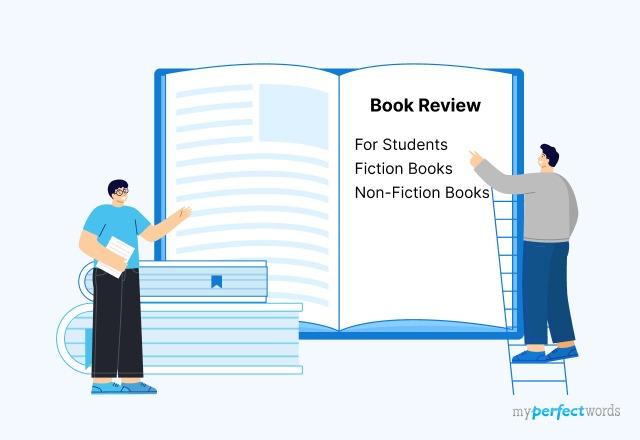
People also read
How to Write a Book Review - A Step By Step Guide
A Complete Book Review Format Guide For Students
Are you in desperate need of some assistance to up your book review writing game?
We know that penning down a review can come off as a tricky challenge, but do not worry!
To help you write book reviews that carry the essence of the book and engage readers, we have collected a handful of book review examples in this blog.
The included examples will enable you to understand different writing styles and approaches taken toward book review writing . So, you can use your words effectively to craft the perfect book review.
Let’s kickstart things off!
- 1. Good Book Review Examples for Students
- 2. Short Book Review Examples for Fiction Books
- 3. Non-Fiction Book Review Examples
Good Book Review Examples for Students
You might be a professional writer, or you may not have any experience in writing book reviews. Rest assured, we’ll show you how to write perfect book reviews with the help of a sample template and great examples.
See this template to know what you should include in your book review:
Book Review Template
Here is a good book review example for 4th-grade students:

Paper Due? Why Suffer? That's our Job!
Book Review Examples for Middle School Students
Reading reviews written by others can help you get a feel and flavor of good book reviews. Learning how to write a perfect book review can help students to:
- Critically analyze a text
- Give a personal opinion on the text
- Improve analyzing and critical thinking skills
Here are some interesting book review examples suitable for middle school students.
Book Review Example for Middle School Students
Book Review Example for Kids
Book Review of Any Book in 300 Words
Science Book Review Example
Book Review Examples For High School Students
Below, you can also find some good book review examples for high school students. These real-life examples can help you get a clear understanding of the standard book review format that you should follow.
Book Review Example for High School Students
Book Review Examples for Class 9
Book Review Example for Grade 10
Book Review Examples for College Students
As a college student, you are required to demonstrate that you have examined the book from different angles. The points you raise in your book review need to be supported with clear facts and evidence.
The following are some interesting critical book review examples for college students to learn how to write a perfect review.
Book Review Example for Class 12
Short Book Review for Students
Conclusion of Book Review Example
Short Book Review Examples for Fiction Books
Fiction book reviews follow the same basic formula as writing book reviews of any other genre. For your help, we have compiled exciting examples of fiction book reviews that you can get valuable assistance from.
Short Book Review Example for Fiction Books
Book Review of Hazel Wood by Melissa Albert
“The Hazel Wood” by Melissa Albert is a work of fiction and falls into fantasy and young adult fiction genres. The novel revolves around fantastical fairy tales, and magical realism, blurring the lines between reality and fantasy.
Here is an example of a comprehensive review of the book Hazel Wood:
Tough Essay Due? Hire Tough Writers!
Non-Fiction Book Review Examples
For reviewing a non-fiction book, you are required to describe the book and summarize major points of interest. You should evaluate the author’s contribution to a subject that you may know very little about.
Here is a great non-fiction book review example to help you come up with a critical perspective on a text.
Non-Fiction Book Review Example
Hopefully, with the help of the above examples, you get a better idea of how to write a perfect book review.
To wrap it up, Writing a great book review is a tricky task, no matter if you are a high school, college, or university student. Book review writing might seem like a simple task, but it requires excellent analyzing and critical thinking skills.
But, not everyone can crack this task easily. They might need additional help from expert book review writers. That’s why our expert essay writing service offers professional book review writing help whenever you need it.
Professional essay writers at MyPerfectWords.com can help you with all your academic requests within your specified timeline. Just contact our customer service and we’ll handle all your queries promptly.
Keep the words flowing!

Write Essay Within 60 Seconds!

Cathy has been been working as an author on our platform for over five years now. She has a Masters degree in mass communication and is well-versed in the art of writing. Cathy is a professional who takes her work seriously and is widely appreciated by clients for her excellent writing skills.

Paper Due? Why Suffer? That’s our Job!
Keep reading
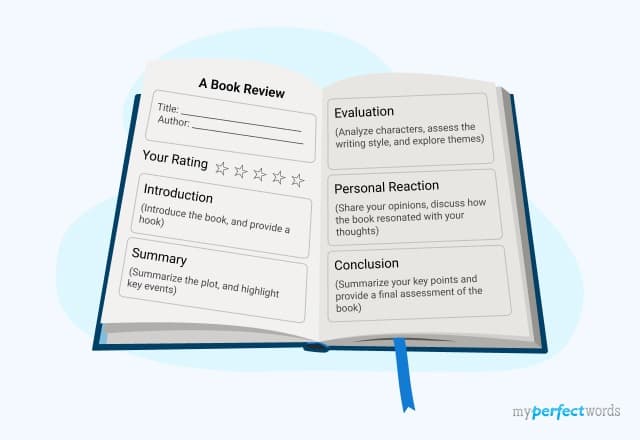
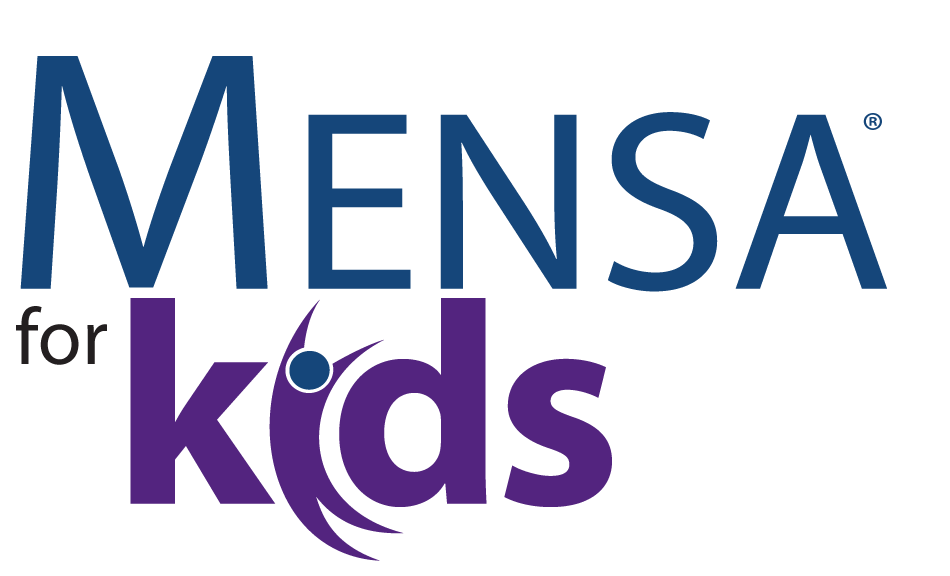
Book Review Writing Examples
Examples: learn from the efforts of others.
Learning how to write strong reviews takes time and not a little effort. Reading the reviews others have done can help you get a feel for the flow and flavor of reviews.
If I Never Forever Endeavor Review by Hayden, age 4, Southeast Michigan Mensa
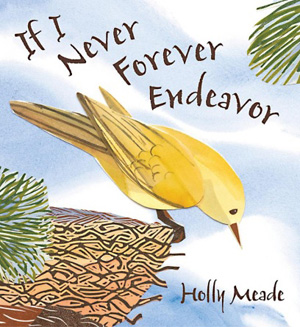
This book was about a bird who didn't yet know how to fly.
The bird has to decide if it will try to fly, but it was not sure if it wants to. The bird thought, "If I never forever endeavor" then I won't ever learn. On one wing, he worries he might fail and on the other wing he thinks of how he may succeed. He worries that if he tries, he may get lost in the world. That makes him want to stay in his nest where he's safe.
I think this book would help other children to learn that trying new things can be scary, but sometimes when we try, we can find things that make us happy too. And this book will help others know that mistakes are okay and part of learning.
My favorite part is that the bird tried and learned that she could fly. I also liked that I read this book because it gave me a chance to talk to mom about making mistakes and how I don't like making them. Then I learned they are good and part of learning.
Boys and girls who are 3 to 8 years old would like this book because it teaches about trying a new thing and how it's important to get past being scared so you can learn new things.
I give the book 5 stars since I think it's important for other children to learn about courage.
Flesh & Blood So Cheap Review by Umar B., age 8, Central New Jersy Mensa
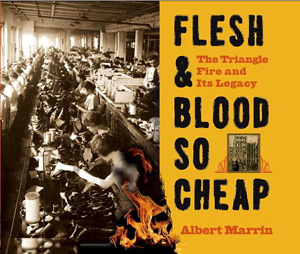
I liked this book. People who are interested in national disasters and US history as well as immigration will most probably be interested in reading this book.
Readers can gain knowledge of what it was like to work in New York City in the early 1900s. One of the things that was especially interesting was that there were no safety laws at work. Also, there was a big contrast between the rich and the poor. Some people may not like this book because it is very depressing, but it is an important event in history to remember.
This book was very well written. It has black and white photos along with descriptions of the photos. These photos give us a better idea of what people's lives were like. This book is suitable for 9-20 year olds.
I give this book 5 stars.
Galaxy Zach: Journey to Juno Review by Young Mensan Connor C., age 6, Boston Mensa
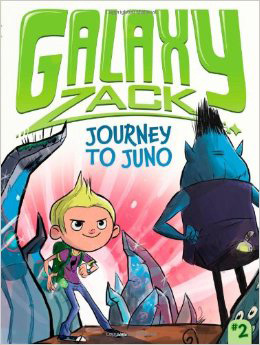
Journey To Juno is the second book of the Galaxy Zack series. It is just as good as the first one. It's awesome!
Zack joins the Sprockets Academy Explorers Club at school. They fly on a special trip to Juno, a new planet no one has ever visited. Zack gets paired up with Seth, the class bully, and that's dreadful but Zack is excited when he finds a huge galaxy gemmite. A gemmite that large had not been found in 100 years! Kids will love this book!
Boys and girls will both like it. It's an easy chapter book with pictures on every page. I love the illustrations. I think ages 6-8 would like this but younger kids would like the story being read to them.
My favorite parts are the galactic blast game (it is similar to baseball except there are robots playing), recess at Zack's school where everything is 3-D holographic images, the rainbow river in a crystal cave on Juno, and the galaxy gemmite that Zack finds on Juno. I also loved when a life-size holographic image of his Earth friend appears in Zack's room because he calls him on a hyperphone. I give this book one hundred stars! There is a "to be continued" at the end so you have to read the next book see what's in store. I can't wait to find out what happens!!!
I Capture the Castle Review by Lauren W., age 17, Mensa in Georgia
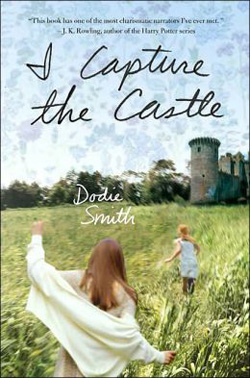
Dodie Smith's novel I Capture the Castle is a journey through the mind of a young writer as she attempts to chronicle her daily life. Seventeen-year-old Cassandra Mortmain has recently learned to speed-write, and she decides to work on her writing skills by describing the actions and conversations of those around her.
Cassandra lives in a fourteenth-century English castle with an interesting cast of characters: her beautiful older sister, Rose; her rather unsociable author father and his second wife, artist-model Topaz; Stephen, the garden boy; a cat and a bull terrier; and sometimes her brother Thomas when he is home from school. One fateful day they make the acquaintance of the Cotton family, including the two sons, and a web of tangled relationships ensues.
While I definitely recommend this book to other readers, I would recommend it to older teenagers, mainly because it will resonate better with them. The writing is tame enough that younger teens could also read it, but most of the characters are adults or on the verge of adulthood. Older readers would take the most from it since they can not only relate, but they may also better pick up on and appreciate Cassandra's sometimes subtle humor.
Over the course of the novel, Cassandra undergoes a definite transformation from child to mature young adult, even though it's only over the course of several months. I love that I could see into her mindset and read exactly what she was feeling when she thought out situations. Her thoughts flowed well and moved the book along very quickly.
Cassandra's narrative voice is wonderful. She is serious at times, but also very witty, which makes for an engaging read. It feels absolutely real, as though I'm reading someone's actual journal. Sometimes I forget that I am reading a story and not a real-life account. Her emotions and the dialogue are so genuine, and they are spot-on for a seventeen-year-old girl in her situation.
Cassandra has many wonderful insights on life, on topics ranging from writing to faith to matters of the heart. I personally have had some of the same thoughts as Cassandra, except Ms. Smith was able to put them into words.
Capture the Castle should be essential reading for aspiring writers, those looking for historical fiction or romance, or anyone who loves reading amazing classic books. Dodie Smith is an exceptional writer, and I Capture the Castle is a book that will never become obsolete.
Frankenstein's Cat Review by Zander H., age 12, Mid-America Mensa
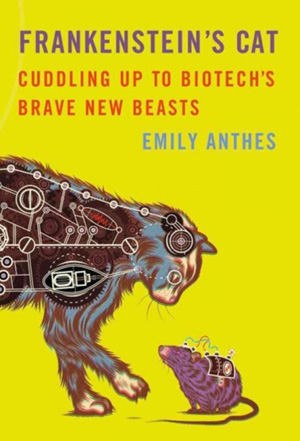
I appreciated Frankenstein's Cat for its fascinating explanation about the often baffling subject of bioengineering and its sister sciences. Emily Anthes explains the many sides of today's modern technology, such as gene modification, cloning, pharmaceutical products (from the farm), prosthesis, animal tag and tracking and gene cryogenics. This book provides a well-rounded summary of these complicated sciences without being boring or simply factual. Her real world examples take us on a journey from the farm, to the pet store and then from the pharmacy to the frozen arc.
Have you ever wondered if the neighborhood cat is spying on you? Read about Operation Acoustic Kitty and find out if this feline fantasy fiction or fact. Do you think bugs are creepy? What about a zombified cyborg beetle? Is Fido so special that you want two of him? Money can buy you an almost exact copy of your pooch BUT don't expect the same personality. Emily Anthes makes you crave more information. She makes you want to know the future of Earth's flora and fauna, as well as humanity itself.
I would highly recommend this book to anyone who desires a guide to the future of biological science and technology. Frankenstein's Cat is best read by the light of a glow-in-the-dark fish, while cuddling your favorite cloned dog and drinking a glass of genetically modified milk.
About Marsupials Review by Connor C., age 6, Boston Mensa
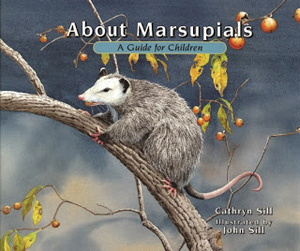
About Marsupials is the title so the book is about...marsupials, of course. It's non-fiction. I really think everyone would like the book. I think someone who likes animals would especially like to read it.
The glossary of facts in the back of About Marsupials is the most useful part. I thought the most interesting parts were that some marsupials have their pouch at their back legs and one marsupial, the Yellow-footed Rock Wallaby, is very small but can jump 13 feet wide!
Kids in the 4-8 age range would like this book. Even though it's not a story book, 4 year olds would like the few words on each page and they would love the beautiful pictures. But older kids would like it because of all the facts in the back of the book. There's a lot of information for each animal. I think boys and girls (and parents) would enjoy reading it. This book is very interesting. I give it 4 stars.
Mapping the World Review by Umar A., age 10, Central New Jersey Mensa
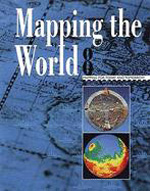
Every day, people around the world use maps. Whether it is an airplane pilot or businessman, housewife or museum group, maps have always and will continue to provide useful information for all.
Mapping the World talks about the uses of maps, as well as how to differentiate between the type of map projection and type of map.
In this series, we travel to the past and learn about historical mapmakers, from Claudius Ptolemy (who stated the idea that the Earth is at the center of the universe) to Gerardus Mercator (who created one of the most widely used map projections) and more. This series goes into tremendous detail on the cartographer's life and maps. We then journey to the present era to learn about map projections and the diverse types of maps used today. You might ask, "What is the difference between the two? They sound the same to me." No map projection is perfect, because you cannot really flatten a sphere into a rectangle. An uncolored projection could be used in many ways. We could use it for population concentration, highways, land elevation, and so many other things!
For example, we could make a topographic map of the U.S., which shows land elevation. We could make it a colorful map that shows the amount of pollution in different areas, or it could be a population map, or it could even be a map that shows the 50 states, their capitals and borders! Our last step in this amazing excursion is the near future, where we see some hypothetical solutions as to what maps will be used for. Currently, we are working on better virtual map technology.
Now, scientists have been able to put maps on phones. Back in the early 1900s, people had to lug a lot of maps around to find your way from place to place, or just keep asking for directions. Now, all the information is on a phone or global positioning system (GPS). It is amazing how much maps have changed technology and the world in this century.
The Mapping the World 8-book set goes into amazing levels of detail. It is a long read, but it gives an immense range and amount of information that you would not find in any other book or series on maps. The flowing way the chapters and books are organized makes it easy to link passages from different books in this series together. Mapping the World is a treasure box, filled with the seeds of cartography. Collect and plant them, and you soon will have the fruits of cartography, beneficial to those who want to be cartographers. Use this series to the utmost, then the fruits of mapping will be sweet for all who endeavor to succeed in cartography.
This series of lessons was designed to meet the needs of gifted children for extension beyond the standard curriculum with the greatest ease of use for the educator. The lessons may be given to the students for individual self-guided work, or they may be taught in a classroom or a home-school setting. Assessment strategies and rubrics are included at the end of each section. The rubrics often include a column for "scholar points," which are invitations for students to extend their efforts beyond that which is required, incorporating creativity or higher level technical skills.
- Library Home
- Library Guides
English Literature
- Book Reviews
Getting Started
- Full-Text Sources by Time Period
- Reference Sources
Do you want to know how a book was received by scholars? Are you trying to determine the quality of a particular book? Or, are you just interested in knowing if a book is worth reading? Book reviews are a great place to start. This guide provides guidance on finding two types of book reviews, those for a general audience and those for a scholarly audience.
Reviews for a General Audience
Literature and popular works (memoirs, travel writing, manuals, etc.) are often reviewed by journalists or fellow authors upon publication in newspapers or magazines. Use the following databases to find reviews in these publications.
- Book Review Index This link opens in a new window & more less... A comprehensive online guide to book reviews with over five million review citations from thousands of publications.
- Book Review Digest Plus This link opens in a new window & more less... Book Review Digest is a reference database that provides review excerpts and book summaries for current English-language fiction and non-fiction books. Limit of 1 simultaneous user.
- Book Review Digest Retrospective This link opens in a new window 1903-1982 & more less... Indexes and abstracts reviews of English language adult and juvenile fiction and non-fiction titles. Reviews are selected from journals in the humanities, sciences, social sciences and library review media.
Other Sources for Book Reviews
Many reviews are published in newspapers and magazines. Use the guides below to find the best databases to search for reviews in these publications.
- How do I find magazines? by Ask a Librarian Updated Feb 17, 2024 273 views this year
- How do I find newspapers? by Ask a Librarian Updated Apr 3, 2024 4009 views this year
Reviews for a Scholarly Audience
Scholarly books are reviewed in academic or peer-reviewed journals and are written by academics. As these reviews place the work in the context of current scholarship, they can take several years to appear after the book was published.
Starting Points
- JSTOR This link opens in a new window Recommended Starting Point . Use Advanced Search and limit to "Reviews". You can also limit by discipline. & more less... A database of back issues of core journals in the humanities, social sciences, and sciences. All issues of each journal are included in full-text except for the most recent 2-to-5 years.
- IBR Online This link opens in a new window & more less... Multilingual and interdisciplinary index to book reviews, chiefly in the arts, humanities and social sciences.
- Web of Science This link opens in a new window Conduct your search for book or author, and then limit to "Book Reviews". & more less... Authoritative, multidisciplinary content covers over 10,000 of the highest impact journals worldwide, including Open Access journals and over 110,000 conference proceedings. You'll find current and retrospective coverage in the sciences, social sciences, arts, and humanities, with coverage available to 1900. Includes the Science Citation Expanded, Social Sciences Citation Index, and Arts & Humanities Citation Index. Web of Science is especially useful for its citation linking.
- Periodicals Index Online This link opens in a new window & more less... Part of Nineteenth Century Index. Indexes the contents of thousands of periodicals in the humanities and social sciences from 1665 to 1995, including many European titles. Includes links to some full-text articles. Dates of full-text coverage vary by title.
- Humanities & Social Sciences Index Retrospective This link opens in a new window & more less... Database corresponds to International Index, 1907 - March 1965; Social Sciences & Humanities Index, April 1965 March 1974; Humanities Index, April 1974 March 1984; and Social Sciences Index, April 1974 March 1983
Other Databases for Book Reviews
We strongly recommend searching the article database or index that covers the academic literature in a specific field for reviews. Use the Advanced Search option and limit to "Book Reviews" or "Reviews". Find the best database for book reviews in your field by using our subject guides.
- Library Subject Guides
Book Review Indexes in Print
Below are a few print sources for finding book reviews.
- Combined Retrospective Index to Book Reviews in Humanities Journals, 1802-1974 & more less... 10 vols. Ed by Evan Ira Farber. Woodbridge: Research Publications, 1982-1984. Covers 150 literature, philosophy, classics, folklore, linguistics & music journals, from England and the US Organized by primary authors or editors and then by book titles.
- Literary and Historical index to American Magazines, 1800-1850 & more less... Ed by Daniel A. Wells & Jonathan Daniel Wells. Westport: Praeger, 2004.
Ask a Librarian
Publications with Book Reviews
- London Review of Books Library has on microfilm 1979 - present.
- New York Review of Books This link opens in a new window » more less... New York Review of Books reviews contemporary books in all subject areas.
- New Yorker Library has in print 1925 - present.
- Publishers Weekly Library has in print and microfilm 1873 - present. Recent issues available online via Find It!
- TLS: Times Literary Supplement Historical Archive This link opens in a new window » more less... Covers 1902-2006. This easy-to-navigate, fully-searchable resource is a witness to the cultural revolutions of the last 100 years and offers unparalleled opportunities for tracking the views of influential opinion-makers, the response of their peers, the controversies of the day and how they developed. --Publisher's website
- << Previous: Books & Primary Sources
- Next: Full-Text Sources by Time Period >>
- Subjects: English Literature , Humanities , Literature
- Tags: humanities , literary criticism , literature
- Updated: Mar 27, 2024 11:25 AM
- URL: https://guides.lib.uchicago.edu/english
- Report a problem
- Login to LibApps
Open sourcetools
- How To Write A Book Review
How to Write a Book Review: Tips for Writing a Book Review
A book review is an individual’s critique about what the book is about and what another reader can expect from it. In short, it is an individual’s thoughts on the book. It is written after you have read a book. It is a great way of letting fellow readers know about the book — let your readers know if the book is exciting or boring. Whether writing on social media or on your personal blog, try to make it informative and helpful to the readers.
To help you write a good book review, we have provided a few tips. Read the article and try writing a book review on your own.
Table of Contents
Topic or hook, essential information about the book, basic summary, praise and critiques, recommendations, tips for writing a book review, frequently asked questions on how to write a book review, what to include in a book review.
To write a review of a book and grab the audience’s attention, you will have to add the important points listed below.
- Topic or hook
- Essential book information
- Basic summary
- Praise and critique
- Recommendation
While writing a book review, keep in mind that the added information must be your own. It must be your personal opinion and review of the book.
A topic or a hook can be added in the very first sentence of the book review. It is like an introduction, which must be attention-grabbing and must sound interesting. The first sentence or the hook makes the readers want to read the review instead of scrolling past it. The hook can be a statement or a question that creates curiosity in the reader’s mind.
Mentioning the details of the book, like the name of the author, the title, the year of publication, etc. is essential. Keep in mind to add only the important details of the book rather than adding all the information. Do not forget to mention if the book is a part of any series, and whether they should read the other series before reading this book.
Share a storyline synopsis with your audience so they can get a sense of what the story is about. To prevent spoiling the suspense of the story for your audience, it’s best to leave out the book’s climax or finale, and avoid giving out spoilers. Remember that it is not a complete summary, so make sure you just give a short outline to the story and not the entire story.
For example, it is always better to just state that the plot has an unexpected twist instead of revealing the name of the villain or any such spoilers.
Summarising a book or a topic is easy but criticising the book is the most crucial part. You can say if the book was a good read or a bad read but that alone is not very helpful. You will have to mention the valid reasons why you would or would not recommend the book. Sharing your own thoughts and opinions will help your audience decide if they wish to read the book or not.
After you have shared your critiques, you can give your recommendation to people if they should read the book or not. Remember that your recommendations must have some valid reasons to prove that your recommendations are valid.
Your ratings shall matter to a lot of people. Nowadays, we all check the ratings of a particular product before buying it. Similarly, a lot of people check the ratings of a book before buying it. So before rating it, make sure to provide the rationale for the same.
- Keeping the Review Short and Crisp: A review is written to make the book understandable to the readers. Therefore, the length of the review is a matter of concern. Writing lengthy reviews can make it sound confusing to the audience.
- Proofreading and Editing: Make certain that your spelling and punctuation are correct. A review with numerous typos might be difficult to read and may not be regarded seriously.
- Do Not Use Harsh Language: You can give your honest reviews but also keep in mind that the writer has put in a lot of effort to write the book and to publish it. Be honest with your reviews but try to use mild language. Imagine yourself in the shoes of the author, and write accordingly, consider their feelings too. However, you should never let that affect your final judgement of the book.
What is a book review?
A book review is an individual’s critique about what the book is about and what another reader can expect from it. In short, it is an individual’s thoughts on the book.
Why is a book review important?
A book review is essential for the audience to know the ratings of a book. It lets the audience know if the book can be recommended to someone or not. The reader can get a brief idea of what the book is about.
Leave a Comment Cancel reply
Your Mobile number and Email id will not be published. Required fields are marked *
Request OTP on Voice Call
Post My Comment
- Share Share
Register with BYJU'S & Download Free PDFs
Register with byju's & watch live videos.
We earn a commission for products purchased through some links in this article.
The best books to read this month
From gripping thrillers to literary gems, here are some brilliant reads out this month.
With longer, lighter days and several bank holidays on the horizon - hooray! - there's hopefully more time for reading. Whether you want a page-turning thriller , a gripping historical novel or a feel-good read , we've got some great choices out this month.
You Are Here by David Nicholls
As a longtime fan of Nicholls’ writing, I had huge expectations for this book and it absolutely delivered. Michael and Marnie are two lonely people who meet on a coast-to-coast hike. Both come with a lot of baggage, but as they walk, they begin to open up to each other and develop a tentative friendship. I’m calling it now – this will undoubtedly be one of my best books of 2024.
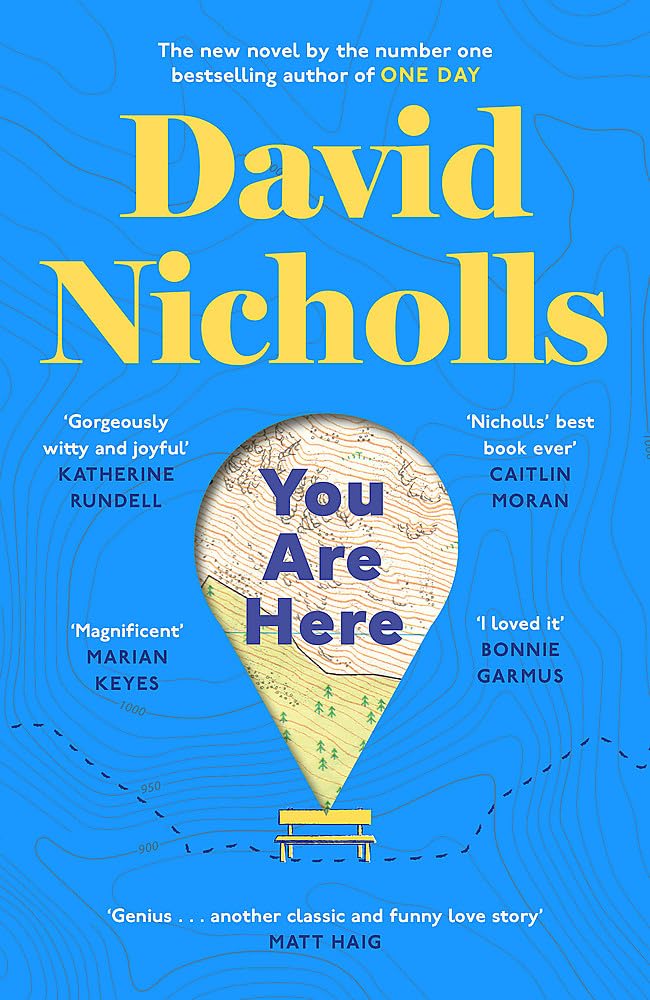
Mrs Quinn's Rise To Fame by Olivia Ford
Seventy-something Jenny Quinn and her husband have agreed it’s time to slow down, but when the opportunity to appear on TV show Britain Bakes comes up, she can’t turn it down. This warm-hearted book is full of delicious descriptions of food, and a powerful message about it never being too late to try new things.
Mrs Quinn's Rise to Fame by Olivia Ford
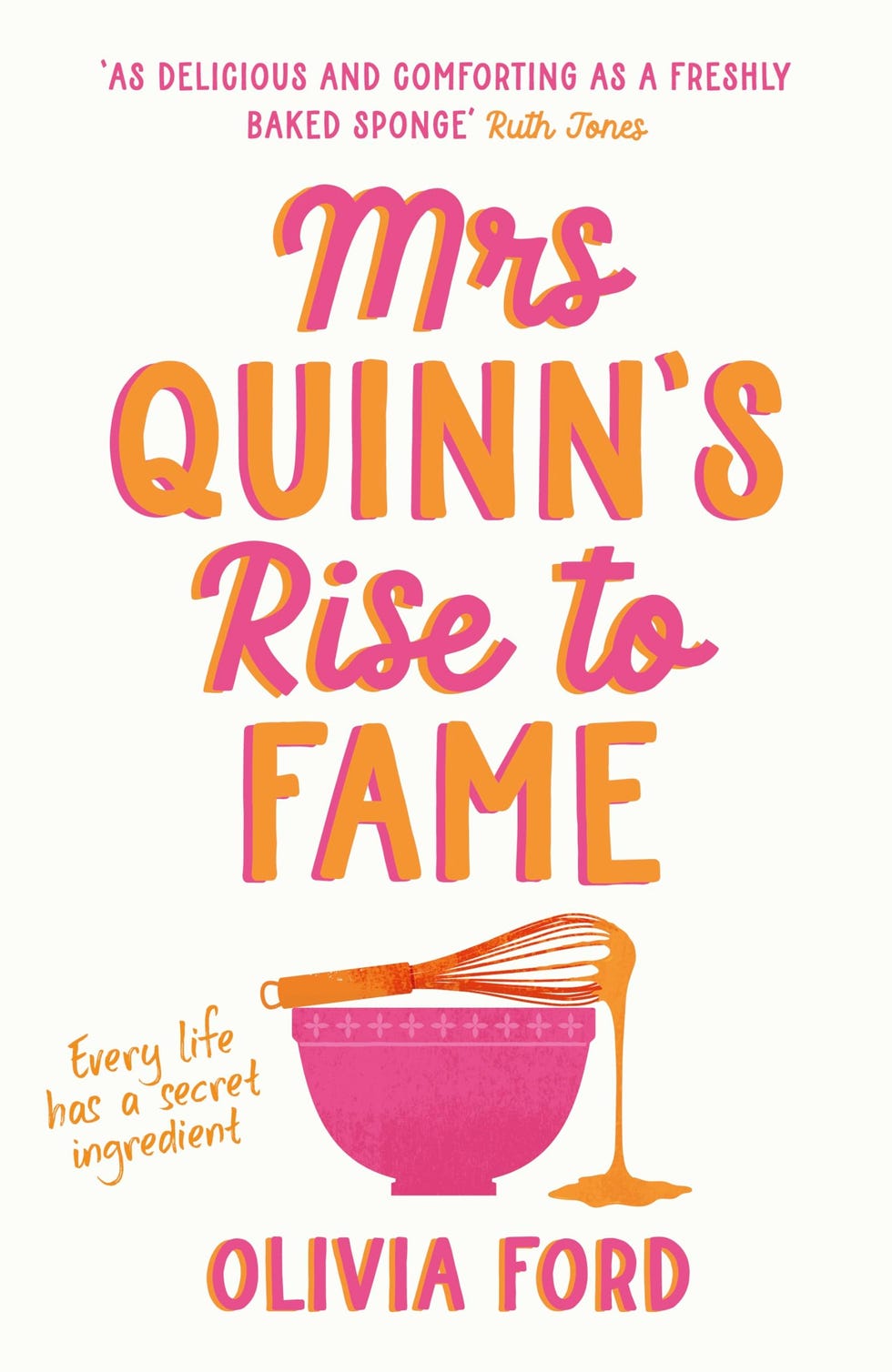
Hagstone by Sinéad Gleeson
When artist Nell is commissioned to create a piece for a mysterious community of women called the Inions (old Irish for ‘daughters’), who live on an isolated island, she uncovers some of their shocking practices. A hugely atmospheric novel, with sensuous descriptions of the landscape that are so beautiful, you’ll picture yourself there.
Hagstone by Sinead Gleeson
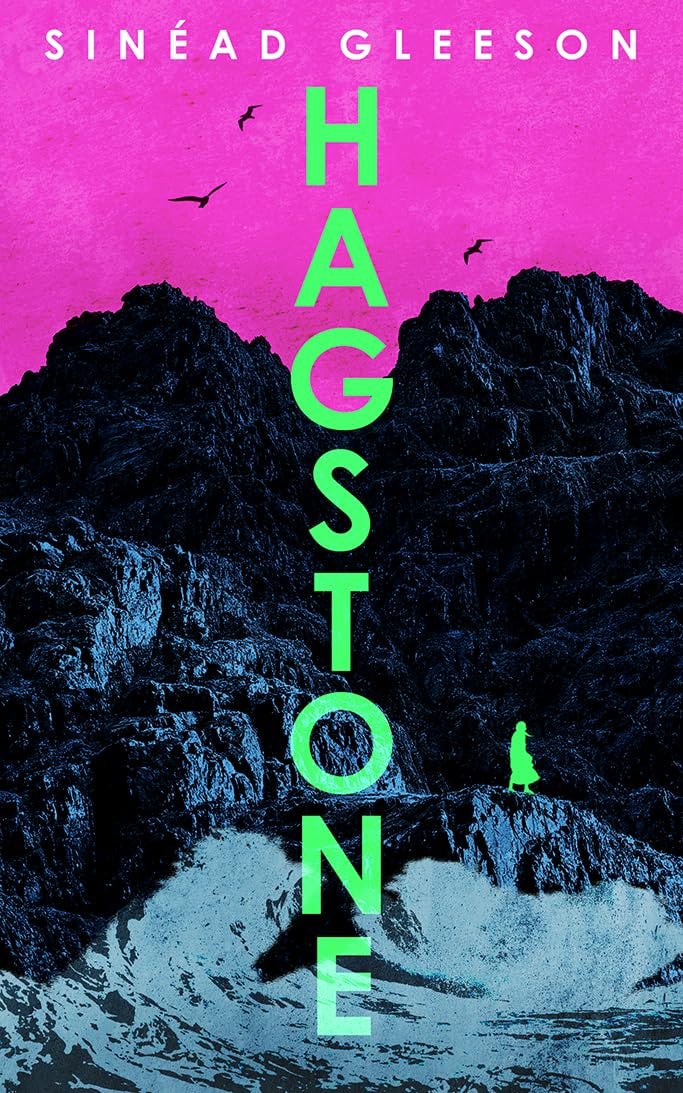
The Household by Stacey Halls
The winner of the 2022 Women’s Prize for Fiction and Good Housekeeping Futures award returns with her fourth historical novel. Based on the real-life Urania Cottage, the house set up by novelist Charles Dickens to rehabilitate women who’d been in prison, this is compelling and richly detailed.
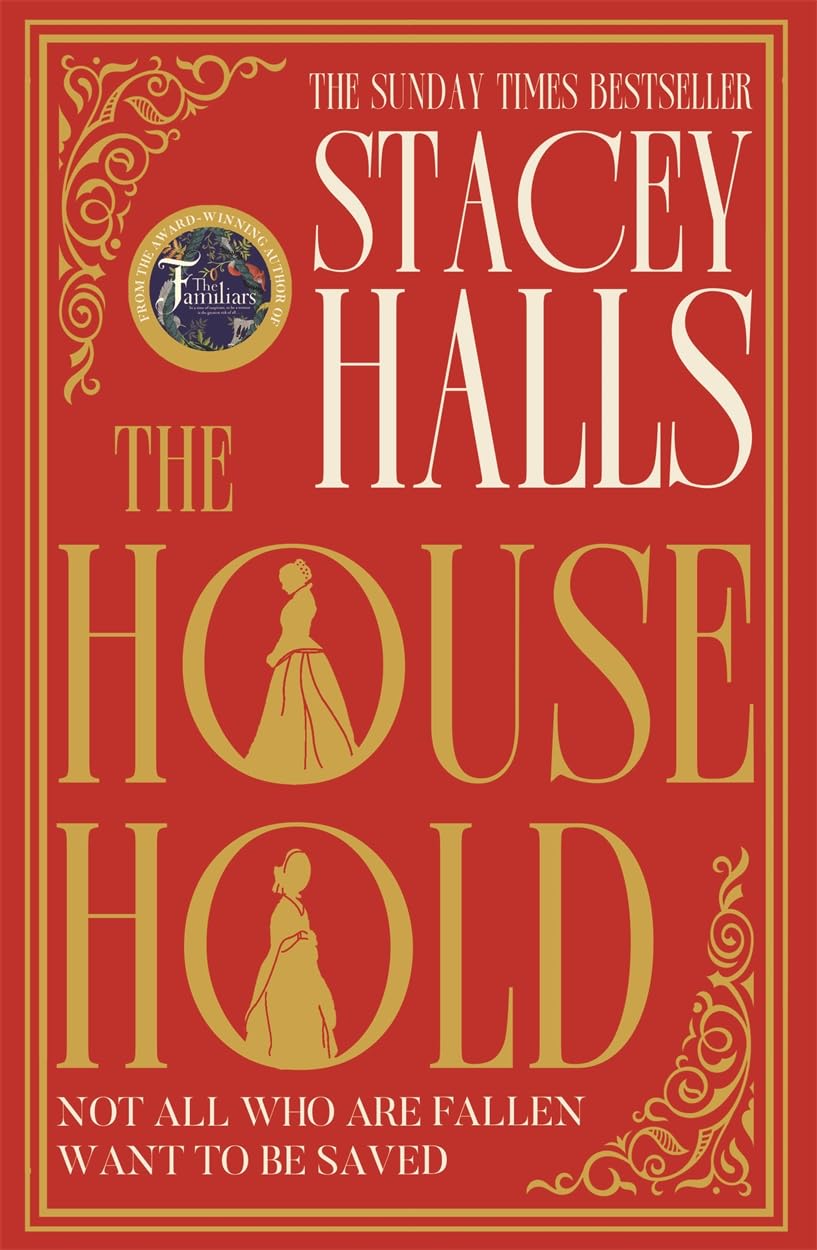
Prepare to shed some tears while reading this gorgeously tender story about friendship and love in all its forms. Birdie is still grieving the death of her husband and twin sister when she receives a cancer diagnosis. Her illness throws her together with two neighbours, both also struggling in their own ways, who form a circle of support.
Goodbye Birdie Greenwing by Ericka Waller
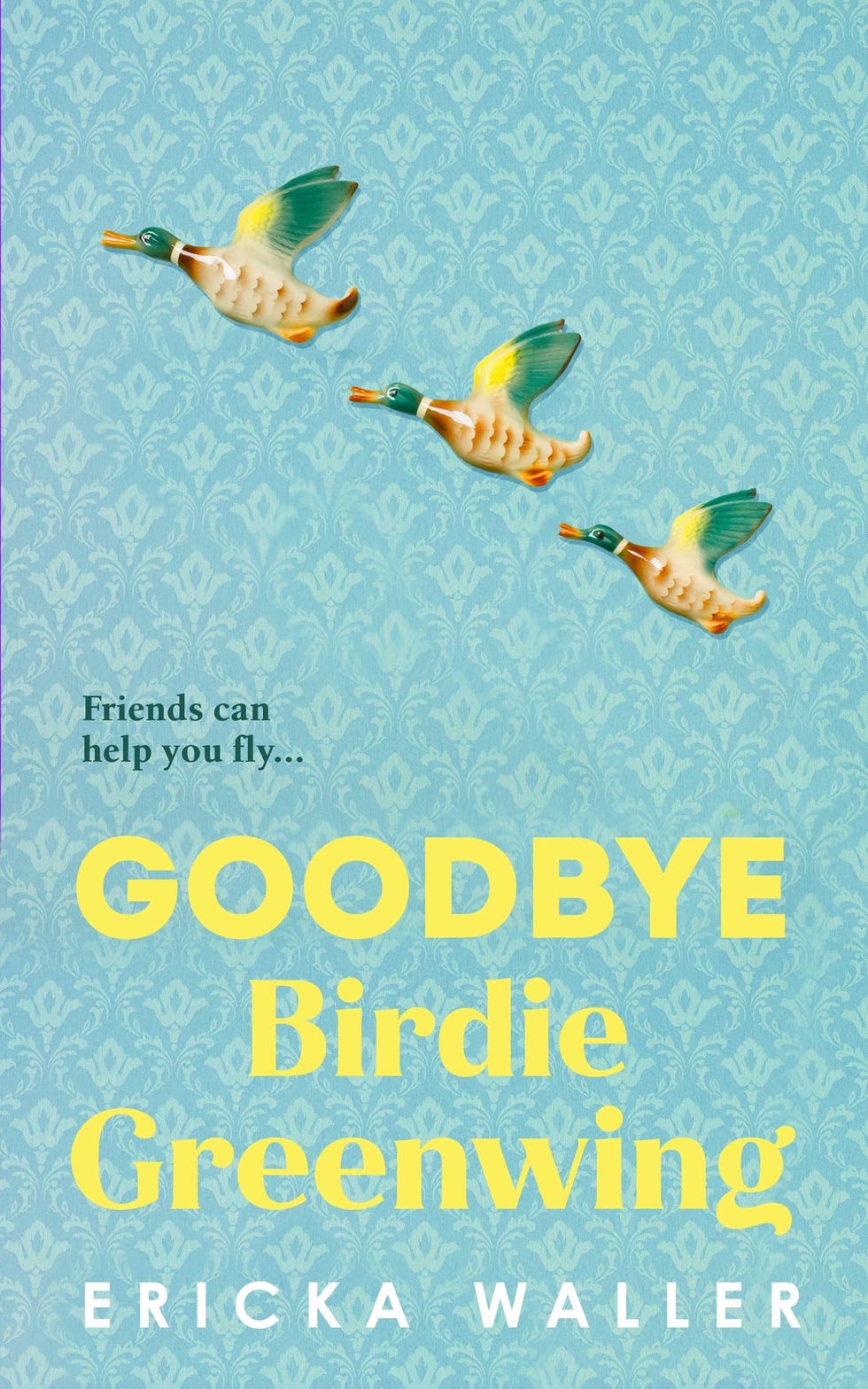
The Sleepwalkers by Scarlett Thomas
After a chaotic wedding, Evelyn and Richard find themselves the only guests at a small Greek beach resort where a couple tragically drowned the previous summer. As Evelyn tries to piece together what happened, events take a more sinister turn. Told mostly through notes and letters, this original thriller has plenty of surprises.
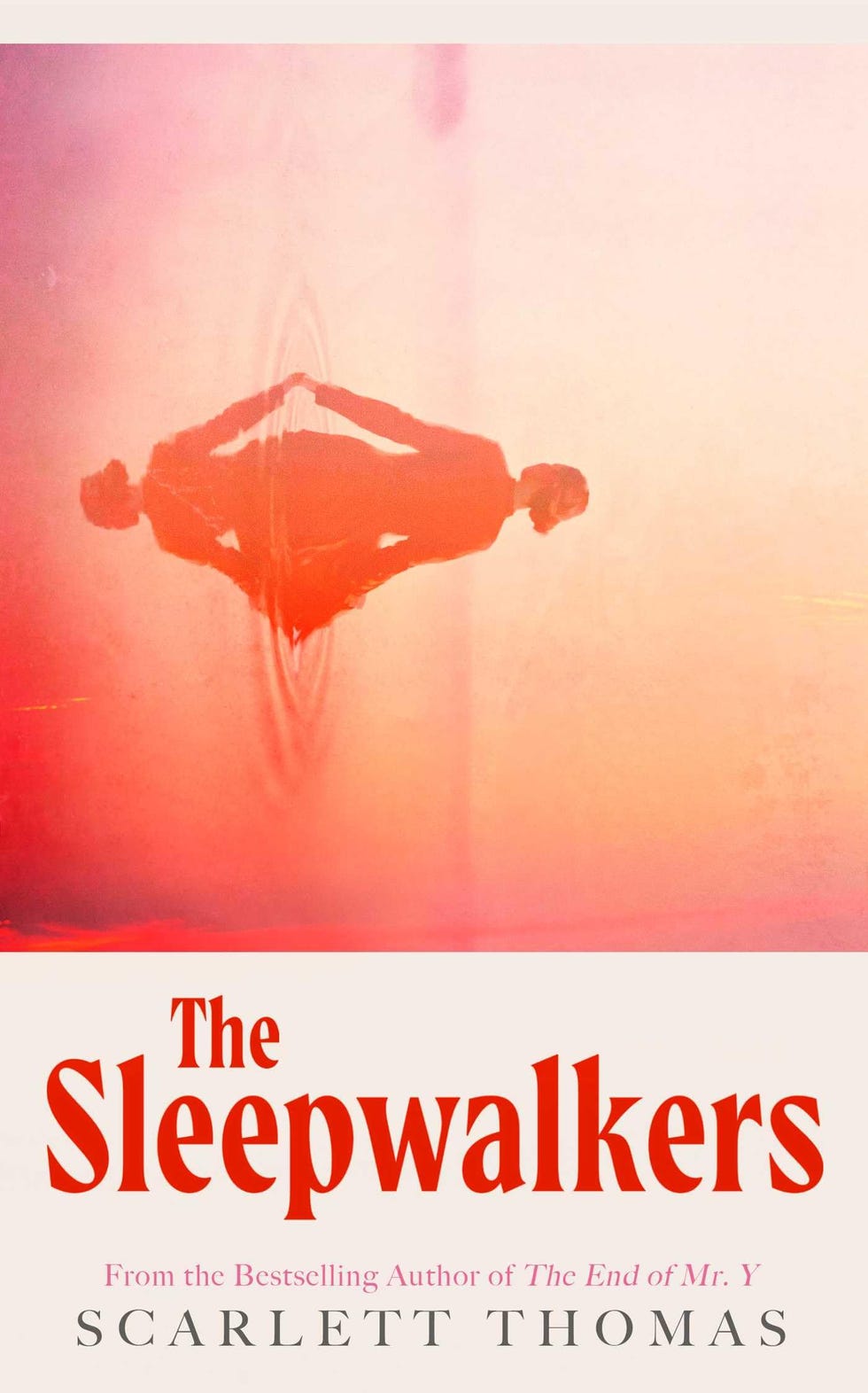
The Night In Question by Susan Fletcher
Oh, how I loved 87-year-old Florrie, the charming armchair detective at the centre of this gentle mystery. When a member of staff at her care home falls from a window, it’s declared an accident, but Florrie is unconvinced. One for fans of Elizabeth Is Missing .
The Night in Question by Susan Fletcher
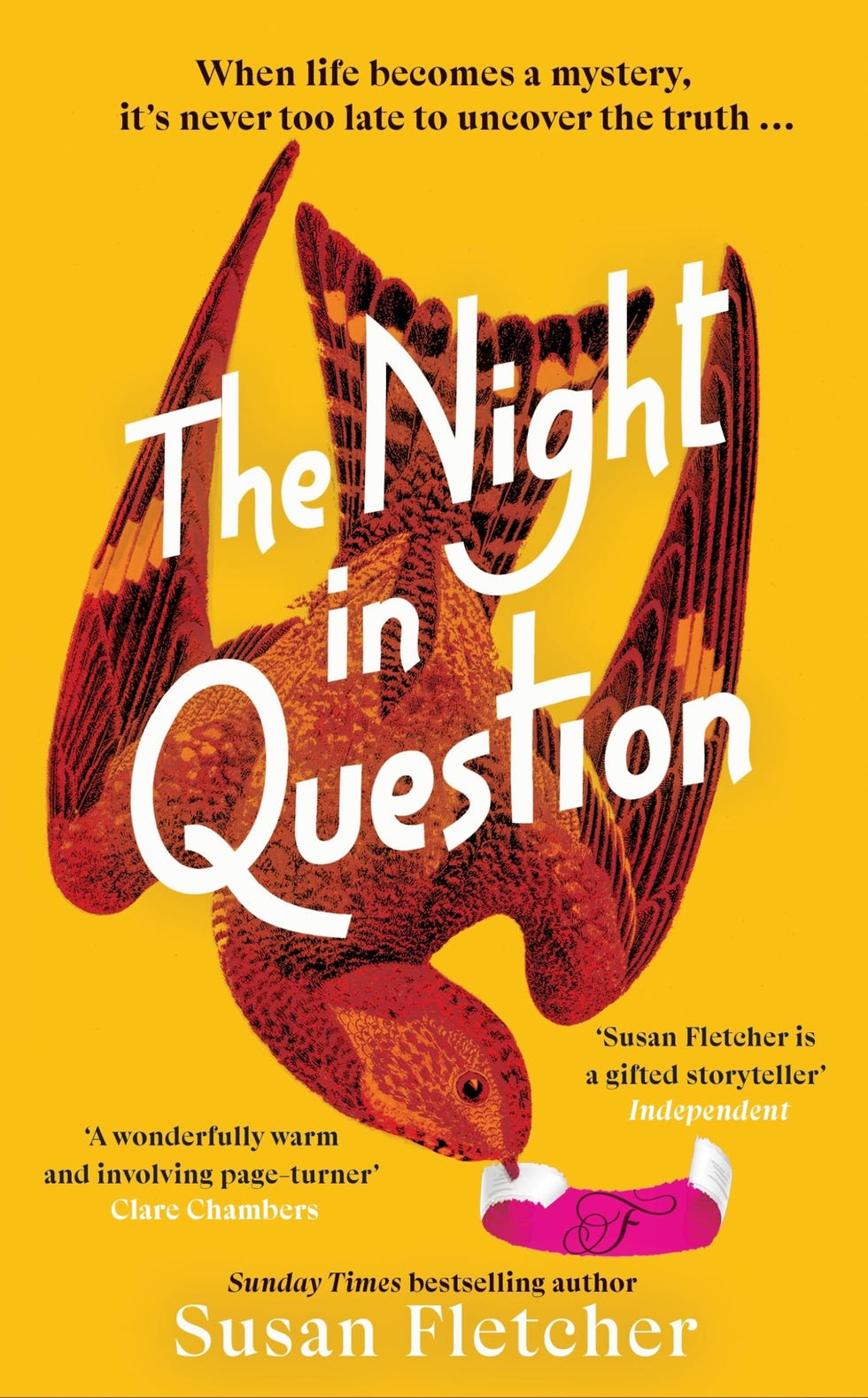
Day One by Abigail Dean
The author of Girl A returns with a thoughtful yet gripping drama that focuses on the aftermath of a school shooting in a small Lake District community. As the town tries to understand what happened, questions are raised and some begin to believe the whole thing was a hoax.
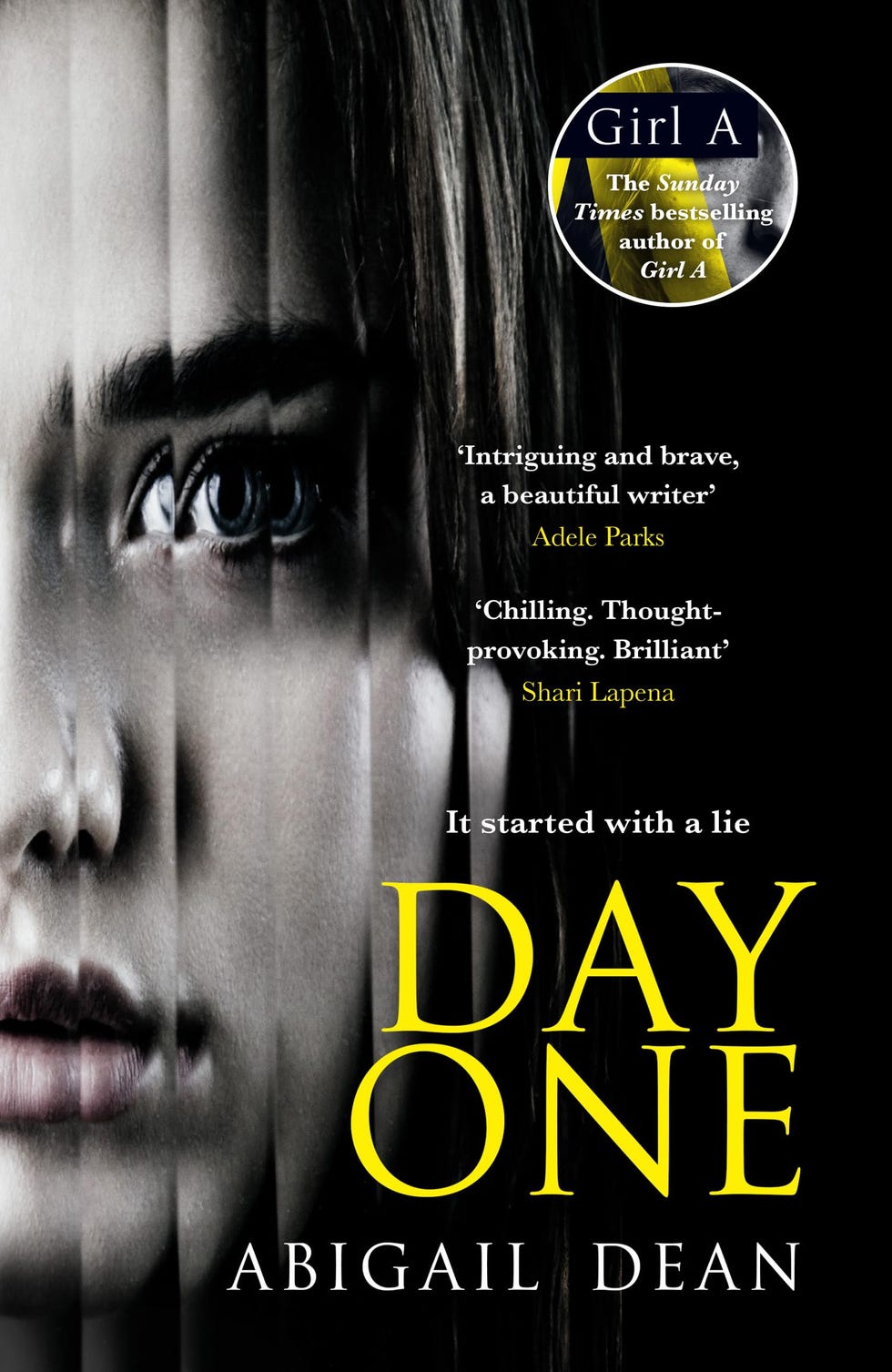
As Young As This by Roxy Dunn
Dunn’s debut novel, which combines lyrical writing with a very relatable main character, marks her out as a rising star. On the brink of a big decision, Margot reflects on the men she has loved and how each relationship has shaped her.
As Young as This by Roxy Dunn
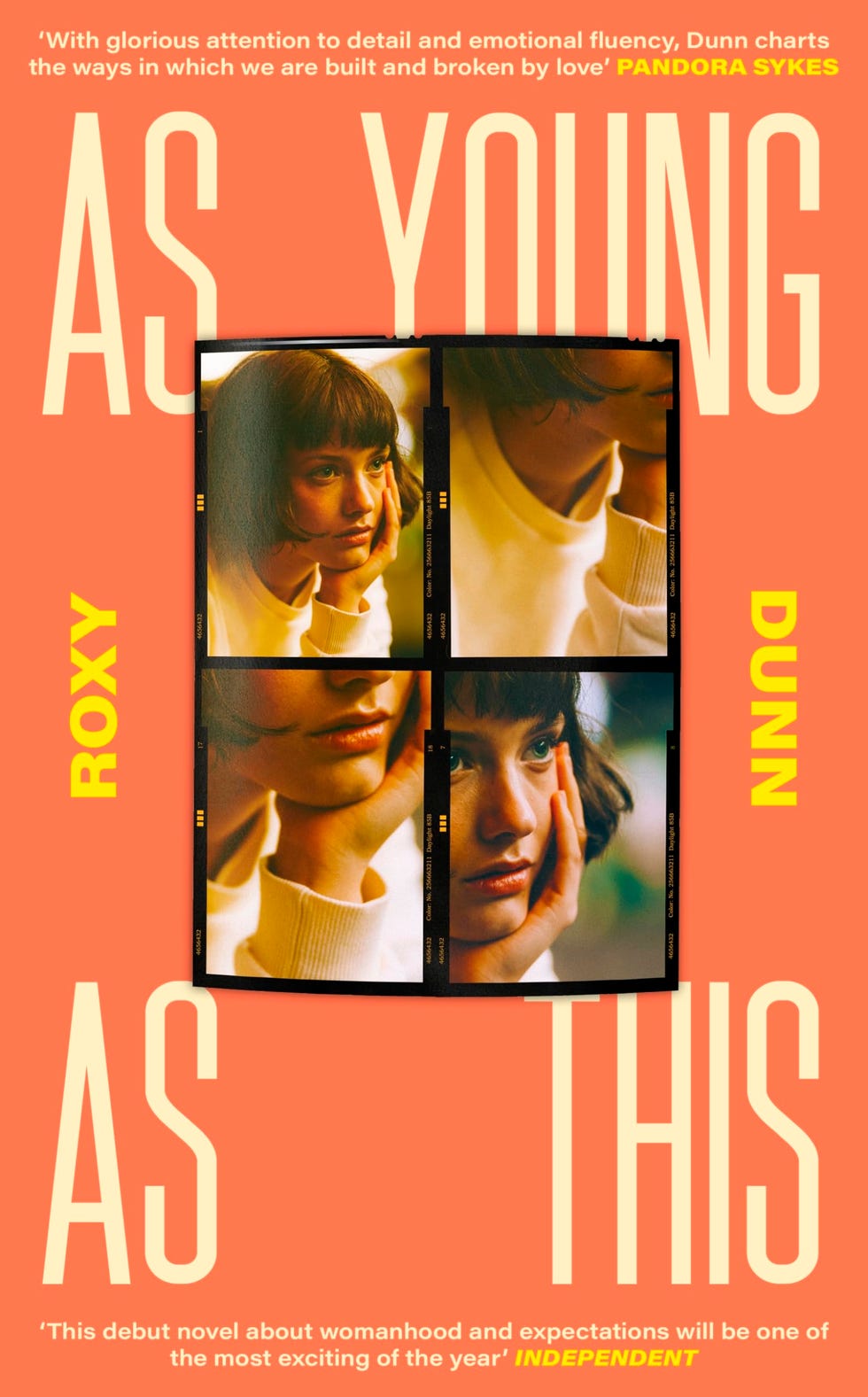
The Hypocrite by Jo Hamya
The relationship between a father and his daughter is at the heart of this sharp, insightful read. In London in 2020, Sophia is debuting her first play, while in the audience her dad discovers he is its subject – and what unfurls before him is not flattering.
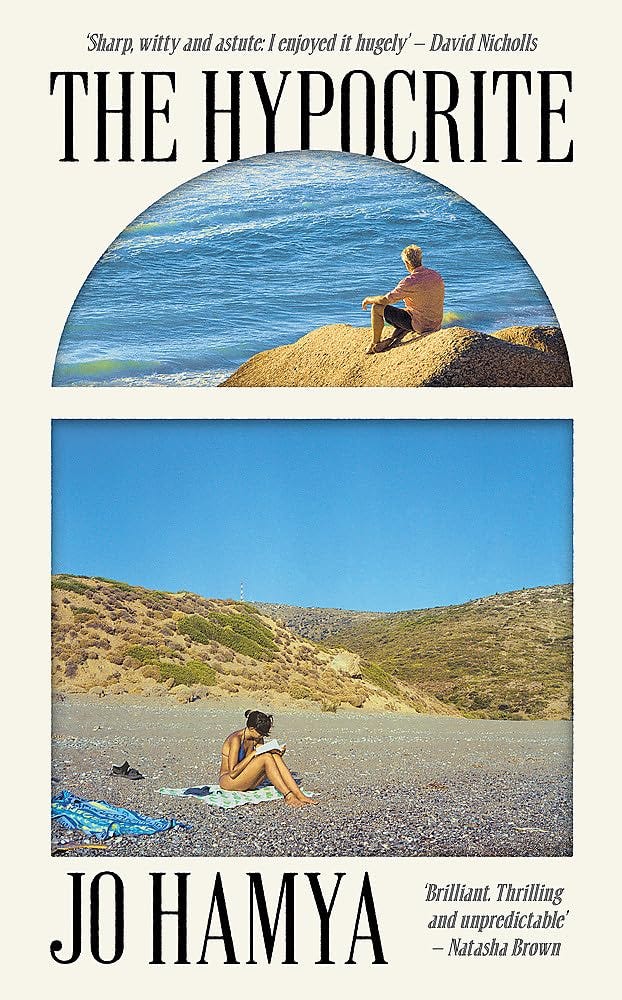
@media(max-width: 64rem){.css-o9j0dn:before{margin-bottom:0.5rem;margin-right:0.625rem;color:#ffffff;width:1.25rem;bottom:-0.2rem;height:1.25rem;content:'_';display:inline-block;position:relative;line-height:1;background-repeat:no-repeat;}.loaded .css-o9j0dn:before{background-image:url(/_assets/design-tokens/goodhousekeeping/static/images/Clover.5c7a1a0.svg);}}@media(min-width: 48rem){.loaded .css-o9j0dn:before{background-image:url(/_assets/design-tokens/goodhousekeeping/static/images/Clover.5c7a1a0.svg);}} Book Reviews
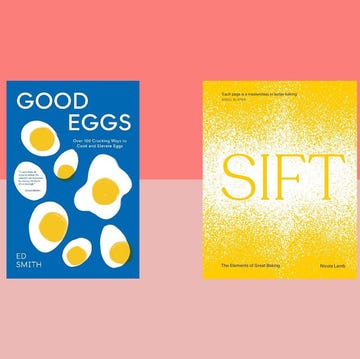
All the best new cookbooks to buy now
13 best romance novels
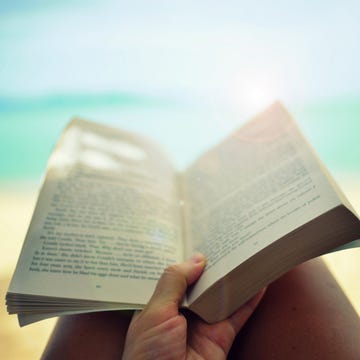
Books for every holiday destination

How I write: Cathy Rentzenbrink
The best Amazon Spring Day books deals
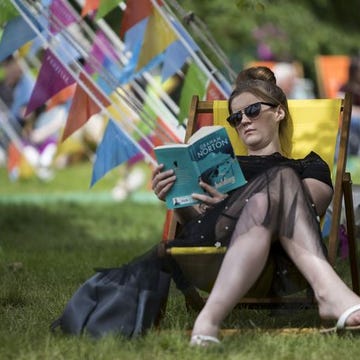
12 best book festivals
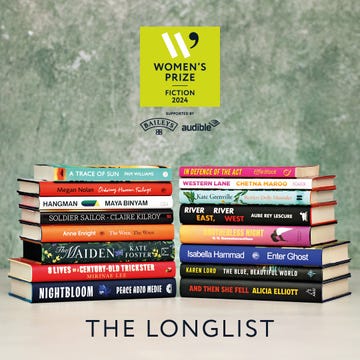
Women's Prize for Fiction longlist is here
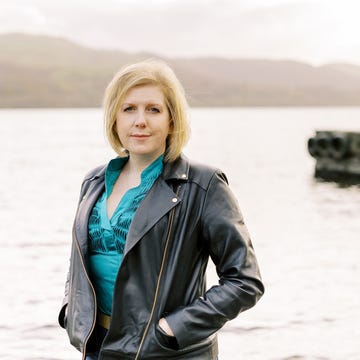
How I write: Clare Mackintosh
The best books to give on Mother's Day
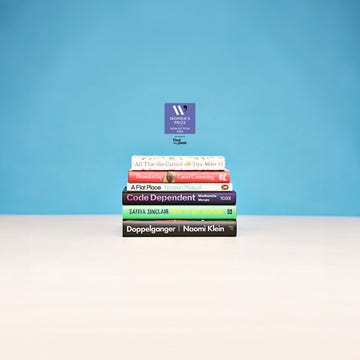
Women's Prize for Non-Fiction shortlist announced

How I write: David Nicholls
Advertisement
Supported by
editors’ choice
6 New Books We Recommend This Week
Suggested reading from critics and editors at The New York Times.
- Share full article
Our recommended books this week include two satirical novels — one about identity politics and victimization, the other about artificial intelligence and gender roles — along with Tana French’s second crime novel about a Chicago police officer who retired to the Irish countryside. In nonfiction, we recommend the story of a deadly avalanche, a philosopher’s exploration of the concept of giving up, and the gratifyingly intimate audio version of Barbra Streisand’s recent memoir, which she narrates herself. Happy listening, and happy reading. — Gregory Cowles
MY NAME IS BARBRA Barbra Streisand
Certain of the, shall we say, eccentricities (oh … the ellipses!) in Streisand’s 992-page doorstop of a memoir get wonderfully ironed out in audio form. Its sprawling a-star-is-born anecdotes seem to find their natural form in the towering performer’s 48-plus hours of discursive, disarming and often gloriously off-the-cuff narration.

“As Streisand recites the story of her life … she ad-libs off the written text, splices sentences, audibly shakes her head at dubious decisions, and altogether places us opposite her on the sofa with a cup of coffee for a two-day kibitz.”
From Zachary Woolfe’s review
Penguin Audio | 48 hours, 17 minutes
VICTIM Andrew Boryga
Boryga’s debut is a lively social satire about the fetishization of victimhood, following a young working-class student, Javi, who uses exaggerated stories of tragedy to earn attention and success. Boryga is having fun, and he’s inviting us to join in.

“Let’s be clear: Though Boryga is playing, he’s not playing around. Through Javi’s story, Boryga humorously and scathingly calls out the gluttonous consumption of stories of victimhood.”
From Mateo Askaripour’s review
Doubleday | $27
ANNIE BOT Sierra Greer
On the surface, “Annie Bot” is a story about an A.I. sex robot that grows more and more sentient, but underneath this high-tech premise is a sharp and smart exploration of misogyny, toxic masculinity, selfhood and self-determination.

“A brilliant pas de deux, grappling with ideas of freedom and identity while depicting a perverse relationship in painful detail.”
From Lydia Kiesling’s review
Mariner | $28
ON GIVING UP Adam Phillips
In his latest book, Phillips’s exploration of “giving up” covers the vast territory between hope and despair. We can give up smoking, sugar or a bad habit; but we can also give up on ourselves. Phillips proposes curiosity and improvisation as antidotes to absolute certainty.

“Phillips doesn’t try to prevent us from thinking whatever it is that we want to think; what he does is repeatedly coax us to ask if that’s what we really believe, and how we can be sure.”
From Jennifer Szalai’s review
Farrar, Straus & Giroux | $26
THE DARKEST WHITE: A Mountain Legend and the Avalanche That Took Him Eric Blehm
In January 2003, seven skiers and snowboarders were killed in an avalanche on a glacier in western Canada. Among them was the American snowboarder Craig Kelly, and the adventure writer Blehm turns this page-turner not just into a biography of the athlete, but a tribute to the sport itself: addictive, thrilling — sometimes deadly.

“Probably the most unremittingly exciting book of nonfiction I have come across in years. I found myself reading late into recent nights wholly transfixed by every paragraph, every word.”
From Simon Winchester’s review
Harper | $32
THE HUNTER Tana French
For Tana French fans, every one of the thriller writer’s twisty, ingenious books is an event. This one, a sequel to “The Searcher,” once again sees the retired Chicago cop Cal Hooper, a perennial outsider in the Irish west-country hamlet of Ardnakelty, caught up in the crimes — seen and unseen — that eat at the seemingly picturesque village.

“The novel’s greatest pleasures — genuine twists aside — reside in the specific intersection of outsider and native, and particularly the former’s determined need to idealize, to claim, to tint whole rivers green.”
From Sadie Stein’s review
Viking | $32
Explore More in Books
Want to know about the best books to read and the latest news start here..
What can fiction tell us about the apocalypse? The writer Ayana Mathis finds unexpected hope in novels of crisis by Ling Ma, Jenny Offill and Jesmyn Ward .
At 28, the poet Tayi Tibble has been hailed as the funny, fresh and immensely skilled voice of a generation in Māori writing .
Amid a surge in book bans, the most challenged books in the United States in 2023 continued to focus on the experiences of L.G.B.T.Q. people or explore themes of race.
Stephen King, who has dominated horror fiction for decades , published his first novel, “Carrie,” in 1974. Margaret Atwood explains the book’s enduring appeal .
Do you want to be a better reader? Here’s some helpful advice to show you how to get the most out of your literary endeavor .
Each week, top authors and critics join the Book Review’s podcast to talk about the latest news in the literary world. Listen here .

Covering books and digital resources across all fields of history
ISSN 1749-8155
Black Africans in Renaissance Europe

This book might come as a surprise for non-specialists, since black Africans are identified with slave trade to the Americas, while the Renaissance is regarded as a purely European phenomenon, centred on a largely homogeneous ethnicity. Neither of these assertions is true, and this excellent book helps to deconstruct such historical stereotypes. Europe received black Africans regularly and in significant numbers from the mid-fifteenth century onwards. The Mediterranean was a cross-cultural and inter-ethnic space even before Classical Greece. The Renaissance reflected not only the rediscovery of classical culture, but also the influx of techniques and ideas brought by the Arabs. Intercontinental navigation revealed simultaneous processes of cultural renovation, which helped to reshape Europe.
At the outset of the volume, Kate Lowe defines the editors’ key question: how were the main stereotypes concerning black people established in this period? She provides several examples relating to the main set of prejudices: the African was generally identified as a naked person who would mutilate his/her face and body with scarification, piercings, and tattoos; he/she would be considered as carefree and characterized by immoderate laughter, unaware of his/her condition, lazy and sexually promiscuous, physically strong, a good musician or dancer. Lowe recognizes the existence of noble or ennobled black men in European courts, but she stresses the role of black people as a necessary counter-image in the construction of European whiteness and ‘civilization’ (a notion coined in the eighteenth century). This is a necessary starting point, although some of the chapters develop a more nuanced vision of race relations in this period.
Anne Marie Jordan, for instance, has a fine chapter on slaves in the Lisbon court of Queen Catherine of Austria, where mainly women and children of different ethnic origins were used as musicians, cooks, pastry chefs, housekeepers, pages, or servants in royal apothecaries, kitchens, gardens, and stables. Jordan points out how white Moorish slaves were favoured because of skin colour prejudices, but black slaves were considered trustworthy for religious reasons. The black slaves were a sign of social prestige and distinction in a cosmopolitan court: this feature explains why Catherine spent so much money clothing and offering them as exotic gifts to her favourite ladies and relatives in other European courts. The representation of small black slaves in the portraits of Iberian princesses, as in the painting of Juana de Austria by Cristóvão de Morais, reinforced their image as symbols of empire building.
Jorge Fonseca presents the results of his research on sixteenth-century Southern Portugal, where he estimates a total of six to seven per cent of blacks in the population, mainly in urban areas, in contrast with the Northern region, where blacks were scarce. His analysis of the perceptions of black people by Nicholas Cleynaerts, a Flemish scholar who taught in Louvain, Paris, and Salamanca, spending several years in Portugal as tutor of infant Henry (the future cardinal and General Inquisitor), is less convincing. The scholar is presented as an ‘exotic visitor’, which is misplaced, since he belonged to the international Renaissance elite who circulated between different European countries. Cleynaerts bought young slaves and taught them as assistants. His observation that they were like ‘monkeys’ (meaning capable of imitating but not of creating) is considered by Fonseca as a sign of the contrast between two societies, the Flemish and the Portuguese, the first unaware of black people, the second used to them. It is disputable that Cleynaerts’ classification of the young slaves as ‘monkeys’ was his own, and not influenced by the Portuguese, but the implicit assumption that the Portuguese were less ‘racist’ than the Flemish is questionable.
Didier Lahon proposes an interesting analysis of the mixed confraternity of Nossa Senhora do Rosário in Lisbon, which split into two branches of white and black members. The conflict that existed between them for more than one century, and the final victory of the white branch in 1646, is interpreted as a shift from a relatively tolerant society, open to manumission (one of the privileges of the confraternity) and to intervention against bad treatment of slaves, to a more rigid and intolerant society in the seventeenth century. The implementation of the obligatory baptism of slaves throughout the second half of the sixteenth century is also reconstituted in detail. The analysis of the impact of the notion of blood purity in Portugal is much less convincing, with a deficient chronology and huge gaps, while comprehensive studies are ignored. The idea that the Iberian Peninsula dealt with the presence of Moors, Jews, and New Christians as an anomaly from 1350 onwards is simply wrong, as Maria José Ferro Tavares and Maria Filomena Lopes de Barros have demonstrated.
Thomas Earle focuses his study on the work of Afonso Álvares, a mulatto poet and playwright, cautiously alerting the reader to the lack of evidence to prove that they were one and the same person. Álvares is one of the few mixed-race intellectuals in Europe in the sixteenth century. He wrote satirical poems and four plays based on saints’ lives, commissioned by the Augustinian canons of São Vicente de Fora in Lisbon. Earle discusses the quality of the plays and convincingly refuses the historical devaluation of the writer, who has been seen as a minor disciple of Gil Vicente. A particularly interesting section concerns the polemic in satirical redondilhas between Afonso Álvares and another poet, António Ribeiro Chiado. Álvares accused Chiado of low birth and immorality. Chiado insulted Álvares in racist terms, accusing him of being a mulatto, son of a black woman, a slave freed by marriage. Álvares underlined the nobility of his father—whose identity was never disclosed; it might have been Dom Afonso de Portugal, bishop of Évora, in whose household Álvares was educated. In his plays, Álvares reflects the dominant anti-Semitic mood. There is sufficient material here for a deeper reflection on the racial prejudices of the Portuguese Renaissance society and on the conflicting mechanisms of social promotion among subaltern groups.
Jeremy Lawrence presents a very good overview of the Black Africans in Spanish literature, identifying the main ideas: dehumanization of slaves as chattels, defined by bestiality, nakedness, lascivious vulgarity, burlesque behaviour, pidgin language. He focuses his study on the ‘habla de negros’ enlarging the already significant bibliography on the subject (the crucial study by Paul Teyssier on Gil Vicente could have been mentioned). The author selects less known texts and provides two excellent critical editions of pliegos in the appendix. The originality and subversive meaning of the poems is brought out clearly in this chapter, since they staged strong black characters with unconventional relations with white women. Baltasar Fra-Molinero is another author who has extensively written on blacks in Spanish literature, and has contributed to changing the field. He has shown how this marginal and neglected topic played an important role in the sixteenth and seventeenth centuries. Here he concentrates on Juan Latino, the only black Latinist, scholar, and writer in the European Renaissance, who lived in Granada. He has previously pointed out how Juan Latino reflected on the black condition and refused a social hierarchy based on skin colour prejudices. Fra-Molinero analyses now the poem Austrias Carmen , dedicated by Juan Latino to Juan de Austria after his victory over Morisco insurrection in Granada, known as the War of the Alpujarras (1568–1572). In the text, Latino searched to establish the dignity of all black Africans, relating them to biblical Ethiopia and refusing the idea of natural slavery. He imagines white people subordinated in Ethiopia (a reversed irony) and exalts blackness in the final verses.
Debra Blumenthal addresses a very interesting issue: the role of a black African confraternity in Valencia founded in 1472 by forty black freedmen that collected alms and negotiated contracts of manumission on behalf of their fellows in captivity. She knows the context of slave trade in Valencia well, the variety of the black community in the town, and the functions of the confraternity (‘casa dels negres’) as shelter, hospice, and hospital. She analyses two cases of manumission, concerning Ursola and Johana, in which all the financial, juridical, and social difficulties are analysed, as well as the subsequent barriers to full integration.
Aurelia Marín Casares, who has written a very good book on slavery in Granada, presents here part of her enquiry into free and freed black Africans in the region. She has identified most of their occupations: men were stable workers, esparto workers, smelters and casters in foundries, carriers and vendors of water or firewood, bakers, butchers, hod carriers, builders, diggers, pavers; women were housewives, farmers, embroiders, maids, taverns and inns employees, sorceresses. The author details the confraternities created by blacks and mulattos in Granada. The notion of blackness and the different types of black people do not become clear in this article, however, since in many cases Moriscos were considered black by the Christian population.
The ‘Italian section’ is one of the most interesting in the book. Paul Kaplan argues that Isabella d’Este and Andrea Mantegna created a new iconographic type: the black attendant to a white European protagonist. In his opinion, Judith’s servant was depicted as black for the first time by Mantegna in a drawing from 1492. As the author points out, this idea of displaying black servants to suggest the universal reach of imperial power had already been coined by Frederick II. Kaplan stresses the diffusion of this idea among European rulers, namely the Aragonese kings of Naples or the ruling houses of Ferrara, Mantua, and Milan, in which black servants were used as human accessories and depicted as such. The only problem in this stimulating chapter is the uniform definition of ‘blackness’, while in several paintings (see for example the Allegory of Virtue by Correggio) there is a gradation of skin colour from black to brown.
John Brakett suggests that Alessandro de’ Medici, the first duke of Florence (1529–1537) was of mixed race, an illegitimate son of Lorenzo de’ Medici, duke of Nemours and ruler of Urbino (and a direct descendent of Lorenzo ‘il Magnifico’ and Cosimo ‘il Vecchio’) and a peasant woman, a freed slave, generally considered as a ‘Moor’, but now depicted as a Black African. The argument is based not on new documents but on the analysis of the set of images of Alessandro de’ Medici. The problem lies in the final conclusion: the author considers that there was no intellectual racism in the sixteenth century, since the duke was murdered under the accusation of being a tyrant, but his racial status was not used in political debate or in denigration of his memory, which proves the supremacy of the innate quality of princes. This is an open issue: as the author mentions in his text, the duke was nicknamed ‘the Moor’ and ‘the mule’ of the Medici in his lifetime, which suggests a more complicated picture.
Sergio Tognetti concentrates on the trade in black African slaves in fifteenth-century Florence. The percentage of East European slaves in North Italian cities was quite important by the end of the fourteenth century, mainly in Genoa (nearly ten per cent) due to the Genoese trading communities in the Black Sea, but the fall of Contantinople in 1453 ended this commercial exchange. The slave trade in black Africans spread throughout the fifteenth century, replacing the previous trade. Networks also changed, from Arab merchants to Portuguese ones. This careful research, based on the account books of the Cambini bank, shows the value of slaves (proving also how whiter skin was more appreciated than darker skin) and the overwhelming control of the market from Lisbon, confirming the role of Bartolomeo Marchionni as the biggest slave trader in those days.
The pastoral care of black Africans in Renaissance Italy is the subject of Nelson Minnich’s chapter. The zigzag policies of the Popes from Martin V to Paul III is well documented, with successive bulls prohibiting the African slave trade (1425) and black slavery (1462), then allowing the trade with captive people (1455, 1456, 1493), and finally condemning the enslavement of native American people (1537), while the citizens of Rome were authorized to hold slaves (1548). The creation of black confraternities in Naples, Palermo, and Messina was a result of the activity of different religious orders among slaves and freedmen. The access of black people (slaves and freedmen) to the sacraments of penance, communion, and marriage is well documented, while the ordination of black priests was very rare—one Ethiopian and one Congolese bishop, suggested by the Portuguese king in 1513, were exceptional cases.
Anu Korhonen addresses the crucial proverb ‘washing the Ethiopian white’ in Renaissance England. It became a metaphor for everything considered useless, irrational, and impossible. It was widespread in England, although the relatively frequent literary references to black people in literature were brief and stereotyped. Africans were explicitly related to apes, defined by unruly sexuality, a lack of reason, violence, and ugliness (English is the only language in which the same term, fair, is used for beauty and blondness). Although Korhonen quotes an impressive range of sources, some of them from a very early period, it would have been interesting to establish the turning point of the process of construction and diffusion of the stereotype.
Lorenz Seelig studies the fascinating case of the ‘Moor’s Head’ produced circa 1600 by the Nuremberg goldsmith Christoph Jamnitzer. It shows the features of a young African with full lips, broad nose, and curled hair, with a headband chased with eight ‘T’s. It as a heraldic work of art representing the armorial bearings of the Florentine Pucci family, coupled with the coat of arms of the Florentine Strozzi family. This splendid object, made of silver and rock crystal, is also a drinking vessel: the upper part of the head can be taken off, like a cover. Seelig relates the object to the German tradition of drinking vessels, the double sense of the word kopf and the practice of drinking from human skulls (relics of saints), which is documented until the late-eighteenth century. He points out that, outside of the ecclesiastical sphere, profane drinking vessels were considered signs of moral decadence such as in the tradition of fools’ head cups. Cups, jugs, or oil lamps were represented as black Africans (Seelig indicates an early example from the workshop of Andrea Ricci, circa 1500, with deformed face, open mouth, and protruding jaw to hold the wick). But on the other hand, Seelig points to the statues or cameos of the black Venus and black Diana, or the dignified sculptures of black prisoners and ambassadors (namely by Pietro Tacca, Pietro Francavilla, Francesco Bordoni, Nicolas Cordier, Francesco Caporale), relating to a notion of a rich Africa which contradicts the ideas of savagery and poverty. The only slippery moment in the article comes when Seelig points out a contradiction between the role of Roberto Pucci as commander of the order of Santo Stefano, responsible for chasing African pirates, and the attractive representation of the African head in his coat of arms. This is exactly the origin of the fashionable heraldry of African heads in many medieval coats of arms in Europe, following the crusades and the naval conflicts in Mediterranean.
Jean-Michel Massing writes a fascinating article on the representation of lip-plated Africans in Pierre Descelier’s world map of 1550. In his typical manner of detective research (perhaps inspired by the paradigma indiziario founded by Giovanni Morelli), Massing shows the crucial meaning of two figures of black men with enlarged lips, placed in central Africa, sitting opposite each other, probably bartering a gold nugget for a flowery plant. He reconstitutes the first accounts of the enlarged lips found in different parts of Africa, namely by Isidore of Seville, Rabanus Maurus, Vincent of Beauvis, and Alvise da Mosto. He traces the original image of the bartering scene, a woodcut from a Strasbourg edition of Ptolemy’s Geography published in 1522. He rightly interprets the scene as an expression of the notion that ‘such people’ have no idea of the true value of things. But it is at the beginning of the article, when Massing defines the circle of cartographers in Dieppe and the powerful ship-owners like Jean Ango, who created huge friezes in his house and his chapel representing peoples of different continents, that the most interesting hypothesis of the book is produced. Massing sustains that Northern Europeans recorded in their drawings the features and material culture of other peoples of the world (Africans, Indians, or Americans) with greater care than the southern Europeans, namely the Italians, who were looking for aesthetic solutions and became relatively blind to the rich variety of non-European people. This hypothesis requires further enquiry, but it raises a very interesting issue, related to the idea of the art of describing studied by Svetlana Alpers for a later period, in seventeenth century Dutch Art.
The only problem of this book is the unbalanced space dedicated to Southern and Northern Europe. We have thirteen chapters concerning Southern Europe (Portugal, Spain, and Italy), and three about the rest of Europe (England, France, and Germany). We already have a significant number of books and PhDs on black slaves and freedmen in Portugal and Spain (Saunders, Tinhorão, Lahon, Fonseca, Stella, Martín). We needed to have more information on Northern Europe to understand how black Africans circulated and stereotypes in this area developed. This would enable us to answer better the following questions: why was the theory of races born in Northern Europe from the 1730s to the 1850s (Linnæus, Camper, Cuvier, Gobineau)? What were the precedents of that theory, not only from a colonial point of view, but also through an internal European dynamic of contact with African people?
But we have to be fair with the editors of the volume: the books published on black Africans in Portugal and Spain have not been translated into English and some of their main authors were invited to participate; the final result is a truly excellent, well illustrated set of chapters, which raise new issues and provide much information and analysis.
Get the magazine!

IN CONVERSATION
Lauren oyler wishes you’d fact-check your reviews, by steven phillips-horst, april 9, 2024.
Lauren Oyler, photographed by Carleen Coulter.
I first discovered Lauren Oyler , as many did, when I read her scathing review of Jia Tolentino’s essay collection Trick Mirror in LRB. Tolentino was a writer I felt got too much credit for making facile observations, and I whispered as much to other writers I knew. That Oyler had the temerity to slaughter a sacred cow was a sign she was in the trenches with the rest of us. The people’s critic now has her own essay collection, No Judgment , a flirtatious meditation on criticism itself. Covering material relevant to tri-coastal freelancers (Gawker, autofiction, speaking English in Berlin), it reads like a vape-smoke filled teacher’s lounge for writers, with its meta-references to being a book (the final chapter is titled “TK KICKER”—editor parlance for “poignant little ending pending.”) If you, as I do, endeavor for others to read your occasional essays and come away thinking “wow, what a hilarious genius!” then you will appreciate the intimacy on hand. To mark the occasion, Oyler spoke with me from her parents’ home in West Virginia, where we discussed forbidden words, bad reviews, and trolling your audience.
LAUREN OYLER: Hi, nice to meet you.
STEVEN PHILLIPS-HORST: Very nice to meet you.
OYLER: I’m in West Virginia, so this is the trash room. That’s why there’s trash behind me.
PHILLIPS-HORST: I was imagining something really authentically West Virginia, with squirrels running in the background and dad on the porch with the shotgun.
OYLER: No. I find people ask me about West Virginia very rarely, and when they do I’m like, “Oh, it sucks and it’s been ruined by corporate greed and politicians.” It’s not particularly beautiful where I live. You say that and people from West Virginia and rural America get mad at you because they’re like, “You don’t know what it’s like.” And I’m like, “I do know what it’s like, and that’s why I don’t live there.” They’ll never vote for better healthcare because they don’t want to admit that the healthcare they have is destroying their lives and terrible or anything like that.
PHILLIPS-HORST: They don’t see the exurban, sad, dissociative wasteland around them, the 12-lane highway they have to cross to get to the Starbucks.
OYLER: Yeah. And I mean, they haven’t been anywhere else, and that’s also the failure of the American government.
PHILLIPS-HORST: Well, now that we’ve been sufficiently coastal elitist and established our point of view, we can get into discussing this book. First of all, congratulations on your book.
OYLER: Thank you.
PHILLIPS-HORST: It’s really impressive. As Heidi Montag once said, “Congratulations to anyone who has ever written a book.” Now, you’ve written two.
OYLER: If I can do it, anybody can do it. I’m from West Virginia.
PHILLIPS-HORST: When you first announced it, I remember you were like, “All the essays haven’t been published anywhere else first.” Often, when you come out with a book of essays, some of these works have previously been published in The New Yorker , et cetera.
OYLER: That was always my intention. Basically, I had three or four essays that I wanted to do for magazines, but then I got tired of writing for magazines. I especially didn’t want to write these essays for magazines because of those constraints that magazines often put on you.
PHILLIPS-HORST: They’re like, “It’s not newsy enough.”
OYLER: Or they cut all the jokes, first things first.
PHILLIPS-HORST: Editors love to make a piece worse. No offense.
OYLER: I wanted to write these long, digressive pieces, and some of them are quite theoretical. With the anxiety essay, I was like, “No magazine is going to let me do a 4,000-word list of symptoms before I get to the point.” Right? I didn’t want my second book to be mostly pieces about other people’s writing, particularly because I am, for better or worse, so well-known for those negative book reviews. And personally, I sympathize with the consumer, and I am not going to buy a book that contains mostly material that I can read online for free. So that’s the rationale.
PHILLIPS-HORST: So, this is a book of criticism but it’s also about criticism. I assume that you’re reading the reviews.
OYLER: Mm-hmm.
PHILLIPS-HORST: There’s been some raves, there’s been some not raves. You’re sparking conversation. This is an aggressive question…
OYLER: I’m an aggressive person.
PHILLIPS-HORST: Do the not-raves make you question your entire previous career of writing not-raves?
PHILLIPS-HORST: You didn’t have a Seth Rogen moment like, “Wait a minute, I am vulnerable, I’m just a human. Maybe I shouldn’t have taken this person down”?
OYLER: No. When I write book reviews, I try to read the book as generously as I can and really engage with it. I also have a background in journalism, so I’m somewhat neurotic about getting things right. Some critics do not care so much about that, and that’s perfectly fine. But I fact-check my book reviews.
PHILLIPS-HORST: I do think criticism can be right or wrong.
OYLER: Yeah, of course.
PHILLIPS-HORST: I mean, most elements of it can be. You can say, “This point they made feels wrong because they didn’t marshal sufficient evidence to support it” or “This particular turn of phrase is cliche.” Those can be true things that are somewhat unassailable.
OYLER: Also, if you cannot engage with my book in the actual arguments and substance of it in order to say something bad about it, why would I question what I’ve done? I think in general, I want to anticipate the flaws in my writing, and that’s what any serious writer should do if you want to try and get better.
PHILLIPS-HORST: I have a dream of writing a book of essays where one of the essays is a review of the book and one of the essays is a pan of the book and really emulate the style of a bitchy critic and a fawning critic. You have to own the story, you know?
OYLER: Yeah, you’ve got to own it. There’s so much in the book that’s about what we expect of public figures, what is a public figure, what are the ethics of gossip, what are the ethics of criticism, and in the context of social media? And I do try to walk the walk, which is to say, “If I want people to pay attention to me, then I have to accept the unfortunate drawbacks of that situation.”
PHILLIPS-HORST: You have to put on your gloves and get in the ring.
OYLER: There’s one paragraph in the book, it’s the only intentionally provocative paragraph I’ve ever written.
PHILLIPS-HORST: I think I know what paragraph you’re talking about.
OYLER: Literally the headline is “Elitism.” And that’s why I’m going like, “Listen to all this elitist stuff that I do.” And it’s really interesting to see who falls for that, because I thought we knew what trolling was and had sort of moved past this irony vs. sincerity conversation.
PHILLIPS-HORST: I’m so into that, because I actually wrote, “I thought the Goodreads chapter felt like bait.” You basically paint this picture of a community of plebe reviewers drunk with power, ready to cancel anything that has a whiff of politics they disagree with. And then after you’ve set up this horde of unwashed masses, these keyboard warriors who are complete idiots, you have a whole section where you’re like, “Oh, and I’m a total elitist.” It’s so funny to see the real pans of your book all glob onto that paragraph. “She admitted it! She said it!”
OYLER: It’s also just funny to trick people into embarrassing themselves. Maybe some of them watch more TV than others, but we all more or less went to Ivy League schools, so it’s not exactly a scandal. But I do think it has something to do with my tone, which I have thought a lot about and will not be changing. There’s this ironic voice that I use sometimes that allows me to say, “Isn’t it funny I went to an Ivy League school?” And I think that’s disarming, because you’re not actually supposed to say that, right?
PHILLIPS-HORST: You’re supposed to be ashamed or embarrassed.
OYLER: Yeah, you’re supposed to be ashamed. In general, writers are supposed to be ashamed of themselves. I can’t think of another medium or art form where the practitioner is supposed to pretend like they didn’t mean it. Like, “Oh, I just accidentally wrote this book. I had to write it, it was in my soul. It just poured out of me.” Can you imagine a director or a painter being like, “Oh, I hate painting actually, I’m so sorry. I pale in comparison to Helen Frankenthaler.”
PHILLIPS-HORST: Maybe athletes do that sometimes. Female athletes will be like, “Oh, I don’t know… I just do this really well because that’s how I learned it.”
OYLER: Not to bang on about David Foster Wallace over and over, but his great essay on Tracy Austin, the tennis player, and the Dumb Athlete Memoir is pretty useful here.
PHILLIPS-HORST: Okay, wait, I need to read that.
OYLER: It’s good. It’s really short too.
PHILLIPS-HORST: I’ve read all the Dumb Athlete Memoirs. The postgame interview is one of the most inane humiliations in American life.
OYLER: You should definitely read it. It’s called “How Tracy Austin Broke My Heart.”
PHILLIPS-HORST: I remember getting so much pushback from this piece I wrote about all these dumb self-help books. And one of them was Brené Brown, so I loved your essay that includes her, because she’s so fucking annoying, and she’s such a scam artist and an idiot, and her books are insufferable.
OYLER: What’s amazing to me about that is the trickle-down effect. I kept noticing people talk about vulnerability all the time. And then you go to the source and you’re like, “Oh, all of these New Yorker writers are basically citing this self-help scammer.” They’re writing these book reviews about Magic Mike’s like, “vulnerable working-class body.” You know what I mean?
PHILLIPS-HORST: The insistence on collapsing language at every turn. I love the line when you were like, “As the queer spaces like to say, radical softness is a boundless form in the distance.” I saw a sign at a coffee shop recently that was, “Tattoos as communal care.”
OYLER: Or it’s like, “Going to the rave and doing a bunch of drugs is actually a radical political act.” I think that’s just residue from our previous political era where everything had to be political or you had to do it in secret. It just seemed like we’re getting out of that.
PHILLIPS-HORST: I don’t know. I think the 2008 election was permanent.
OYLER: It’s a good argument. I think you should write that.
PHILLIPS-HORST: I just think that Hillary versus Obama calcified everyone into these camps where everything could be either new or old or right or wrong. It was also the beginning of obsessively turning politics into Marvel lore. There basically hasn’t been a week off since the Hillary-Obama fight.
OYLER: Yeah, but I do feel like the rapidly changing and deteriorating digital media ecosystem is producing something like a local media culture, which is not to say there are local papers, because there aren’t. I only noticed this because I’m doing publicity, and now so much of it, as opposed to when I published my novel three years ago, is newsletters. And there are lots of problems with that, but I certainly am less concerned with someone trying to ruin my life on Twitter if there’s a bunch of anonymous Reddit guys trying to attack me. Actually, a lot of anonymous guys from Reddit read that Washington Post review, based on the people who wrote about me on Twitter afterwards. It doesn’t really matter, but it doesn’t feel like your life is ruined anymore, which is nice.
PHILLIPS-HORST: I no longer have the fear. When I wrote this column regularly for Interview and The New Yorker , I was always brushing up against the radically online queer community and sometimes was on the verge of cancellation. It really did stress me out to just suddenly be getting a million quote tweets from people. But that era does seem to be over, and Twitter is basically dead.
OYLER: I always liked your writing, because you are unrepentant about making the kind of jokes that you’re going to make and you’re quite confident that it’s not harming anybody.
PHILLIPS-HORST: Thank you.
OYLER: In dark times, I was like, “At least they’re still doing Talk Hole .”
PHILLIPS-HORST: Hopefully we’re no longer the salve that society needs.
OYLER: No, I hope not.
PHILLIPS-HORST: This brings me to the question of plausible deniability. Is that a theme in your book at all? I certainly feel like it’s a theme in my writing, where I’m often carefully trying to make a joke that could appeal to a broader audience and could potentially be read by someone over here, but also by someone over there, as funny. It’s often on a woke-versus-anti-woke spectrum of someone being like, “Oh, you could be making fun of progressive politics, or you could be making fun of the limitations of language and how it prevents politics from being progressive.”
OYLER: Yeah, of course. That’s why the idea that we shouldn’t be using irony is ridiculous, because it allows you to express this ambiguity. Everyone wants there to be a judgment, everyone wants you to be like, “Is it bad or good? Are you pro or against?” And it’s very limiting if you’re any kind of writer, but particularly if you are a funny writer.
PHILLIPS-HORST: This came up when I was thinking about you in Berlin. When people ask you what you do, what do you say?
OYLER: I flip my hair and I say, “I’m the preeminent and most widely read critic of my generation.” And they’re like, “Really?” And I’m like, “Yeah, according to The Sunday Times UK .”
PHILLIPS-HORST: Would you say that to an Uber driver?
OYLER: No, I say I’m a writer. I mean, I can read the room. It depends on the context. If an Uber driver’s like, “What do you do?” I say, “Oh, I’m a writer.”
PHILLIPS-HORST: Then they say, “Oh, what do you write?” And you say?
OYLER: It depends. I say, “I wrote a novel,” and people know what that is. It’s just so much easier to say than, “I write cultural criticism.” What do you say?
PHILLIPS-HORST: Well, I really switch it up. I often will just say “copywriter” because I feel like that’s the most noble and normal job. And then they might be impressed if I’m like, “Oh, I do advertising for brands, I don’t know, Botox, Hilton.” They’re like, “Oh my goodness.” But it’s humiliating to say, “I’m a writer-comedian and I have a podcast.”
OYLER: They don’t care. But that’s why I have my little bit, you know what I mean? Also, I can do it because I’m a woman.
PHILLIPS-HORST: Well, I’m a gay guy, which is the same thing.
OYLER: You can also do it.
PHILLIPS-HORST: Do you use a thesaurus regularly?
OYLER: Regularly, when I’m writing, I’ll star a word when I want to use a different word and I’ll go back to it. And then sometimes I’m like, “I actually don’t need to find another word.” The best thesaurus is Roget’s International Thesaurus. And the concept of this thesaurus is wonderful. They have an online version that sucks, so you have to have the actual thesaurus. And it’s humongous. Basically, you look up a word, and it has a number, and then you go to the number and the words are grouped. The system is that the words are grouped by senses and meanings. So if you’re looking up a synonym for “windy,” you go there and you see all the synonyms for windy, and then it’s in the weather section, and then it’s in the atmosphere section. So you can do all sorts of fun stuff.
PHILLIPS-HORST: So it helps you go sideways a little bit?
OYLER: Yeah. Obviously, the classic writing class thing is don’t use the thesaurus too much, but—
PHILLIPS-HORST: Well, it’s obvious if it’s a pile of Disney adjectives.
OYLER: Yeah, I obviously don’t do that, but I think if I’m using a weird vocabulary, it comes naturally to me because I have a weird relationship to the English language because I’m from West Virginia and I didn’t read a real book until I was 18. Then I went to Yale and then I moved to Europe, where I was around all these people speaking either British English or English as a second language.
PHILLIPS-HORST: Do you think of certain words as being your words?
OYLER: You have a word of the moment, and then you’re like, “Oh, I’m saying that word all the time, I’ve got to stop using that.” Actually, when I was copying the book, I did keep a list to make sure there’s not too many instances of certain words in the book, “annoying” being one. Let’s see if I can find this.
PHILLIPS-HORST: I’ll wait.
OYLER: Okay, here’s the list: “actually, really, desperate, vaguely, fairly, pretty, pretty much, more or less, in part, relatively, proliferation, or proliferate, broadly, interesting, tedious, general, generally, elusive, demonstrate, elaborate, regardless, nevertheless, horrible, terrible, indeed, necessarily, elaborate, not elaborate, but elaborate, volatile, ostensibly, weird, stupid, perhaps, it’s tempting, in fact, doesn’t matter, vast majority, under threat, perceive, toward or towards, afterwards, afterward, onwards, initiate, unique, still, simply, straightforward, transform, fervour/fervor, operate, situation, incredibly, sense, shocking, righteous, ameliorate, of course, this is why, mostly, deal with, suggests, torturous, deep down, concomitant, same, agitate, suffering, and ruthless.”
PHILLIPS-HORST: Honestly, you did a great job not overusing those words.
OYLER: Thanks.
PHILLIPS-HORST: They’re words that people use a lot, and often all in the same way, way too much.
OYLER: Yeah, exactly.
PHILLIPS-HORST: I love this part where you’re talking about the Ben Lerner novel [ Leaving the Atocha Station ] and there’s the American guy who’s involved with the Spaniard and, because of the language barrier, they end up projecting all this meaning onto each other.There’s something so beautiful, and I think it especially happens with a lover who doesn’t speak your language, or where you’re fumbling in a foreign country, where you end up in a world of understanding that’s post-language. You create some sort of extra-linguistic experience that’s out here in the ether.
OYLER: Yeah, you have to come up with different ways to communicate. Part of the question is, “Can I be in love with Berlin if I am not fluent in German?” And I obviously feel very strongly about Berlin. I love living in Berlin, even though it has this tedious—if I may use one of my words—reputation for expats not authentically engaging with it or whatever. But my argument is that it is authentically what Berlin is and always has been, which is not German. I don’t want to live in Germany, I want to live in Berlin. It’s not diverse like New York, but Berlin is a very cosmopolitan city. I’m friends with lots of Americans and British people and Australians, but also friends with Italians, friends with people from all over who are operating in English. I would say the great love that is represented for me in this book is Berlin in English. It’s a great joy to be able to hear your language used by non-native speakers, but in an incredibly fluent, competent way, because they use the language in ways that you could just never dream of.
PHILLIPS-HORST: It’s very endearing. It helps you see the world through the eyes of a child again, and you realize how beautiful words can be. I think about this all the time with French songwriters. Songwriting can be so embarrassing and so literal, and they find a way to make something just a little bit to the side of literal.
OYLER: Yeah. Or remember that Eurotrash TikTok thing that was really popular like, last summer or whatever? And that joke, those lyrics—that’s also sublime.
PHILLIPS-HORST: Okay, this isn’t even really a question, but I will say that as I was reading the autofiction essay, I was disagreeing with you for a lot of it. I was like, “No, autofiction is the coward’s way out. You’re not brave enough to write non-fiction and be fact-checked and stand by your own opinions and put your own beliefs out there and expose your true thoughts to the world, but you’re also not imaginative enough to write actual fiction. So you’re just going to take these ideas and pass them off as fiction and absolve yourself of responsibility.” And then at the end, you so cleverly, slyly… I mean, revealing the title of an essay later on in the essay is always a great trick to give people this aha-moment… but I was just like, “Oh my God, she’s right.”
OYLER: Thank you. I think autofiction gets this bad rap that you’re talking about because the lives that the writers are reflecting are often not that interesting. I mean, some of the books are great. I love the Spindler books, I love Sheila Heti’s books as well. And the bad rap comes from people saying that Sheila Heti is self-obsessed, and all these lesser autofiction figures, their lives aren’t very exciting. But let’s say I have a very exciting life and I need to write about something that happened to me, but it involves some other people.
PHILLIPS-HORST: You need to write about something that happened to you.
OYLER: But I am very afraid of getting sued. We were talking about fact-checking earlier. When I do my journalism for Harper’s , I am incredibly facetious about getting notes and fact-checking. And they contacted those two boyfriends to fact-check with them. But let’s say I’m writing a social novel about a certain scene involving lots of inspiration from real people. You don’t live in a vacuum. It’s not just your life, there are other people involved, and they might disagree with you and they might not cooperate, or they might even sue you. For all of these reasons, I think it’s good to do autofiction. But from a more artistic perspective, you don’t.
PHILLIPS-HORST: Not just a cover-your-own-ass perspective…
OYLER: It’s not just a cover-your-own-ass perspective, but you want to be able to be a little flexible. I like writing that kind of weird reportage stuff. But if you want to get into other people’s motivations, which I do, it’s quite hard to project onto people in non-fiction while still being ethical, whereas that’s the whole job of a novelist. I’m sorry, I’m getting all riled up about autofiction.
PHILLIPS-HORST: Well, maybe that’s the next book. Vacation’s over.
OYLER: Yeah. I have two weeks, then I’ll buy my Helen Frankenthaler.
PHILLIPS-HORST: Well, I guess we have to go. This was an absolute joy.
OYLER: This was great.
Related Posts
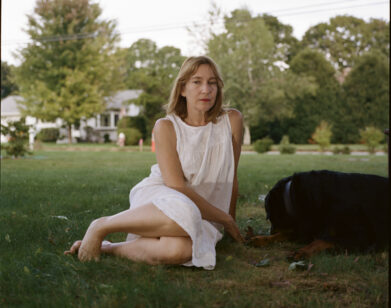
Sheila Heti Was Wasting Her Time. Then She’d Written a Book.

Bennett Sims on Style, Sebald, and His New Short Story Collection

Photographer Gregory Crewdson on Blue Velvet and the Berkshires

Sloane Crosley on Cult Classic and Confronting Exes

Join Discovery, the new community for book lovers
Trust book recommendations from real people, not robots 🤓
Blog – Posted on Tuesday, Sep 24
Get paid to read: 18 legitimate sites that pay reviewers.

Serious question: do you want to get paid to read? You might laugh it off at first, thinking that that sounds too good to be true, but it’s not. You can get paid for spending time on what you love: reading books.
Of course, the key to this #hack is book reviewing, where you offer your personal opinion of a book after you’re done with it. (If you’d like to learn more, check out this post to discover how to write a book review .) Because books are constantly being published, book reviewers are generally always in demand.
So whether you’re a voracious reader of nonfiction, genre fiction, classics, or indie books, there’s probably an outlet that’s willing to compensate you if you read (review) for them! Without further ado, here’s a definitive list of the 17 sites that will help you get paid to read. If you want to cut to the chase and find out which of them is the right fit for you, we recommend first taking this quick quiz:
Which review community should you join?
Find out which review community is best for your style. Takes 30 seconds!
Then read on for the full list of all of the ways to get paid while reading!
1. Kirkus Media
💸 Pay: Freelance basis
👀 More information: Check here
If you’ve ever lingered on a book’s Amazon page before, you’ll have heard of Kirkus Reviews. It’s one of the most respected sources of book reviews out there, publishing many of the blurbs that you’ll see on Amazon, or on the cover of your favorite titles.
You have to wonder: where do all of these reviews come from? That’s where you come into the picture. Kirkus Media lists an open application for book reviewers. As of right now, they’re specifically searching for people who will review English and Spanish-language indie titles. Some of the qualities that they want in reviewers include: experience, a keen eye, and an ability to write about a 350-word review in two weeks’ time.
To apply, simply send your resume and writing samples! You can find out more about this opportunity here .
2. Reedsy Discovery
💸 Pay: Tip basis
A powerhouse in the world of indie books, Reedsy Discovery gives book reviewers the chance to read the latest self-published books before anyone else. You can browse through hundreds of new stories before picking one that piques your interest. And if you’ve built up a brand as a book reviewer on Reedsy Discovery, you can liaise with authors who contact you directly for a review.
Its application process is pretty simple: just complete this form to be selected as a book reviewer. Once you’re accepted, you can start looking through the shelves and reading immediately. One more thing: book reviewers can get tips for their book reviews. Readers can send $1, $3, or $5 as a token of appreciation (which, let’s be honest, all book reviewers deserve more of).
If this system intrigues you, you can “discover” more about how it works on this page .
3. Any Subject Books
Any Subject Books is a full-suite self-publishing service. More importantly for you, it hires book reviewers on a book-by-book basis to help them review new books.
They’re big on in-depth, honest, and objective reviews. No fluff here! They’re also happy to give you books in your preferred genres, so if you’re a voracious reader of war fiction, you won’t typically be asked to read the latest paranormal romance hit (or vice versa).
Sadly, Any Subject Books is not currently open to book reviewer applications, but check back again — this could change at any time.
4. BookBrowse
BookBrowse reviews both adult fiction and nonfiction, and some books for young adults. The site focuses on books that are not only enjoyable to read, with great characters and storylines, but that also leave the reader knowing something about the world they did not before. Reviewers also write a "beyond the book" article for each book they review.
5. Online Book Club
💸 Pay: $5 to $60
Online Book Club’s FAQ begins with a warning for all aspiring book reviewers: “First of all, this is not some crazy online get-rich-quick scheme. You won't get rich and you won't be able to leave your day job.”
That daunting reminder aside, Online Book Club’s setup is pretty reasonable, not to mention straightforward. You’ll get a free copy of the book and you’ll get paid for your review of that book. Moreover, it’s one of the few sites that’s transparent about their payment rates (anywhere between $5 to $60). To begin the sign-up process, simply submit your email here .
6. U.S. Review of Books
U.S. Review of Books is a nation-wide organization that reviews books of all kinds and publishes those reviews in a popular monthly newsletter. The way that it works for a book reviewer is simple: when a book title is posted, reviewers can request to read it and get assigned.
A typical review for U.S. Review of Books is anywhere between 250 and 300 words. They are looking particularly for informed opinions and professionalism in reviews, along with succinctness. To apply, submit a resume, sample work, and two professional references via email. But we’d recommend that you check out some previous examples of their book reviews here to first get a better sense of what they’re looking for.
7. Women’s Review of Books
💸 Pay: $100 per review
Women’s Review of Books is a long-running, highly-respected print publication that’s a part of Wellesley Centers for Women. This feminist magazine has been published for 36 years and is looking for more book reviewers to join their force.
If you plan on writing reviews for Women’s Review of Books , you should be aware that its reviews are published “in the service of action and consciousness.” Most of its writers are also academics, journalists, or book reviewers with some years of experience behind them. If you meet these qualifications and are accepted, you’ll be compensated $100 per review.
To pitch then a review, send them an email with a quick proposal. For more details, click here .
8. eBookFairs
eBookFairs primarily helps authors grow their author platforms, but it also has a Paid Book Reader program where readers can earn money by, you guessed it, reviewing the books listed on their site.
Note that they do have clear instructions on what qualifies as a review, so do read their guidelines carefully before applying to make sure you can meet them. For instance, the review must be at least 250 words, you must allow at least 3 days between reviews submitted, and it must provide helpful feedback for the author. There are also a limited number of paid reader positions available.
💸 Pay: Variable
If you’re a freelancer, you’re probably already familiar with Upwork! One of the biggest marketplaces for freelancers, Upwork has fingers in every industry’s pie. So it won’t be a surprise to learn that people who are looking for freelance book reviewers regularly post listings on its marketplace.
Because each job caters to an individual client, the requirements and qualifications will differ. It might be a one-time project, or the gig might turn into a long-running collaboration with the client. Generally, the listing will specify the book’s genre, so you’ll know what you’re getting before you agree to collaborate with the client on the other end.
To begin, you’ll need to sign up as a freelancer on Upwork. Find out more information on Upwork’s FAQ page!
10. Moody Press
💸 Pay: Free ARCs
Moody Press is a nonprofit publishing house of Christian titles and Bible study resources. If this is your niche, you’ll definitely be interested in Moody Press’ Blogger Review Program! As part of the program, you’ll get free copies of book published by Moody Press.
Like some of the other programs on this list, you won’t get paid for your review, but you will get a free book. Moody Press also asks you to write your honest review within 60 days of reading it. To get a feel for it, try joining the MP Newsroom Bloggers Facebook group , where you can directly interact with existing members of the program.
11. New Pages
💸 Pay: Variable
Not interested in writing anything longer than 300 words? Are quick flash book reviews more your pace? If so, becoming a NewPages reviewer might be just your speed. NewPages.com is an Internet portal to small presses, independent publishers and bookstores, and literary magazines. More importantly, they’re looking for short book reviews (generally between 100 and 200 words) on any recent literary magazine or book that you’ve read.
If you’re already a fan of books from small presses or unknown magazines, even better: that’s exactly the kind of reviewer NewPages wants to work with. If you’d like to look through some of their past book reviews to see if your style matches, check out their book review archive here .
12. Publishers Weekly
Publishers Weekly is an online magazine focused on international book publishing and all that that entails. More pertinently, it regularly reviews both traditionally published and self-published books, which means that it does occasionally have a call for book reviewers. As of right now, it’s closed to applications — but if you check its Jobs page every once in a while, you might see an opening again.
13. Tyndale Blog Network
Tyndale Blog Network runs a program called My Reader Rewards Club, which is based on an innovative rewards system. If you join as a member, you can earn points for certain actions that you take on the site (for instance, inviting a friend to the program and sharing a direct link to MyReaderRewardsClub.com on Facebook each fetches you 10 points).
Writing a review for a Tyndale or NavPress book on Amazon or Barnes & Noble gets you 10 points, with a maximum limit of 50 points in 30 days. In turn, you can use your accumulated points to receive more books off of Tyndale’s shelves. If this sounds like something that may be up your alley, check out their FAQ here.
14. Booklist Publications
💸 Pay: $12.50 to $15 per review
Booklist is the American Library Association’s highly respected review journal for librarians. Luckily for freelance writers, Booklist assigns freelance book reviews that vary from blog posts for The Booklist Reader to published book review in Booklist magazine.
As the site itself suggests, it’s important that you’re familiar with Booklist Publication’s outlets (which include Booklist magazine, the quarterly Book Links , and The Booklist Reader blog) and its writing style. Reviews are generally very short (no longer than 175 words) and professionally written. You can discover more of its guidelines here — and an archive of previous Booklist reviews here .
To apply, contact a relevant Booklist editor and be prepared to submit a few of your past writing samples.
15. Instaread
💸 Pay: $100 per summary
Not interested in writing critical takes on the books that you read? Then Instaread might be for you. Instaread has an open call for book summaries, which recap “the key insights of new and classic nonfiction.”
Each summary should be around 1000 to 1500 words, which makes it a fair bit lengthier than your average flash book review. However, Instaread will compensate you heartily for it: as of 2019, Instaread pays $100 for each summary that you write. You can peruse Instaread’s recommended Style Guide on this page , or download Instaread from your App Store to get a better feel for the app.
16. NetGalley
If you’ve dreamt about becoming an influencer in the book reviewing community, you may want to give NetGalley a look. Put simply, NetGalley is a service that connects book reviewers to publishers and authors. Librarians, bloggers, booksellers, media professionals, and educators can all sign up to NetGalley to read books before they’re published.
How it works is pretty simple. Publishers put digital review copies out on NetGalley for perusal, where NetGalley’s members can request to read, review, and recommend them. It’s a win-win for both publisher and reviewer: the publisher is able to find enthusiastic readers to provide an honest review for their books, and the reviewer gets access to a vast catalog of books.
The cherry on top is that NetGalley membership is 100% free! Simply use this form to sign up. And if you’d like more information, you can dip into their FAQ here .
17. getAbstract
Are you an avid reader of nonfiction books? getAbstract is a site that summarizes 18,000+ nonfiction books into 10-minute bites. Their Career Opportunities page often includes listings for writers. At the time of this post’s writing, getAbstract is looking for science and technology writers who can sum up the latest magazine articles and books. They pay on a freelance basis, so apply through their website to get further details.
18. Writerful Books
💸 Pay: $10 to $50
Writerful Books is an author services company that provides everything from beta reading to (you guessed it) book reviewing. As such, they’re always on the lookout for book reviewers with fresh and compelling voices.
One of the benefits of this gig is that you can review any book that you want for them (although they prefer contemporary award-winning American, Australian, British, Canadian, Irish, and New Zealand authors). Getting a regularly paid gig with Writerful Books isn’t a guarantee, but if you regularly publish quality reviews for them, they may contact you.
To apply, you’ll have to be able to provide previous book review samples. Here’s the job listing if you’re curious to learn more about this role.
If you're an avid reader, sign up to Reedsy Discovery for access to the freshest new reads — or apply as a reviewer to give us your hot takes!
Continue reading
More posts from across the blog.
Zlibrary: 20 Alternatives to Borrow Ebooks in 2024
Wondering where to find the best digital libraries? Look no further. We’ve compiled a list of 20 legitimate alternatives to Zlibrary, where you can borrow and find ebooks for free.
The 34 Best Thanksgiving Books to Read with Kids Over the Holidays
Thanksgiving might play second fiddle to Christmas when it comes to seasonal music and festive decor, but it’s one of our favorite holidays. Whether you’re chowing d...
The 15 Best John Steinbeck Books Everyone Should Read
John Steinbeck’s books possess that ever-elusive quality of timelessness. Ecologically conscious before the urgency of climate change was widely discussed, but tender in its understanding of humankind’s many shortcomings, this literary giant’s work feels breathtakingly current...
Heard about Reedsy Discovery?
Trust real people, not robots, to give you book recommendations.
Or sign up with an
Or sign up with your social account
- Submit your book
- Reviewer directory
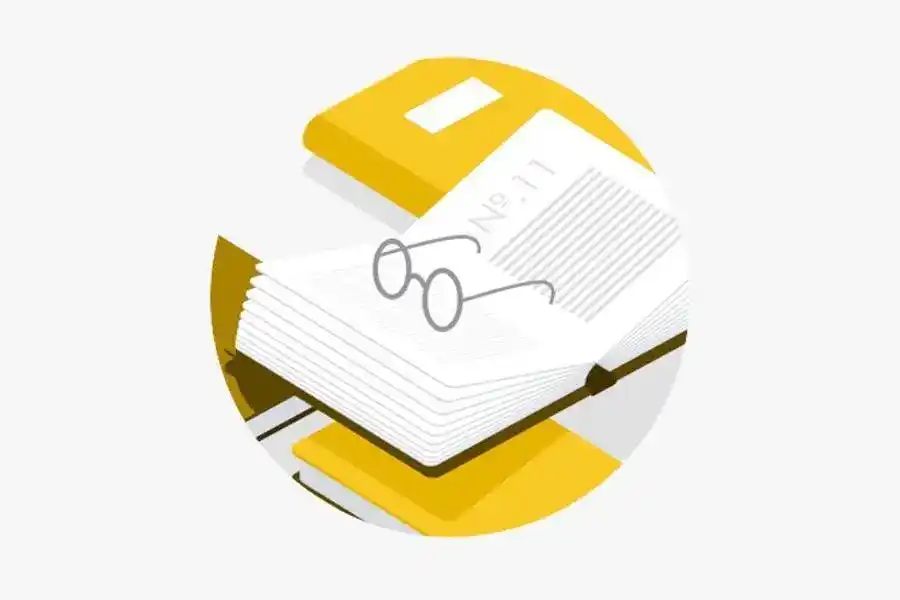
Want to be a book reviewer?
Review new books and start building your portfolio.
Things you buy through our links may earn Vox Media a commission.
The Best Books of 2024 (So Far)
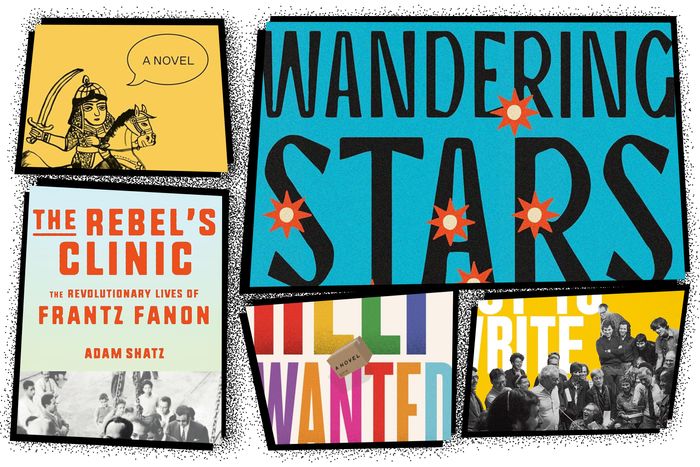
The year may still be young, but 2024 has already brought a treasure trove of surprising new books. Multiple celebrated first-time authors have returned with highly anticipated, ambitious follow-up novels . Memoir and reportage are skillfully blended together for a collection of essays on the climate crises. A former Village Voice journalist delivers a vibrant oral history of the beloved alternative weekly. And we’d be remiss not to mention a brilliant debut novel that deftly brings humanity and humor to existential dread. Here are the titles that we already can’t stop thinking about.
Titles are listed by U.S. release date.
Headshot , by Rita Bullwinkel
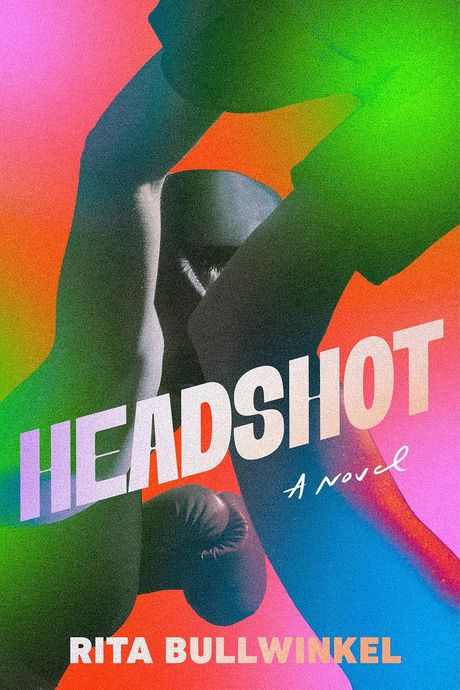
In a shabby gym in Reno, Nevada, teenage girls face off in a youth boxing tournament under a shifting ray of daylight that “fills the whole space with a dull, dusty brightness” and surrounded by a sparse crowd of mostly uninterested coaches and parents. The novel enters deep into the girls’ minds as they assess one another’s weaknesses and coax themselves through the rounds, which are described in brutal, bloody detail. Each fighter has her own source of competitive energy, but they’re all realistically ambivalent, too — unsure about why, exactly, they’re drawn to a sport that gives them so little for their trouble. Rita Bullwinkel’s debut novel is as tense and disciplined as its characters, and she has a gift for capturing the way their minds wander far from the ring and back again: One girl counts off the digits of pi, while another obsesses over a death she witnessed as a lifeguard. There’s a mesmerizing sense of limitlessness to the narrative, which roams far into the future of these fighters even as they’re absorbing hits in the ring. — Emma Alpern
Lessons for Survival , by Emily Raboteau
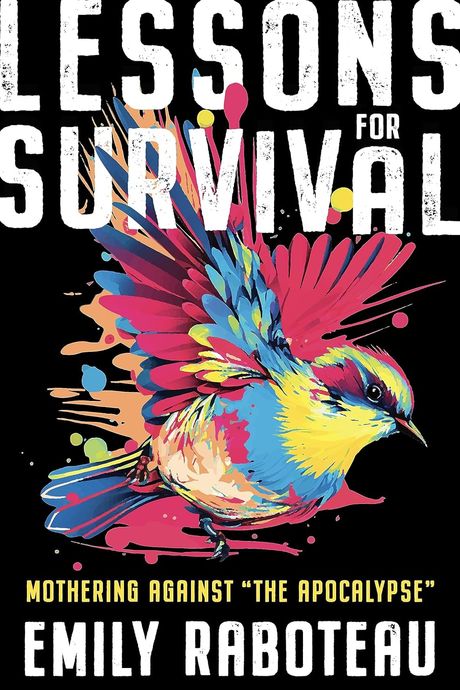
Raboteau emerged on the scene some two decades ago as a writer of sharp, incisive fiction that mapped the contours of identity and race. In recent years, she has become a literary voice of consciousness about the ongoing climate crisis. Across a series of essays, book reviews, and conversations, Raboteau has charted the progression of the crisis, our shared culpability, and our responsibility to develop practical solutions. Lessons for Survival is, in many ways, a culmination and continuation of this work. Raboteau travels locally and abroad to capture stories about the impact of the environmental crisis, and the resilience of communities that find themselves on the front lines. She also writes authentically — her prose seamlessly melds slang and heightened language — about her own experiences as a Black mother, whose identity has shaped her understanding of these issues. This is scintillating work, an essential primer for our times. — Tope Folarin
Help Wanted , by Adelle Waldman
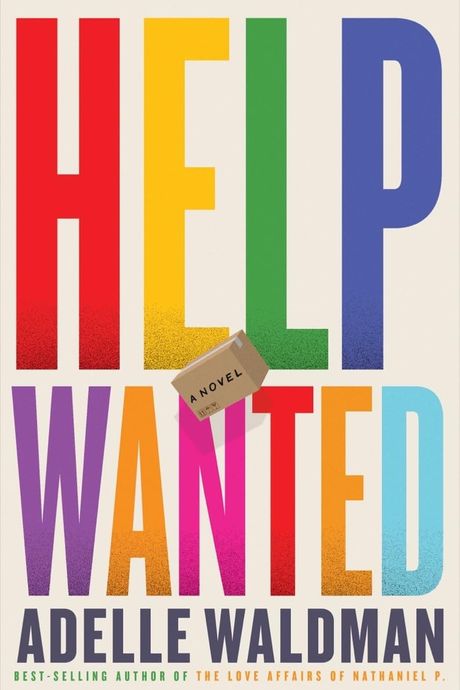
Set at a big-box store in upstate New York, Help Wanted recalls Mike White’s Enlightene d in its textured portrayal of how small humiliations and injustices at work inevitably boil over into righteous rage. It’s a novel that lingers in the imagination, by which I mean, after you read it you’ll think of it every time you shop at Target, forever. — Emily Gould
➽ Read Emily Gould’s interview with Help Wanted author Adelle Waldman on The Cut .
Stranger , by Emily Hunt
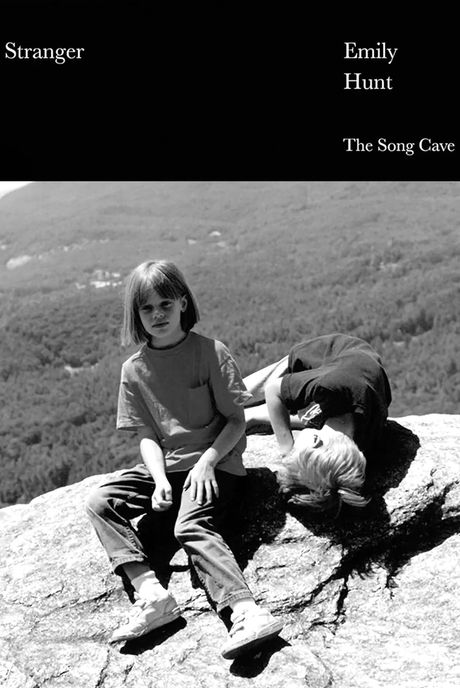
Emily Hunt’s second book of poems considers real intimacy mediated by apps. In “Company,” a long poem originally published as a chapbook, the speaker works for a flower delivery startup, gently pulling roots from soil, culling, clipping, and handing off arrangements. These moments are sensorily rich, slotted into 15-minute assembly-line shifts, and short lines. In “Emily,” Hunt uses messages from Tinder as her source material, not to mock (or not only to mock) the senders or the stilted situation of meeting online, but to construct a self in relief, as seen and spoken to by strangers. A funny and surprising interaction with dailiness, including our phones — the hardware and the relationships maintained through them — and whatever else is still tactile. — Maddie Crum
Dead Weight: Essays on Hunger and Harm, by Emmeline Clein
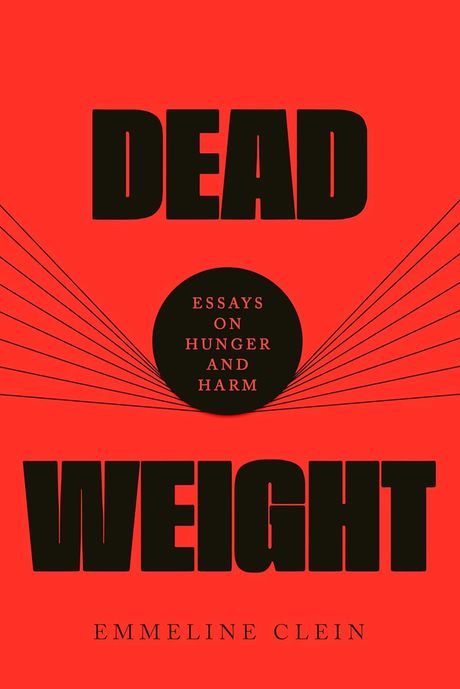
Emmeline Clein’s Dead Weight seems destined to fundamentally reshape how we think and write about the subject of eating disorders. What separates Clein’s book from others on the topic is her commitment to treating the sufferers of eating disorders with the kind of dignity that clinicians tend to withhold. She writes as an insider, telling both her personal story and sharing the stories of her “sisters,” which range from Tumblr accounts to clinical studies co-authored by their subjects. Throughout, she refrains from including the graphic details that have historically plagued books about the subject. “Too many people I love have misread a memoir as a manual,” she writes. The book she writes instead confronts the complicated entanglement between eating disorders, race, capitalism, and the ongoing erosion of social safety nets. Stereotypes about eating disorders commonly portray the illness as one rooted in control. Dead Weight not only exposes how little control patients have had over their own narratives and bodies, it returns the narrative to those who have suffered from the disease. This is a moving, brilliant, and important book. — Isle McElroy
The Freaks Came Out to Write , by Tricia Romano
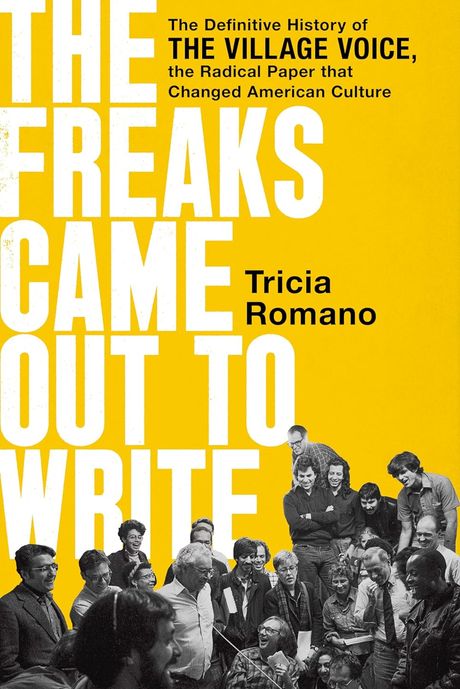
If you were reading The Village Voice in the 1990s, as I was, it wasn’t as good as it used to be. That was also true ten years later, and 20 years before, and frankly it was probably what people started saying upon reading issue No. 2 in 1955. What the Voice was, inarguably, was shaggy, sometimes under-edited, alternately vigorous and undisciplined and brilliant and exhausting and fun. The infighting in its pages and in its newsroom was relentless, amped up by the very aggressiveness that made its reporters and editors able to do what they did. You’ll encounter more than one office fistfight in The Freaks Came Out to Write , this oral history by Tricia Romano, who worked there at the very end of its life. She got a huge number of Voice survivors to talk, including almost every living person who played a major role in this beloved, irritating paper’s life, and good archival interviews fill in the gaps. If you read the Voice in its glory days (whenever those were!) you’ll miss it terribly by the end of this book; if you weren’t there, you will be amazed that such a thing not only existed but, for a while, flourished. — Christopher Bonanos
Wandering Stars , by Tommy Orange
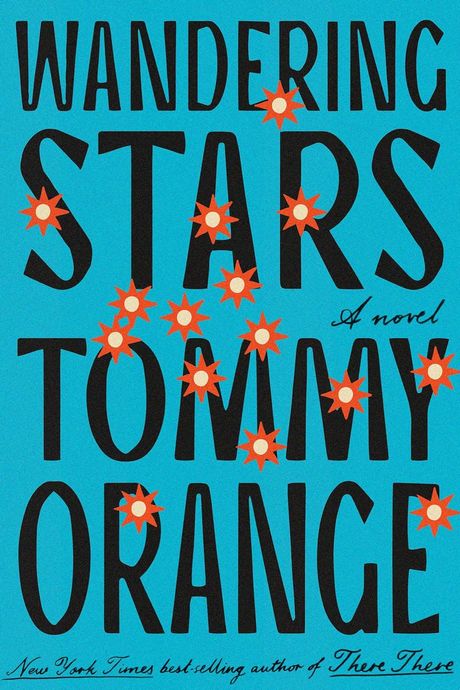
Orange’s Pulitzer-finalist debut, 2018’s There There , is a tightly constructed, polyphonic book that ends with a gunshot at a powwow. His follow-up, which shares the first one’s perspective-hopping structure (and several of its characters), is a different beast, an introspective novel about addiction and adolescence. The story begins in the 1860s, when a young Cheyenne man becomes an early subject in the U.S. government’s attempts to assimilate Native Americans. The consequences of this flurry of violence and imprisonment will reverberate through generations of his family, eventually landing in present-day Oakland, California, where three young brothers live with their grandmother and her sister. The oldest brother, Orvil, was shot at There There ’s powwow, and even though he survived, the heaviness of that day is weighing on him and his family. Prescribed opioids for the pain, he finds that — like several of his ancestors, though he has no way of knowing that — he likes the sense of removal they give him. Orange’s novel is unusually curious and gentle in its treatment of addiction; he lets his characters puzzle out why they’re drawn to intoxication, managing to balance a lack of judgment with an understanding of the danger they’re in. — E.A.
➽ Read Emma Alpern’s full review of Wandering Stars .
Come and Get It , by Kiley Reid
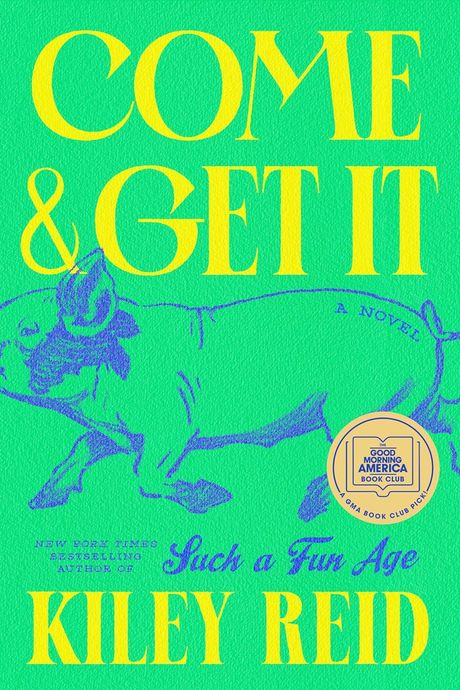
In Come and Get It , the second novel from the breakout author of Such a Fun Age , the University of Arkansas serves as the backdrop for Kylie Reid’s assessment of race, class, and social hierarchy on a college campus. Over the course of a semester that shifts between the perspectives of Millie, a meek yet dutiful R.A., Kennedy, a shy transfer student with a traumatic secret, and Agatha, a visiting professor out of her depths, the primary characters are forced to grapple with the heady concepts of desire, privilege, and the rules of social conduct in an environment where the the game is rigged and fairness is reserved for a select few. Light on plot and heavy on character development and social commentary, Come and Get It is the kind of book you put down and immediately want to discuss . But fair warning: If you ever lived in a college dorm in the U.S., this book might inflict a non-negligible amount of PTSD. — Anusha Praturu
Martyr! , by Kaveh Akbar
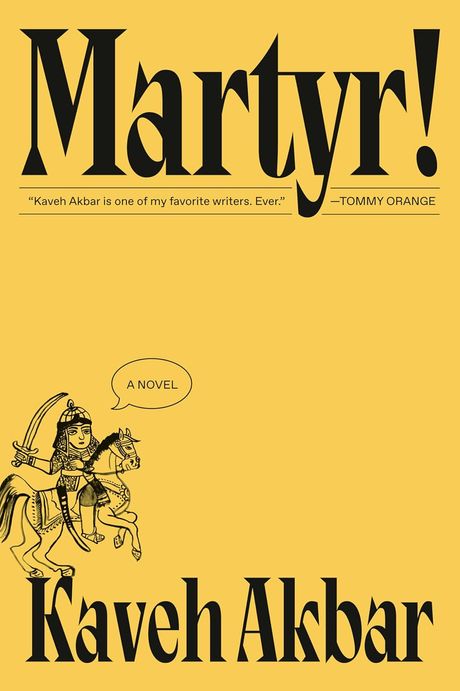
In Poet Kaveh Akbar’s debut novel, Cyrus Shams is a nexus of dissonant identities: He’s a 20-something Iranian-American, a straight-passing queer, a recovering addict, a depressive insomniac, and a writer who’s recently gotten some unflattering feedback. He’s also grieving his parents, who he considers to have died meaninglessly, his mother on a passenger flight out of Tehran that was accidentally shot down by the U.S. military (a real event that occurred in 1988), his father “anonymous[ly] after spending decades cleaning chicken shit on some corporate farm.” Martyr! traces Cyrus’s obsession with the idea of dying with a purpose, disrupting linear time and moving miraculously between worlds and perspectives. Sometimes, the dead speak for themselves; we hear from Cyrus’s mother and his uncle, who recounts his life as a soldier in the Iran-Iraq war. The book also shines with humor, including an imagined conversation between Cyrus’s mother and Lisa Simpson. Akbar’s prose courses with lyrical intelligence and offers an interrogation of whose pain matters — and what it means to live and die meaningfully — that is as politically urgent as it is deeply alive. — Jasmine Vojdani
The Rebel’s Clinic , by Adam Shatz
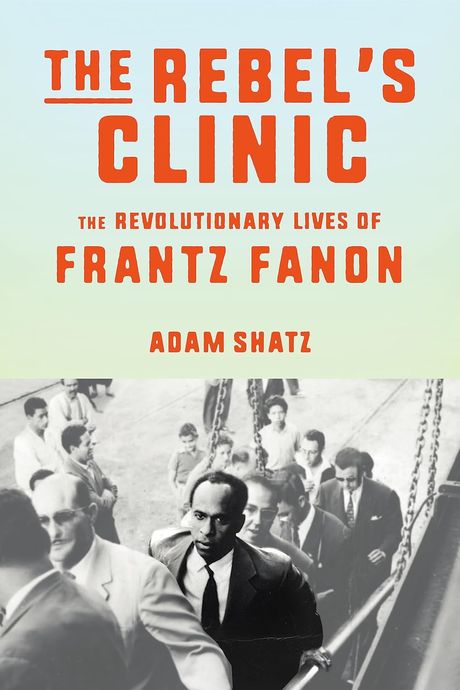
In these chaotic times, Franz Fanon’s work is constantly and enthusiastically referenced. A new generation of activists — as many before them — has repurposed Fanon’s words to describe our current travails, and to propose how we might move forward. Fanon persists in the activist imagination as a kind of radical soothsayer, an intellectual who can speak authoritatively about our moment because of his identity as a Black man and colonial subject who personally experienced the barbarity of a colonizing power. In The Rebel’s Clinic , Adam Shatz complicates our understanding of Fanon’s life and work, and persuasively conjures the human being who wrote the words that have inspired so many. Among Shatz’s most important interventions is to highlight Fanon’s vocation as a doctor who “treated the torturers by day and the tortured at night.” Shatz’s book is a chronicle of a man who, because of his identity and gifts, was obliged to constantly reconcile opposing ideas and ways of being. — T.F.
- best of 2024
- vulture lists
- tommy orange
- wandering stars
- help wanted
- adelle waldman
- the freaks came out to write
Most Viewed Stories
- Cinematrix No. 34: April 11, 2024
- Fallout Series-Premiere Recap: Orange Colored Sky
- Mark Knopfler on the Most Patient and Wistful Music of His Career
- Jeopardy! Winner Victoria Groce Endorses the Rock Band Method
- Hollywood Is Doomed If There’s No Room for Megalopolis es
- Vanderpump Rules Recap: Joseph and the Amazing Technicolor Breakup
- Shōgun Recap: A Funeral in Edo
Editor’s Picks
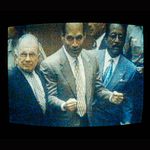
Most Popular
What is your email.
This email will be used to sign into all New York sites. By submitting your email, you agree to our Terms and Privacy Policy and to receive email correspondence from us.
Sign In To Continue Reading
Create your free account.
Password must be at least 8 characters and contain:
- Lower case letters (a-z)
- Upper case letters (A-Z)
- Numbers (0-9)
- Special Characters (!@#$%^&*)
As part of your account, you’ll receive occasional updates and offers from New York , which you can opt out of anytime.

IMAGES
VIDEO
COMMENTS
It is a fantasy, but the book draws inspiration from the Second Sino-Japanese War and the Rape of Nanking. Crime Fiction Lover reviews Jessica Barry's Freefall, a crime novel: In some crime novels, the wrongdoing hits you between the eyes from page one. With others it's a more subtle process, and that's OK too.
The word "best" is always a misnomer, but these are my personal favorite book reviews of 2020. Nate Marshall on Barack Obama's A Promised Land (Chicago Tribune) A book review rarely leads to a segment on The 11th Hour with Brian Williams, but that's what happened to Nate Marshall last month. I love how he combines a traditional review ...
How to Write a Book Review: Consider a Book's Promise. A book makes a promise with its cover, blurb, and first pages. It begins to set expectations the minute a reader views the thumbnail or cover. Those things indicate the genre, tone, and likely the major themes. If a book cover includes a lip-locked couple in flowing linen on a beach, and ...
Traditionally, book reviews are evaluations of a recently published book in any genre. Usually, around the 500 to 700-word mark, they briefly describe a text's main elements while appraising the work's strengths and weaknesses. Published book reviews can appear in newspapers, magazines, and academic journals.
Eudora Welty. On E.B. White's "Charlotte's Web". Eudora Welty's review of this timeless tale is a sheer delight, starting from its headline ("Life in the Barn Was Very Good") and its ...
How to write a book review. Note down the key points- This is an important step before writing a book review. Jot down your analysis about the characters, themes, plot, and your personal view. Also, note down the book title, author's name, and any relevant information about the book. Start with a strong introduction- Mention the author's ...
Sheila Liming on Edith Wharton's Ghosts (Cleveland Review of Books) Every editor's dream assignment is a critic with deep subject matter expertise, and you can't beat Liming—author of What A Library Means to A Woman: Edith Wharton and the Will to Collect Books —writing about Wharton's ghost stories. "Here are 'fetches ...
Step 1: Planning Your Book Review - The Art of Getting Started. You've decided to take the plunge and share your thoughts on a book that has captivated (or perhaps disappointed) you. Before you start book reviewing, let's take a step back and plan your approach.
Book Review Template. The book review format includes an introduction, body, and conclusion. Introduction. Describe the book cover and title. Include any subtitles at this stage. Include the Author's Name. Thesis. Write a brief description of the novel. Briefly introduce the main points of the body in your book review.
Provide brief descriptions of the setting, the point of view (who tells the story), the main character (s) and other major characters. If there is a distinct mood or tone, mention that as well, for example gloom and doom, joyful, calm, tense, mysterious, etc. Give a short, objective plot summary. Provide the major events and the book's climax ...
Here are some essential tips for writing a top-notch book review: Capture Emotions: Express how the book made you feel. Readers connect with genuine emotional responses. Highlight Unique Aspects: Bring attention to distinctive elements—be it writing style, character depth, or unusual plot twists.
The first step is to plan and create an outline that includes all the points that you will have to cover in the review. Don't forget to include all the information about the characters, plot information, and some other parts of the chosen book. The three parts of a book review are: 1. Provide a Summary.
The power in these stories rests in their veracity, vitality and vulnerability.". -Michelle Filgate ( The Washington Post) 6. The Dangers of Smoking in Bed by Mariana Enriquez. (Hogarth) 15 Rave 2 Positive. Read a story from The Dangers of Smoking in Bed here.
Book Review Template. Here is a good book review example for 4th-grade students: "Charlotte's Web" by E.B. White — A Heartwarming Tale of Friendship. "Charlotte's Web" by E.B. White is a heartwarming tale of friendship that takes us to Zuckerman's farm, where a special pig named Wilbur forms an unlikely bond with Charlotte, a clever ...
Blog - Posted on Thursday, Nov 11 The Only Book Review Templates You'll Ever Need Whether you're trying to become a book reviewer, writing a book report for school, or analyzing a book, it's nice to follow a book review template to make sure that your thoughts are clearly presented.. A quality template provides guidance to keep your mind sharp and your thoughts organized so that you can ...
The Mapping the World 8-book set goes into amazing levels of detail. It is a long read, but it gives an immense range and amount of information that you would not find in any other book or series on maps. The flowing way the chapters and books are organized makes it easy to link passages from different books in this series together.
3 min read. ·. Feb 10, 2024. --. Short Book Review of Any Book in English! In today's fast-paced society, navigating the demands of work while indulging in comprehensive book reviews poses a ...
Reviews for a General Audience. Literature and popular works (memoirs, travel writing, manuals, etc.) are often reviewed by journalists or fellow authors upon publication in newspapers or magazines. Use the following databases to find reviews in these publications. Book Review Index.
To write a review of a book and grab the audience's attention, you will have to add the important points listed below. Topic or hook. Essential book information. Basic summary. Praise and critique. Recommendation. Ratings. While writing a book review, keep in mind that the added information must be your own. It must be your personal opinion ...
As a longtime fan of Nicholls' writing, I had huge expectations for this book and it absolutely delivered. Michael and Marnie are two lonely people who meet on a coast-to-coast hike. Both come ...
Book reviews: Guidance for authors Book reviews in English Today. English Today provides cutting-edge reports on the style, usage, and development of British, American, and the world's many varieties of English. To that end, the journal strives to publish reviews of new and thought-provoking books and media resources that engage with important trends and developments in the English language.
Stephen King, who has dominated horror fiction for decades, published his first novel, "Carrie," in 1974.Margaret Atwood explains the book's enduring appeal.. The actress Rebel Wilson, known ...
The book opens with the approach of a British agent to a midlevel IRA man named Frank Hegarty on a cold Derry lane in 1980. With such scenes, "Four Shots" conjures the period's atmosphere of ...
The 10 Best Books of 2023 This copy is for your personal, non-commercial use only. Distribution and use of this material are governed by our Subscriber Agreement and by copyright law.
This book might come as a surprise for non-specialists, since black Africans are identified with slave trade to the Americas, while the Renaissance is regarded as a purely European phenomenon, centred on a largely homogeneous ethnicity. ... a lack of reason, violence, and ugliness (English is the only language in which the same term, fair, is ...
Anyone who works for a big corporation has had to endure days filled with back-to-back meetings. Bits of time between Zoom calls or conference-room stints must be used to stay on top of email or ...
OYLER: No. When I write book reviews, I try to read the book as generously as I can and really engage with it. I also have a background in journalism, so I'm somewhat neurotic about getting things right. Some critics do not care so much about that, and that's perfectly fine. But I fact-check my book reviews.
3. Any Subject Books. 💸 Pay: Freelance basis. 👀 More information: Check here. Any Subject Books is a full-suite self-publishing service. More importantly for you, it hires book reviewers on a book-by-book basis to help them review new books. They're big on in-depth, honest, and objective reviews. No fluff here!
Emily Hunt's second book of poems considers real intimacy mediated by apps. In "Company," a long poem originally published as a chapbook, the speaker works for a flower delivery startup ...